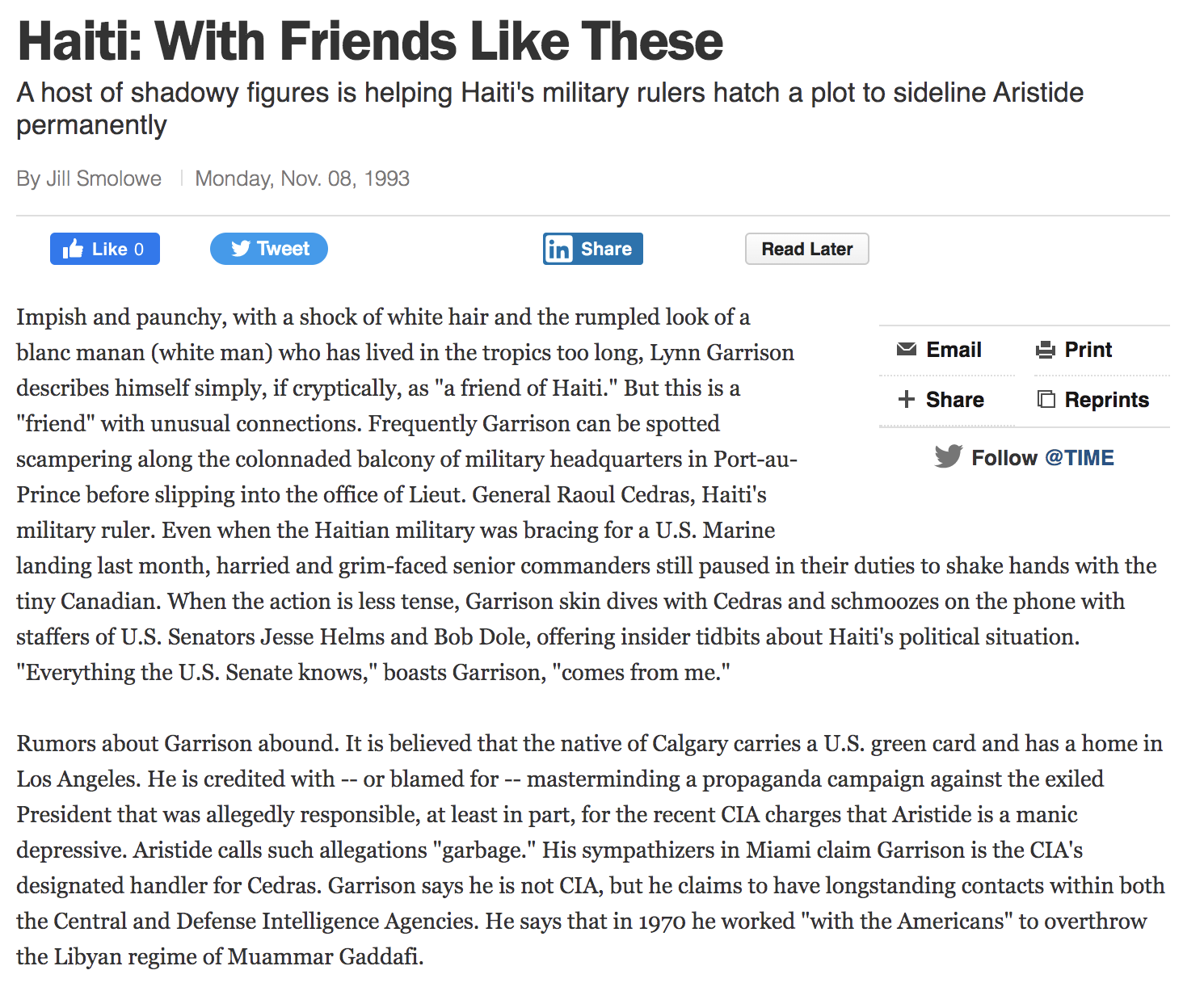"They Fooled Us"
Seven months after the assassination of Haiti's president, the true masterminds remain unknown. But a failed "coup" plot that preceded it provides new information about those involved — and what the US and Haitian governments may have known ahead of time.
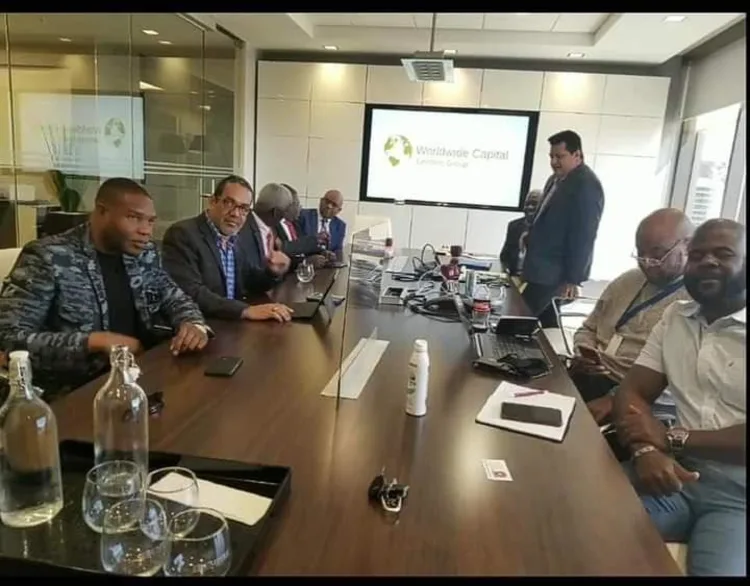
You can't kill the truth.You can't kill justice.
Even to many of those implicated in the assassination of Haiti's president and the attempted "coup" months earlier, nothing is as it seems. Meanwhile, the entire saga is connected to a still unsolved assassination 20 years earlier.
We may never know everyone responsible for the killing of Jovenel Moïse, but it is a legacy of foreign intervention and impunity that allowed it to happen in the first place.
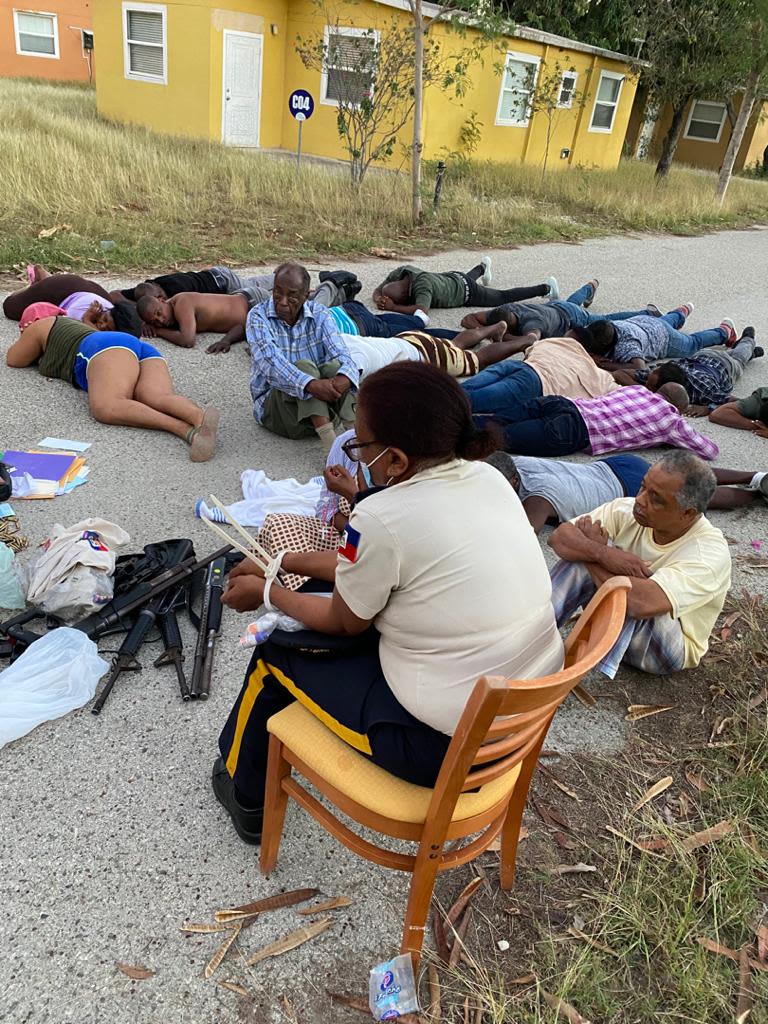
Individuals arrested at Petit Bois. In the chair, with plastic hand ties is police inspector Marie Louise Gauthier.
Individuals arrested at Petit Bois. In the chair, with plastic hand ties is police inspector Marie Louise Gauthier.
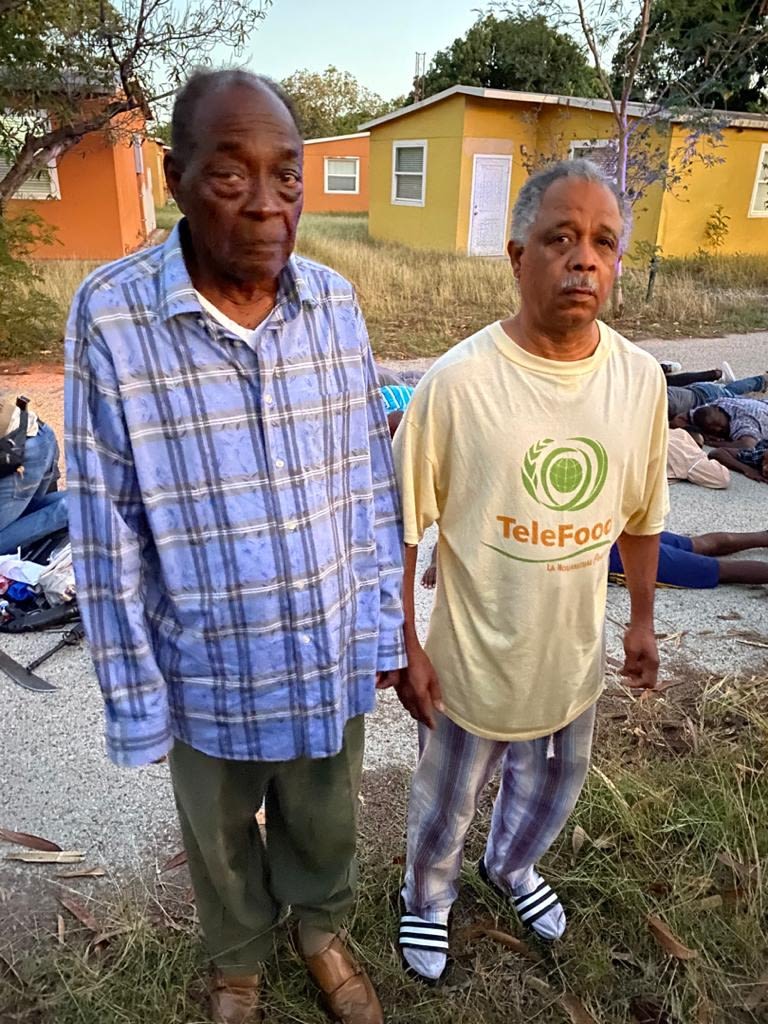
Two individuals arrested at the Petit Bois apartment complex on February 7, 2021. On the right, agronomist Louis Buteau.
Two individuals arrested at the Petit Bois apartment complex on February 7, 2021. On the right, agronomist Louis Buteau.
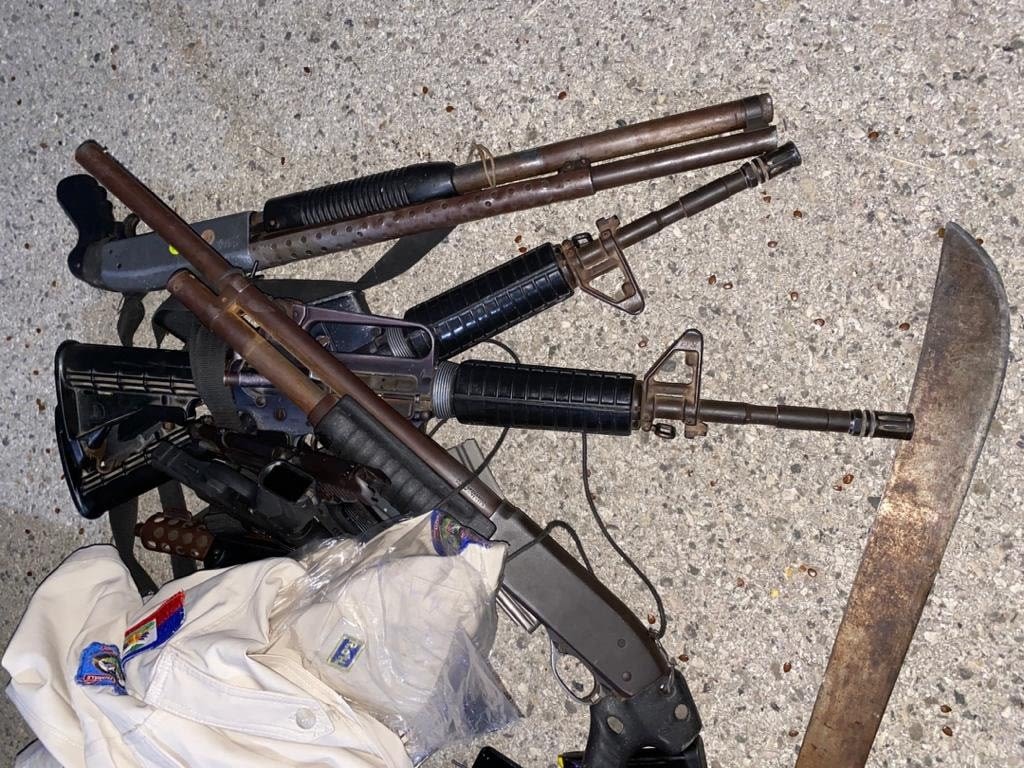
Items seized at the Petit Bois apartment complex during the February 7, 2021 raid.
Items seized at the Petit Bois apartment complex during the February 7, 2021 raid.
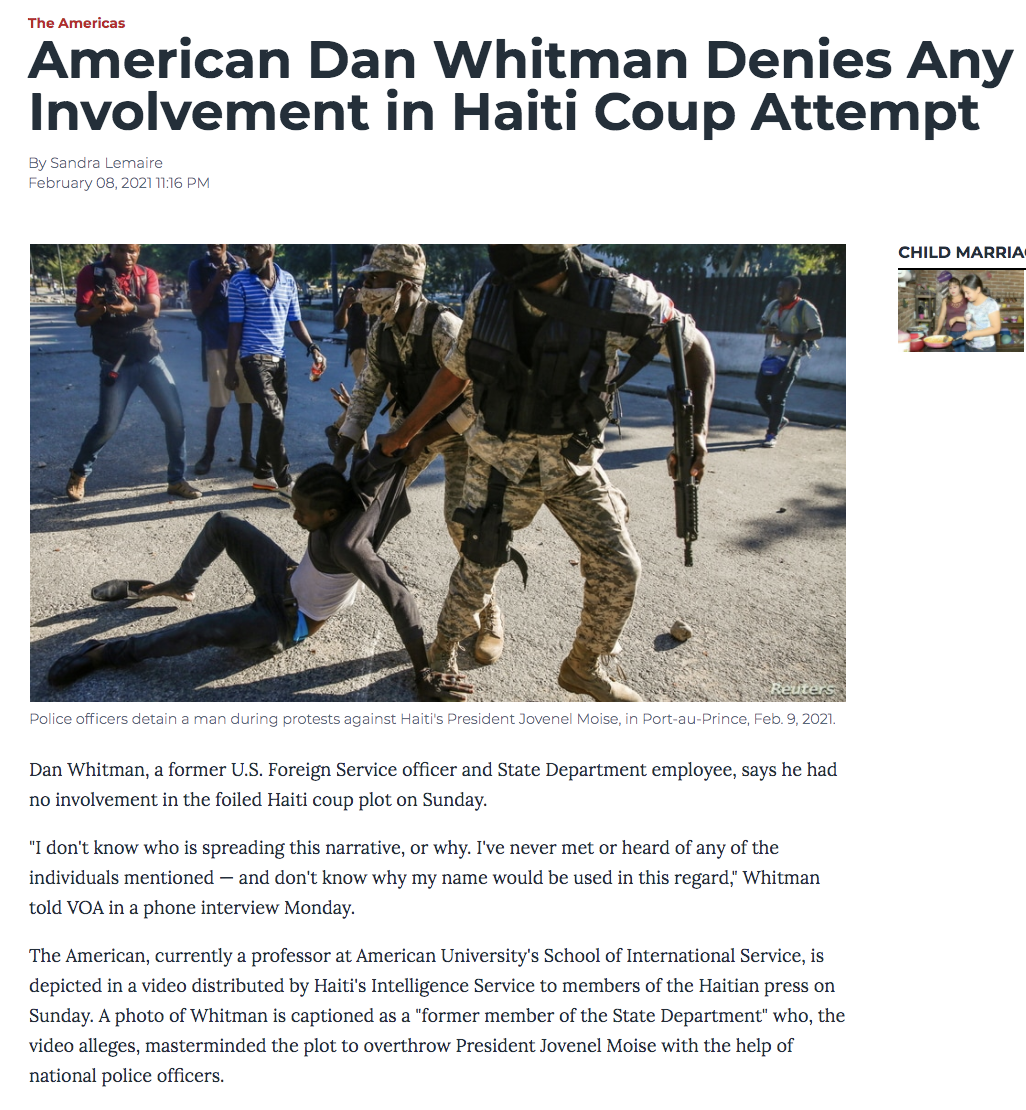
Voice of America article from February 8, 2021 with Whitman's denial of involvement. Haitian state security released a video alleging Whitman was the ringleader of the Petit Bois plan. The article has since been removed from VOA's website.
Voice of America article from February 8, 2021 with Whitman's denial of involvement. Haitian state security released a video alleging Whitman was the ringleader of the Petit Bois plan. The article has since been removed from VOA's website.
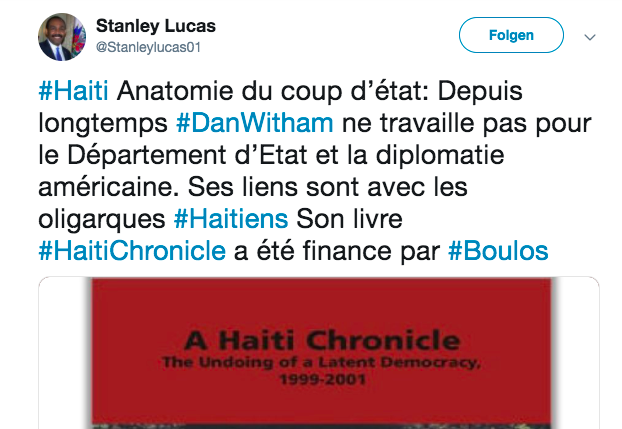
Since deleted tweet from Stanley Lucas, an advisor to president Jovenel Moise. Lucas previously worked for the US government funded International Republican Institute (IRI).
Since deleted tweet from Stanley Lucas, an advisor to president Jovenel Moise. Lucas previously worked for the US government funded International Republican Institute (IRI).
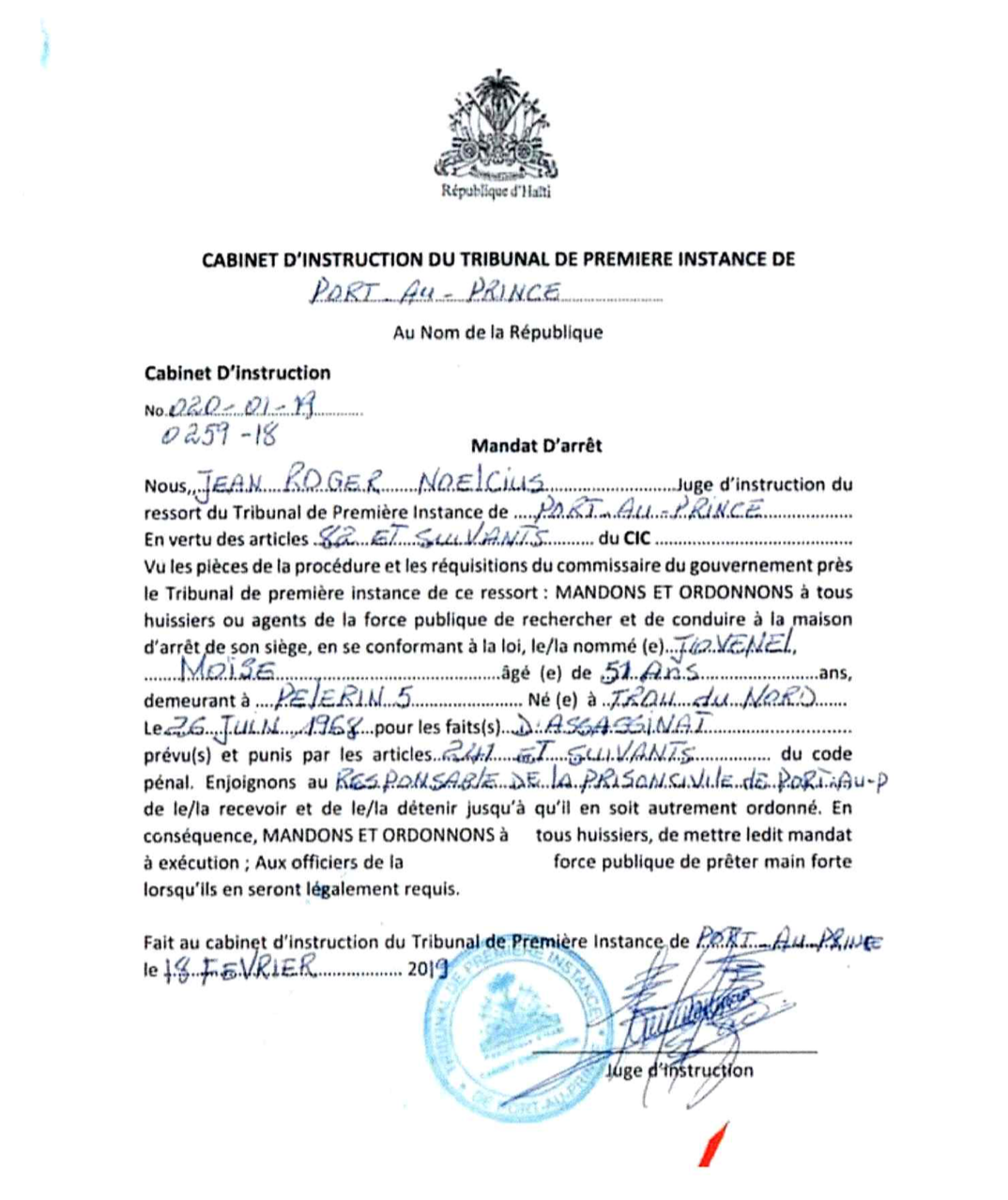
Copy of an apparent February 2019 arrest warrant for Jovenel Moise issued by Judge Jean Roger Noelciu, The document was provided to CTU Security, the Florida-based firm who contracted with at least some of the Colombian former soldiers implicated in the assassination. This is the same warrant, whose authenticity has not been confirmed, used as ostensible justification in the February 7, 2021 effort to replace Moise.
Copy of an apparent February 2019 arrest warrant for Jovenel Moise issued by Judge Jean Roger Noelciu, The document was provided to CTU Security, the Florida-based firm who contracted with at least some of the Colombian former soldiers implicated in the assassination. This is the same warrant, whose authenticity has not been confirmed, used as ostensible justification in the February 7, 2021 effort to replace Moise.
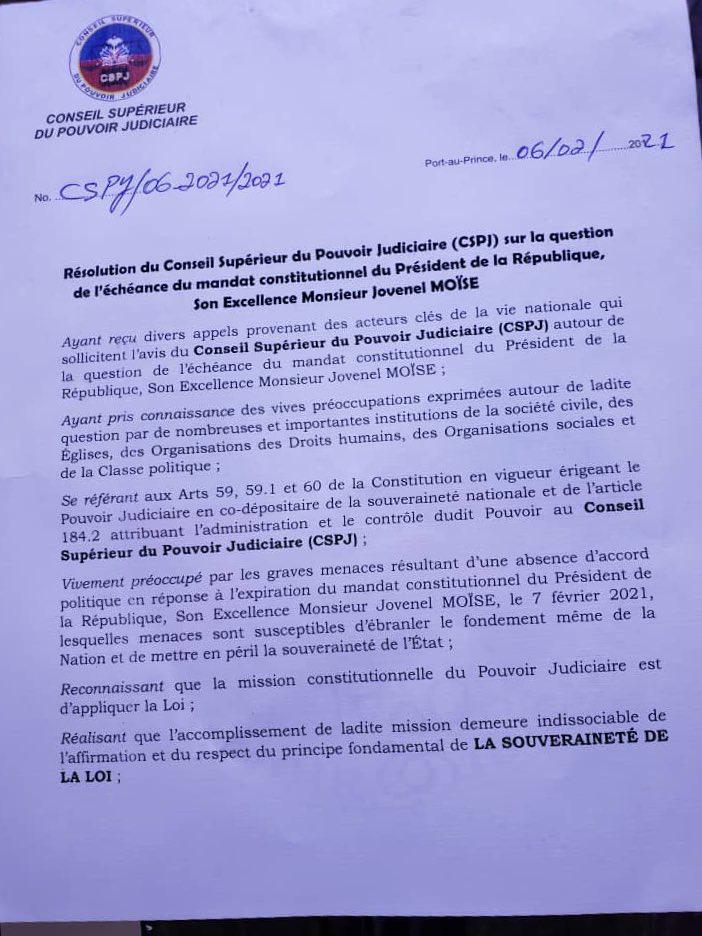
Resolution from Haiti's Superior Council of the Judiciary declaring that President Moise's mandate ended on February 7, 2021.
Resolution from Haiti's Superior Council of the Judiciary declaring that President Moise's mandate ended on February 7, 2021.
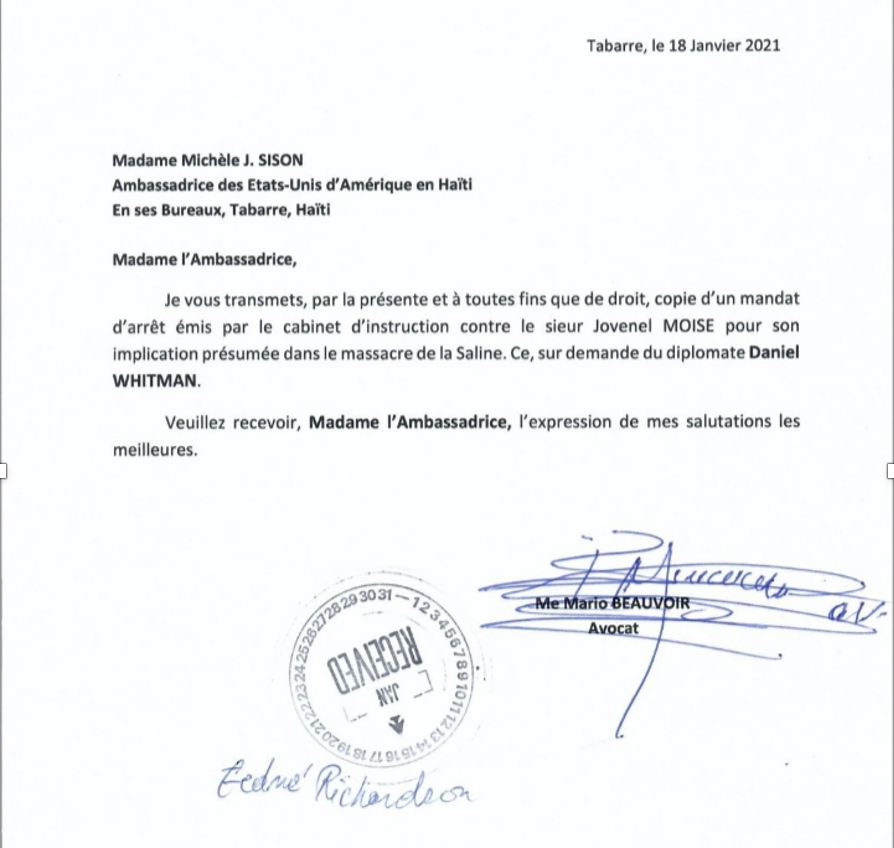
Letter from Mario Beauvoir to US Ambassador Michele Sison dated January 18, 2021 regarding an arrest warrant for President Jovenel Moise.
Letter from Mario Beauvoir to US Ambassador Michele Sison dated January 18, 2021 regarding an arrest warrant for President Jovenel Moise.
THE PETIT BOIS "COUP"

Individuals arrested at Petit Bois. In the chair, with plastic hand ties is police inspector Marie Louise Gauthier.
At 2:59 a.m. on February 7, 2021, Haitian police officers raided an apartment complex known as the Petit Bois residences in the Port-au-Prince’s Tabarre neighborhood. The buildings, a series of one-story, multicolored houses, sit just about one mile from the United States Embassy. By the time the sun had risen, photos of more than a dozen individuals lying or sitting on the pavement inside the compound were circulating on social media. Authorities had collected belongings, including a pile of crumpled Haitian bank notes, a condom, a handful of guns, and a rusted machete in the street. In one photo, a short man with disheveled salt-and-pepper hair, an oversized T-shirt, pajama pants, and socks with flip flops stares defiantly back at the camera. Altogether, 18 individuals were arrested, including a sitting Supreme Court judge, a high-level police inspector, and a former government minister, all accused of organizing a violent coup d’etat.

Two individuals arrested at the Petit Bois apartment complex on February 7, 2021. On the right, agronomist Louis Buteau.
“There was an attempt on my life,” President Jovenel Moïse told reporters a few hours later at an impromptu press conference from the tarmac at the Toussaint Louverture International Airport. He personally thanked the head of the Presidential Security Unit (USGPN), Dimitri Herard, for thwarting this nefarious plot. Moïse said the prime minister would provide more details and boarded a small, private jet, off to Jacmel, a coastal city in the South, for the opening of its annual carnival celebration. There, he and the first lady walked the streets showing no apparent fear for their lives.
The prime minister stated that some of those arrested “had contacted the official in charge of security for the national palace,” and had been planning on arresting the president and swearing in new leadership to oversee a transitional government. There was apparently an arrest warrant signed by a local judge. Soon thereafter, the government released audio recordings it claimed proved the seriousness of the matter. They were of conversations between Dimitri Herard, the man the president had just personally thanked for stopping the plot, and a few different individuals discussing plans to arrest the president.

Items seized at the Petit Bois apartment complex during the February 7, 2021 raid.
In one of the recordings, a female voice tells Herard, “Listen, I received an order from the State Department.”
“Yes, they contacted me too,” Herard responds.
The alleged State Department officer was quickly identified as Daniel Whitman, a retired member of the US foreign service, who had briefly served in Haiti in the early 2000s. Whitman has denied any involvement in the plot. In fact, I would later learn that someone in Haiti had been impersonating Whitman. Various political leaders, journalists, and members of civil society said they had also been contacted by someone claiming to be Whitman. The narrative made little sense. Who had impersonated Whitman, and why? And, if what the authorities said was true, it seemed the entire plot rested on the involvement of the president’s chief of security, Herard, whom the president was hailing as a hero. Was it all a ruse? A set-up to entrap the government’s opponents?

Voice of America article from February 8, 2021 with Whitman's denial of involvement. Haitian state security released a video alleging Whitman was the ringleader of the Petit Bois plan. The article has since been removed from VOA's website.

Since deleted tweet from Stanley Lucas, an advisor to president Jovenel Moise. Lucas previously worked for the US government funded International Republican Institute (IRI).
February 7 was not just the beginning of carnival; it was also the day that Haitian constitutionalists, opposition politicians, and civil society organizations argued that President Moïse’s term officially ended. For them, the only coup was Moïse staying in office. His inauguration had been delayed by a year over a contested electoral process, and, the argument went, the president had lost that year of his mandate. Protests calling for his resignation and the formation of a transitional government had been building for years. Political organizations had been meeting openly for many months debating and discussing plans for a post-Moïse political future. Moïse, however, with the strong backing of the Organization of American States (OAS), United Nations, and US State Department, argued that he should remain in office for another year, until February 7, 2022.

Copy of an apparent February 2019 arrest warrant for Jovenel Moise issued by Judge Jean Roger Noelciu, The document was provided to CTU Security, the Florida-based firm who contracted with at least some of the Colombian former soldiers implicated in the assassination. This is the same warrant, whose authenticity has not been confirmed, used as ostensible justification in the February 7, 2021 effort to replace Moise.
Exactly five months after the arrests at Petit Bois, in the early morning hours of July 7, Jovenel Moïse was assassinated, shot at least a dozen times in his home in the hills above Port-au-Prince. None of the two dozen or so security guards ostensibly protecting the president were injured, raising questions over their involvement in an apparent plot. Herard, hailed as thwarting the February plot, is now in jail. So far, more than 40 suspects in the assassination have been arrested, including 18 retired members of the Colombian military and more than a dozen Haitian police officers. Arrest warrants have been issued for many more individuals, including another Supreme Court judge.

Resolution from Haiti's Superior Council of the Judiciary declaring that President Moise's mandate ended on February 7, 2021.
Few believe the official investigation, conducted with the support of the FBI, Interpol, and governments throughout the region, has identified the assassination's true masterminds. Nevertheless, police named a Haitian-American pastor, Dr. Christian Emmanuel Sanon, as the ostensible ringleader. Like those arrested five months earlier, Sanon allegedly had a plan to detain the president and lead a transitional government. Police found a crumpled-up arrest warrant in a home used by some of the suspects; it was the same warrant that had been used in Petit Bois. And, in another parallel to the February events, multiple suspects in the assassination have claimed that various US agencies were aware of or directly supported their actions. In a highly unusual statement, the Drug Enforcement Administration (DEA) even acknowledged that at least one of those arrested in connection with the assassination had worked for the agency as a confidential informant.

Letter from Mario Beauvoir to US Ambassador Michele Sison dated January 18, 2021 regarding an arrest warrant for President Jovenel Moise.
There remain more questions than answers regarding the president’s shocking death. But, to begin to understand what transpired at the president’s residence that night in early July, one must begin five months earlier, with the predawn raid at the Petit Bois apartment complex.
The following investigation, based on dozens of interviews, including with Sanon and many of those arrested in February, as well as exclusively obtained communication records and internal investigative files, reveals new details about the February coup attempt and its connection with the president’s assassination. This is a story of deceit, of high-level political machinations, of foreign interference, and of the cumulative impact of decades of impunity. It sheds new light on key actors involved behind the scenes in both cases, including individuals now wanted in connection with the president’s killing.
For the first time, the identity of the individual impersonating former State Department official Daniel Whitman, the person believed to be a key instigator of the February plot, is revealed. Taken together, the findings raise new questions about what authorities, both in Haiti and abroad, knew ahead of the July assassination. There was little secret about the meetings taking place at Petit Bois, or about Sanon’s desire to lead a transitional government.
Yet one led to illegal mass arrests, and the other resulted in the president’s brutal assassination. Why? And could it have been stopped?
MASTERMIND OR CON ARTIST?
Christian Emmanuel Sanon, 63 years old, is a tall, burly, and personable man. He’s a talker. It’s a skill he’s used for decades, as a pastor in Florida and as a businessman both in the United States and in Haiti. But that talk hasn’t led to much in the way of commercial success. Florida corporate records show a slew of companies, most now inactive, registered in Sanon’s name. In 2013, he filed for bankruptcy. And there is no shortage of individuals who, over the course of many years, felt like they had been ripped off by Sanon. As one source who had known him for years put it, “he’s the type of guy who tells you he’s got a great deal for you, but, when you show up, it turns out he is just looking for more money.”
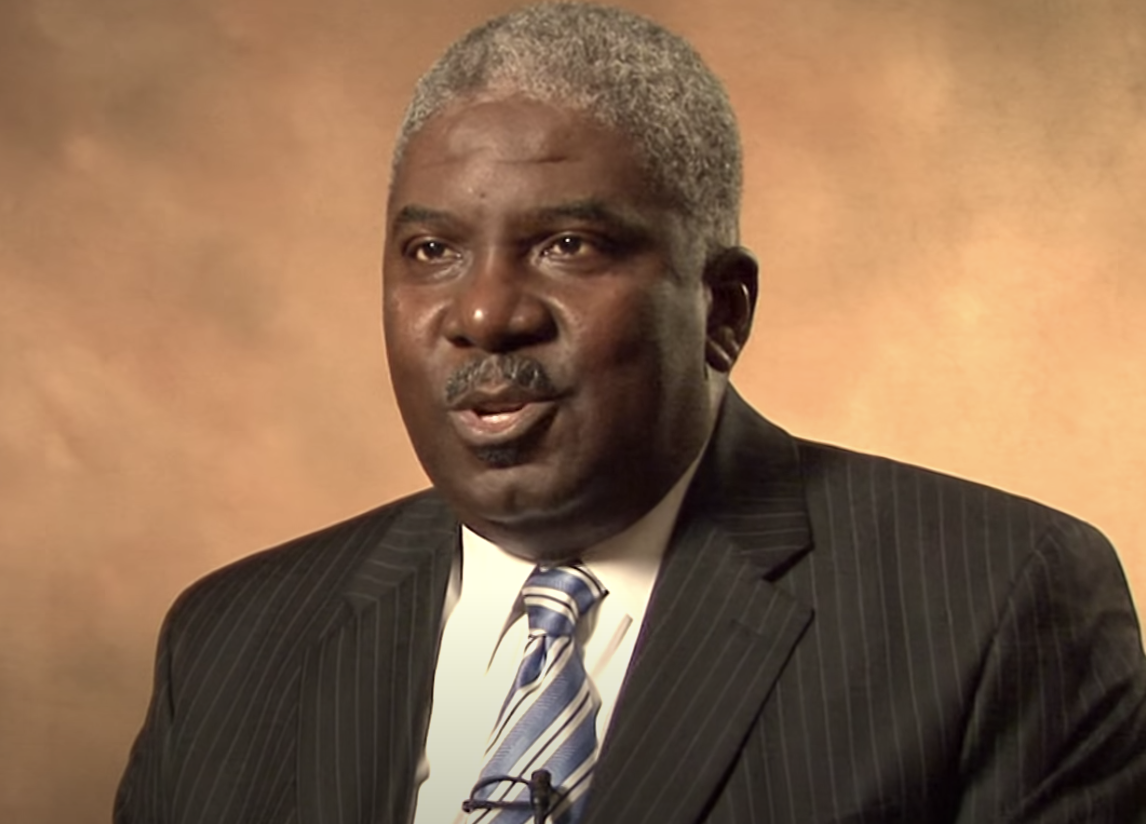
Screenshot from a 2011 video from Christian Sanon titled "Dr. Christian Sanon on Corruption in Politics." Sanon's presidential ambitions date to at least 2010, after the devastating earthquake struck Haiti.
In October 2017, Sanon created a new company in Haiti, Vasco Gaz. The same month, he showed up on the incorporation paperwork for a Tampa Bay-based company with the same name. Though he had no real experience in the industry, the company found some initial success in Haiti. Within months of its creation, the Haitian government had awarded Vasco multiple tenders to deliver kerosene, diesel, and gas. Other players in the industry were suspicious. How could this newcomer underbid them all and actually deliver?
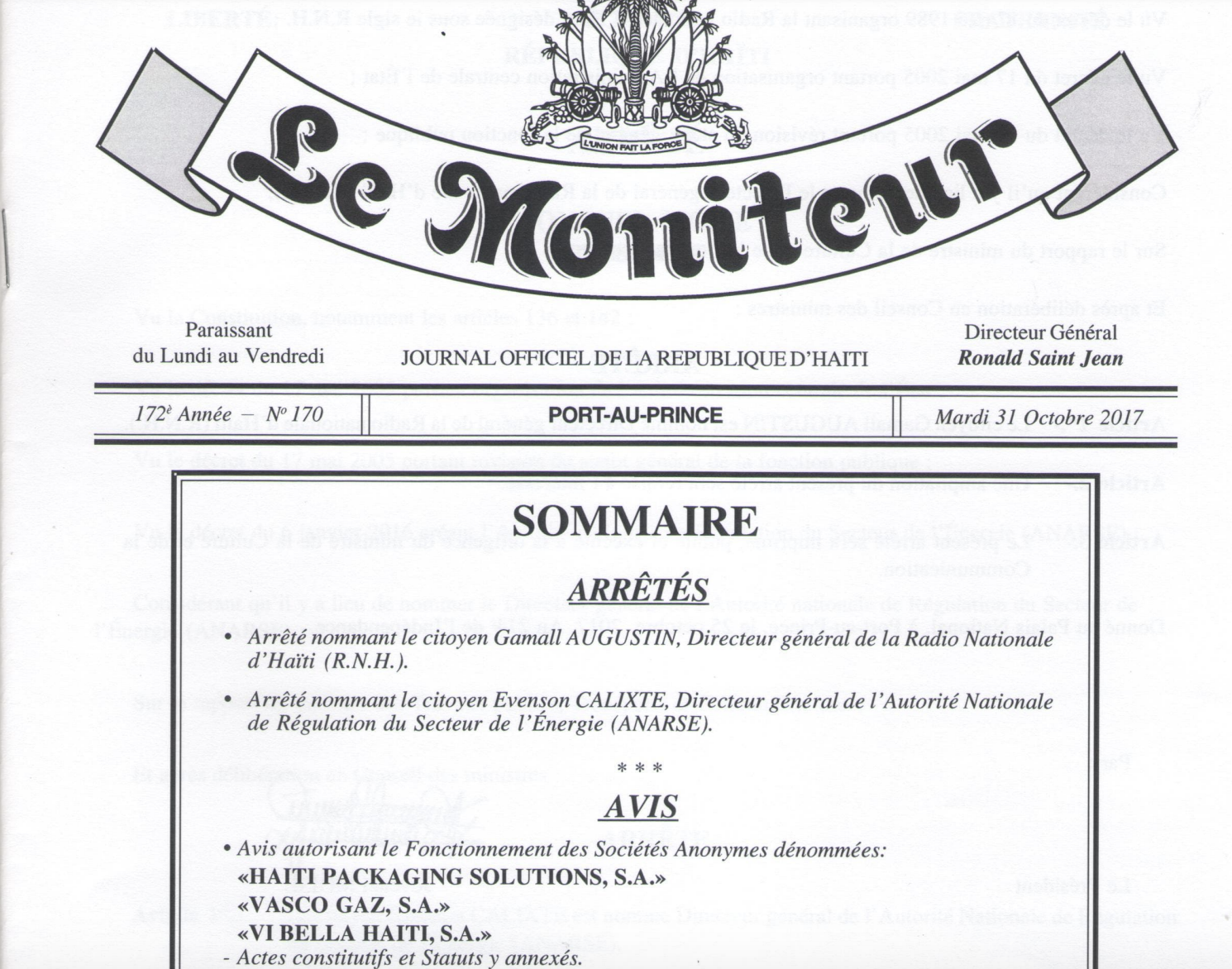
Notice in the official government publication Le Moniteur concerning the creation of a new company, Vasco Gaz S.A. Dated October 31, 2017.
The answer was that it couldn’t. Vasco Gaz reportedly never delivered on its promises, and throughout 2018, Haiti experienced a number of fuel shortages partially as a result. Eventually, the government agency responsible for importing fuel blacklisted the company and turned to other suppliers. Another Sanon business venture had failed, but the fact that he got the contract at all indicates he had some influential connections. Not long after, Sanon turned to his most ambitious scheme yet: organizing a team to lead a transitional government in Haiti.
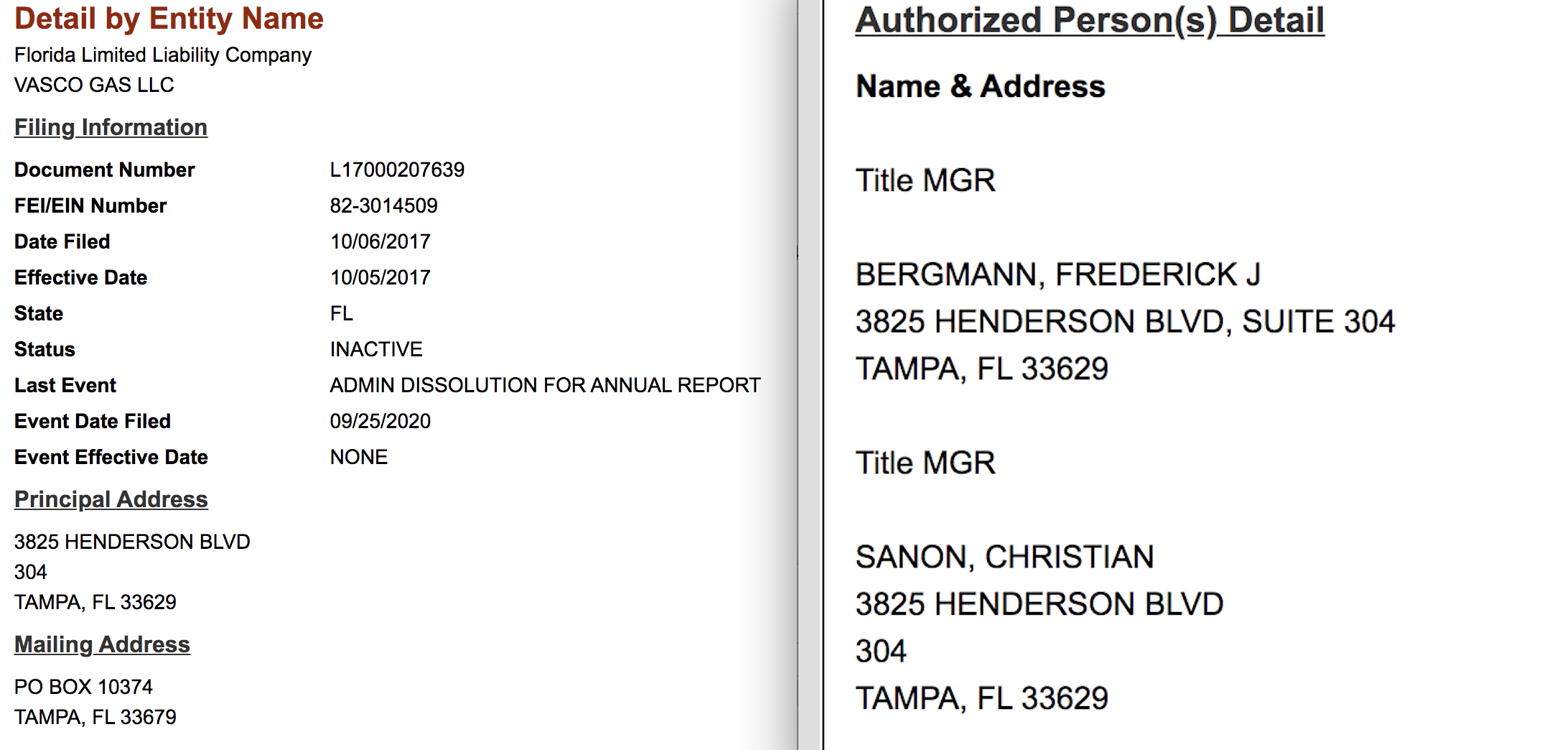
Florida business registration of Vasco Gas LLC with Christian Sanon listed as manager. From sunbiz.org.
In early 2019, Sanon spoke at a South Florida gathering organized by the Diaspora Caribbean Republican Coalition. The event was attended by a number of local Republican officials, including the vice chairman of the Florida State Republican Party. After the event, Sanon met with a handful of attendees and explained that he was putting together a group of individuals and coming up with a plan to lead a transitional government in Haiti. He claimed to have close connections with the Trump administration and with the US State Department.
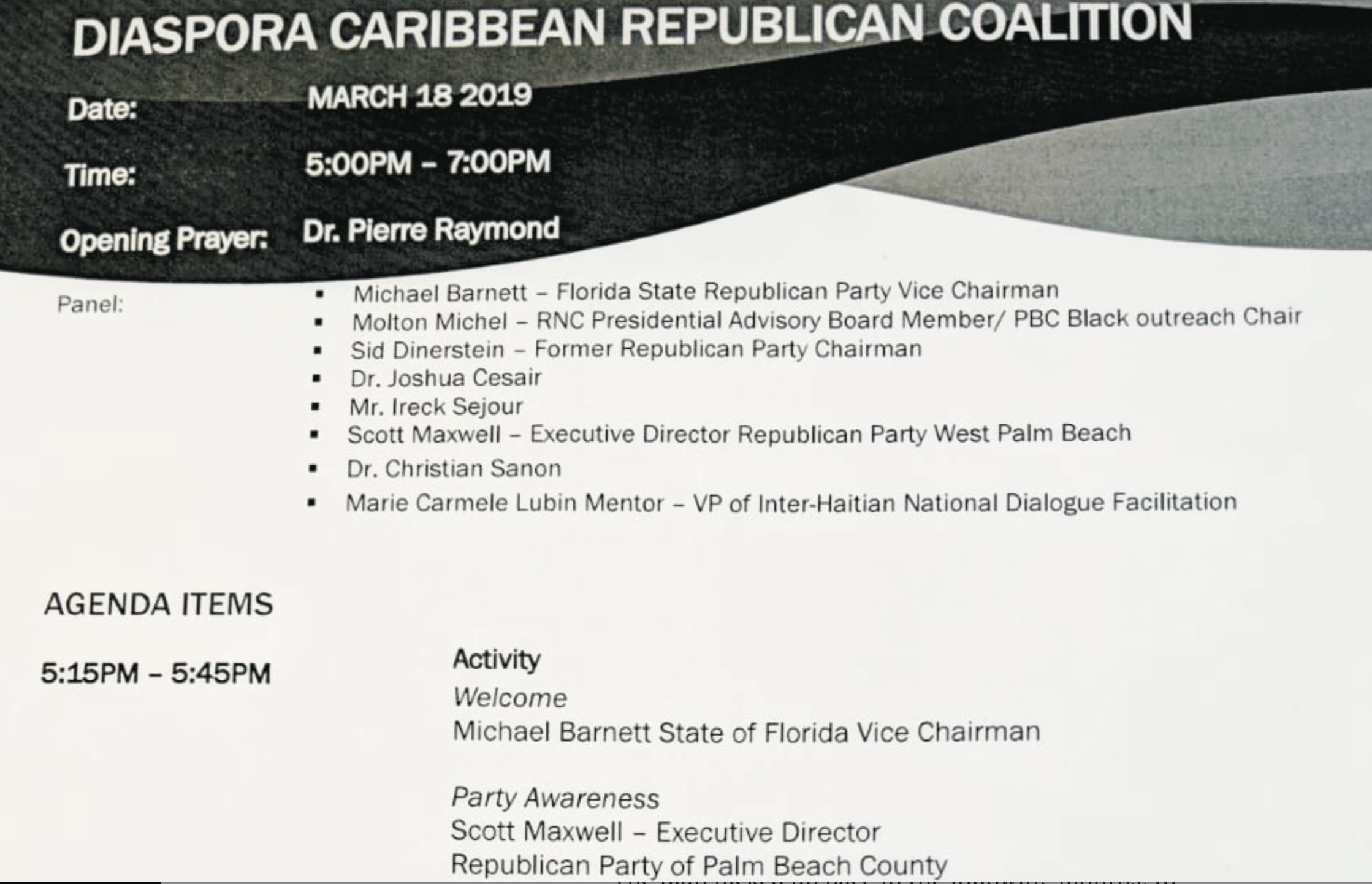
Flyer from a March 18, 2019 meeting of the Diaspora Caribbean Republican Coalition listing Christian Sanon as a panelist.
The plan picked up pace in the following months. In June, Sanon claimed to have had a meeting with the US Embassy in Port-au-Prince. At the time, a source who had been in contact with Sanon sent me a two-page document outlining the initial transition plan, which included disbanding parliament, transferring executive power to the Supreme Court, and naming a new prime minister. Sanon even claimed to have personally met Donald Trump at Mar-a-Lago, though there is no evidence this actually took place. There was little reason to believe the Trump administration had any interest in ousting Moïse, who had been a reliable ally in the US effort to overthrow Nicolas Maduro in Venezuela, the administration’s main agenda in the region. Sanon may never have met Trump at Mar-a-Lago, but in early 2019, Moïse had.
In late September 2019, I received a call from Sanon. He explained that he had been working with a team of individuals with the goal of finally putting Haiti on the right track. “Right now, the president has lost the trust of the people,” he explained. Protests had been building for more than a year. “The people will listen to another voice,” he continued.
He explained that, in the absence of the president, the constitution called for a leader from the Supreme Court to assume the presidency. The group he had been working with initially believed that judge to be Wendelle Coq Thélot, but, he told me, the United States had said no to her, apparently due to allegations of corruption. So now, he added, they were in discussions with other judges to find a replacement.
“We’re putting a group together and getting ready for if there is US support,” he said. And, I asked, what sort of connections did he have with the US government? “We are trying to make connections with people that can help us,” he vaguely explained, before adding that he had access to individuals in both the State Department and White House. Sanon assured me that Moïse would be willing to resign. “The president is just waiting for someone to tell him to go,” he said.
I mostly discarded my brief conversation with Sanon. Over many years following events in Haiti, I’ve realized there are lots of stories and plenty of individuals with wild sounding plans and even wilder claims of US connections. After decades of US political intervention and subterfuge, the perception is that US support is politically deterministic. If one wants to build support for their political project, whatever that may be, convincing others that the US supports it becomes almost a necessity.
In any case, it was no surprise that people, both in Haiti and the diaspora, were organizing around potential transition plans. It was happening in the open, and Sanon’s seemed far from the most serious. A few months later, a large grouping of political organizations and civil society groups met at the Marriott Hotel in Port-au-Prince to publicly discuss plans for a transitional government. Most honestly seemed to believe that the Moïse administration would fall at any moment. It made sense to plan for what would come next. Politicians close to the government, however, alleged the Marriott meetings and other discussions over a transitional government were “plot[s] against the internal security of the state.”
On July 10, 2021, three days after Moïse's assassination, I received a message from an old contact of Sanon, alerting me that the pastor had been arrested in Haiti. The next day, the chief of the Haitian police held a press conference and announced to the world that Christian Emmanuel Sanon had masterminded the assassination of the president. It had been nearly two years since Sanon had told me of his plans to lead a transitional government in Haiti. I had heard stories of his failed business ventures, scams, and other seemingly harebrained plots. I was immediately skeptical that Sanon could have been the puppet master pulling the strings behind such a high-profile crime.
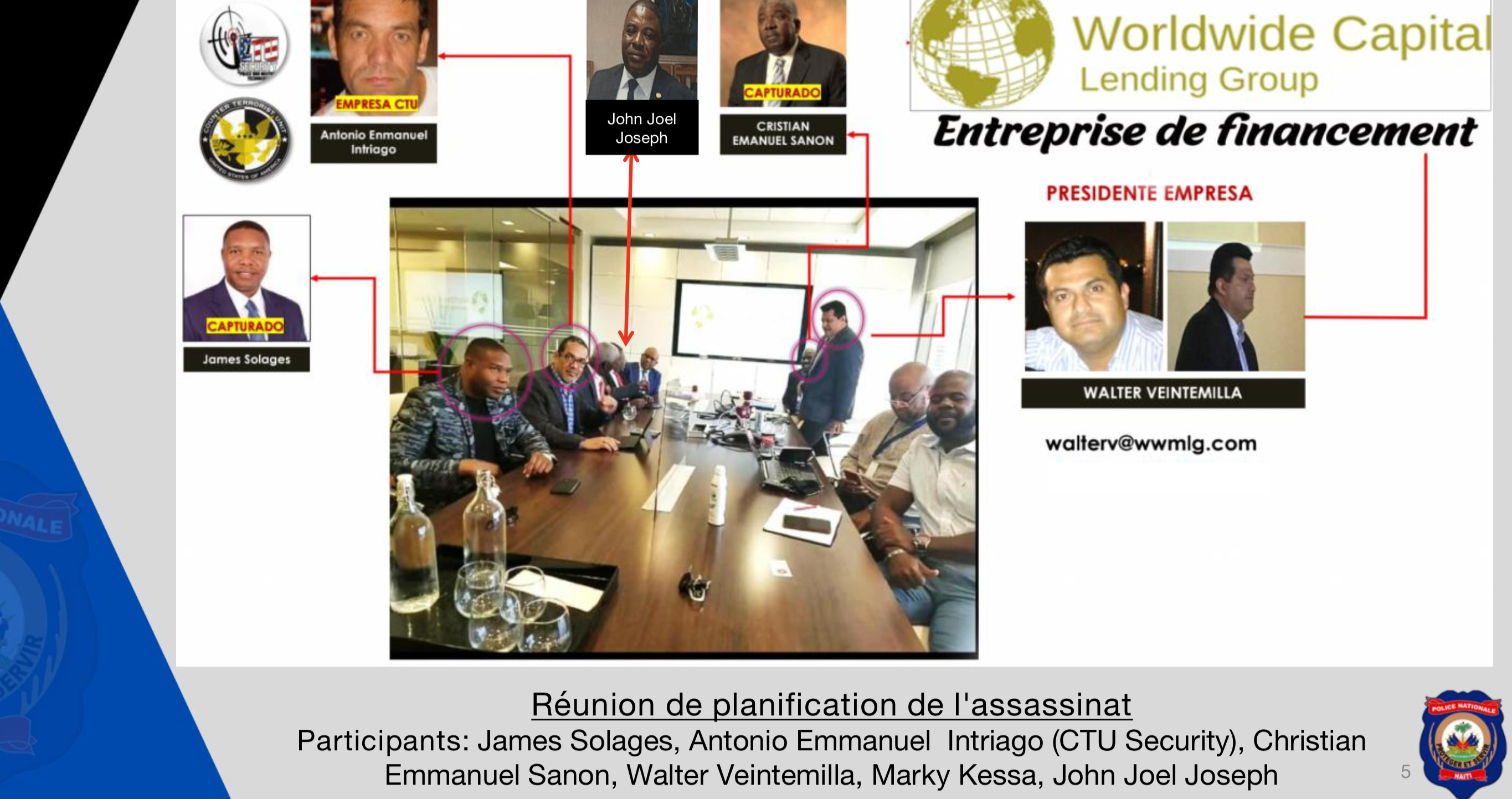
Slide from a presentation made by the Haitian National Police claiming this was the meeting where the assassination was planned. The police said the meeting took place in the Dominican Republic. In fact, the meeting took place in Florida. The image was actually taken from a public YouTube video. Christian Sanon is present along with a number of other alleged suspects.
I had little doubt that Sanon really believed, at least initially, that he was going to be prime minister, or president, or whatever. He had made that clear to me two years earlier. Was it another grift that spiraled out of control? Or was he just a convenient scapegoat for someone else's macabre plan? What it reminded me of was Petit Bois and the arrests made five months earlier.

Screenshot from a 2011 video from Christian Sanon titled "Dr. Christian Sanon on Corruption in Politics." Sanon's presidential ambitions date to at least 2010, after the devastating earthquake struck Haiti.
Screenshot from a 2011 video from Christian Sanon titled "Dr. Christian Sanon on Corruption in Politics." Sanon's presidential ambitions date to at least 2010, after the devastating earthquake struck Haiti.

Notice in the official government publication Le Moniteur concerning the creation of a new company, Vasco Gaz S.A. Dated October 31, 2017.
Notice in the official government publication Le Moniteur concerning the creation of a new company, Vasco Gaz S.A. Dated October 31, 2017.

Florida business registration of Vasco Gas LLC with Christian Sanon listed as manager. From sunbiz.org.
Florida business registration of Vasco Gas LLC with Christian Sanon listed as manager. From sunbiz.org.

Flyer from a March 18, 2019 meeting of the Diaspora Caribbean Republican Coalition listing Christian Sanon as a panelist.
Flyer from a March 18, 2019 meeting of the Diaspora Caribbean Republican Coalition listing Christian Sanon as a panelist.

Slide from a presentation made by the Haitian National Police claiming this was the meeting where the assassination was planned. The police said the meeting took place in the Dominican Republic. In fact, the meeting took place in Florida. The image was actually taken from a public YouTube video. Christian Sanon is present along with a number of other alleged suspects.
Slide from a presentation made by the Haitian National Police claiming this was the meeting where the assassination was planned. The police said the meeting took place in the Dominican Republic. In fact, the meeting took place in Florida. The image was actually taken from a public YouTube video. Christian Sanon is present along with a number of other alleged suspects.
THE IMPERSONATOR
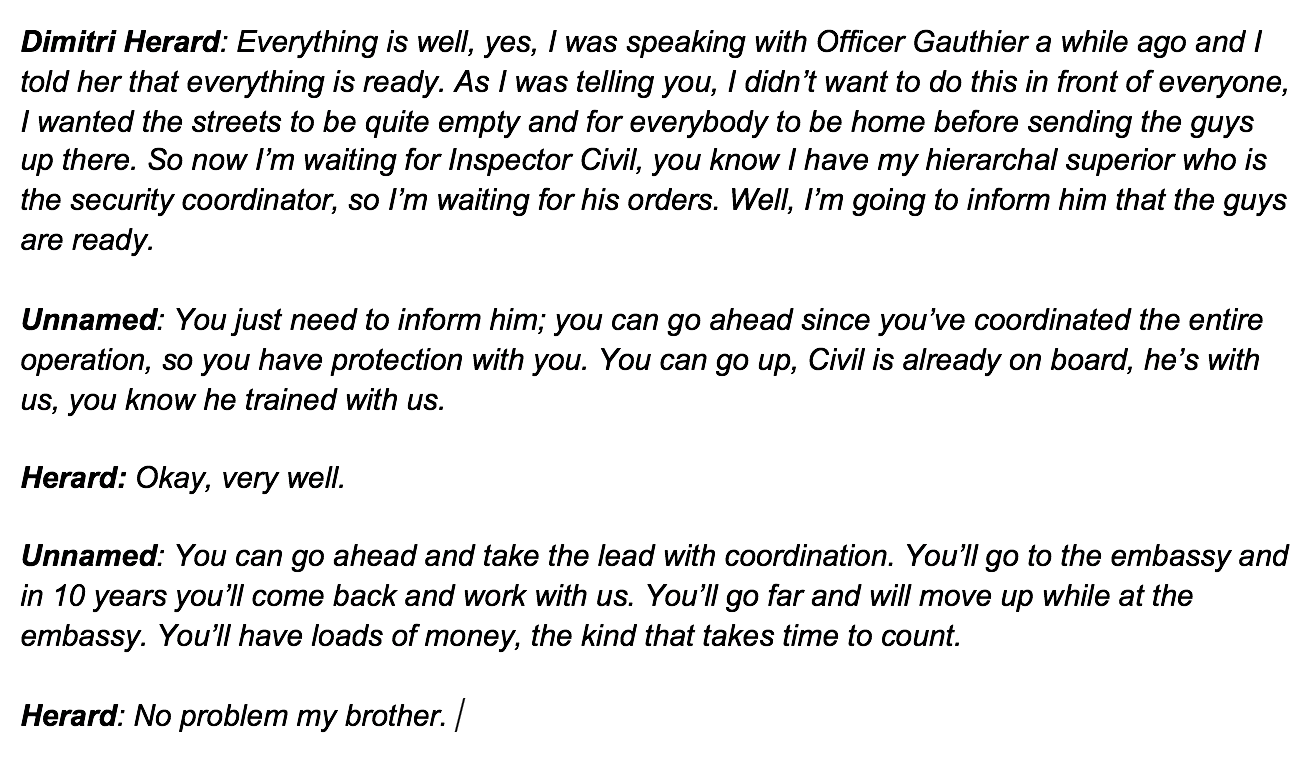
Transcript from an audio recording between Dimitri Herard, the chief of the president's security detail, and an unnamed individual. In another recording the unnamed individual identifies himself as Philippe MarcAndre, an alias. Civil refers to Jean Laguel Civil, the coordinator of all presidential security units and Herard's direct superior.
Transcript from an audio recording between Dimitri Herard, the chief of the president's security detail, and an unnamed individual. In another recording the unnamed individual identifies himself as Philippe MarcAndre, an alias. Civil refers to Jean Laguel Civil, the coordinator of all presidential security units and Herard's direct superior.
On February 6, 2021, Dimitri Herard spoke by telephone with a man identifying himself as Philippe MarcAndre, according to audio recordings released by the government after the arrests at Petit Bois. Herard, the head of the president’s security, agreed to send a contingent of troops under his command to the apartment complex that night in preparation for the following day, when president Jovenel Moïse would leave the palace and a new president would be sworn in. "You'll have loads of money," MarcAndre tells Herard.
Herard: So now I have another question for you, once I send the guys up tonight, you told me the installation would take place at 10 a.m. tomorrow morning.
MarcAndre: Yes, 10.
Herard: So, once I do that, what about President Jovenel? You told me about a warrant that you had on him, so that I could bring him to you.
MarcAndre: We’ll send the warrant to you on your phone and then you’ll come with him on the base. From there he’s the [foreigners’] responsibility.
Herard: Okay but when are you sending me the warrant? Because it is the legal aspect of the case, so don’t forget that if I don’t have a warrant and I’m doing certain things, I’m a terrorist.
MarcAndre: No don’t worry, the warrant is here. Gauthier is getting it right now, you’ll print it and the original is with the judge. Judge Noel. We’ll send you a number.
Herard: Judge Noel?
MarcAndre: Yes.
Herard: Okay, but let me explain myself Philippe, I’m starting to work for you all tonight, but starting tonight, I don’t have anything with me to protect myself, which is why the warrant is important to me.
MarcAndre: Okay, do you want me to send it to you on your phone?
Herard: Yes, please.
MarcAndre: Okay, I’ll send it now with the notice of receipt of the American embassy.
Herard: Okay, send it to me now and I’ll act now.
MarcAndre: Okay, no problem.
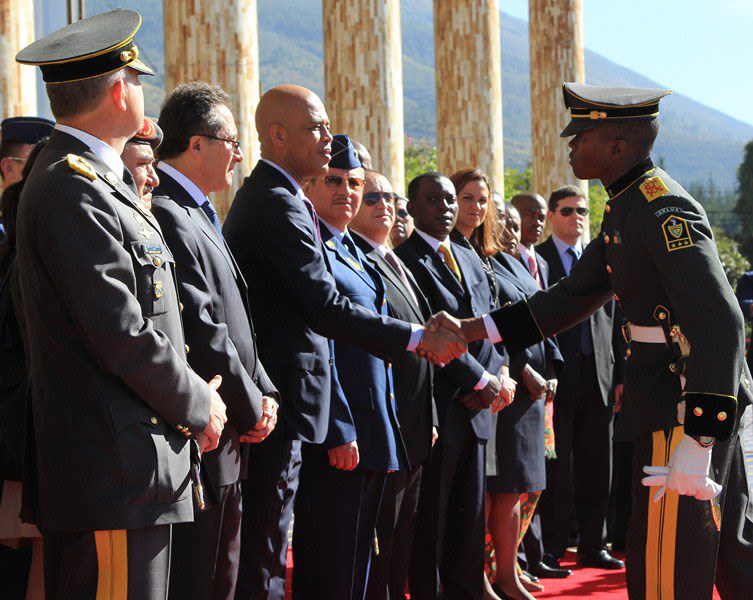
Former President Michel Martelly shakes hands with Dimitri Herard in Ecuador in July 2012. Image from Martelly's facebook page.
Former President Michel Martelly shakes hands with Dimitri Herard in Ecuador in July 2012. Image from Martelly's facebook page.
Herard, who studied at an elite Ecuadorian military university and had been trained in intelligence, made for an interesting co-conspirator. He had developed a close relationship with former president Michel Martelly, who had picked Jovenel Moïse as his successor. And, on Martelly’s recommendation, Herard had served as head of the National Palace General Security Unit (USGPN) in the years since Moïse had taken office.
If he was involved, it meant one of two things: either the president’s inner circle had turned on him, or he was doing counterintelligence. The fact that the president had publicly thanked him for thwarting the plot hinted at the latter. But, as the recordings made clear, without Herard’s involvement, there simply was no plan, or, at least, no ability to actually carry one out.
Had those arrested been misled from the beginning?
The plan had begun at least five months earlier. In late August, Marie Antoinette Gauthier, a doctor and former medical director of Haiti's general hospital, received a call from someone she didn’t know, a man identifying himself as Mark Philippe. He wanted to talk about the future of Haiti. He claimed to have support from the US government and wanted to help put together a transitional government. The two struck up something of a friendship, and often spoke for an hour or more in the evenings. Other members of Gauthier’s family also started speaking with Philippe, including her sister, a high-ranking inspector in the Haitian National Police. “He became almost part of the family,” Gauthier said, looking back months later.
Philippe told the Gauthiers that he was working with Daniel Whitman, a former State Department official who had served as a press officer at the US Embassy in Port-au-Prince from 2000 to 2001.
Still, Gauthier and her husband say they were skeptical. That is, until they spoke with Carolle Tranchant and her husband, Lynn Garrison, a former Canadian Air Force pilot, who convinced them otherwise. “Everyone thinks he is CIA,” Louis Buteau, Gauthier’s husband, told me. In the early 90s, following a coup that ousted the country’s first democratically elected president, Jean-Bertrand Aristide, Garrison served as a political advisor to the leader of the military junta that seized power. Though he has previously denied being CIA, he has claimed to have ties with US intelligence agencies and among US politicians. Garrison is credited with being a source for the CIA’s early 90s allegation that Aristide suffered from mental illness.
November 2, 1993 article in The Independent about Lynn Garrison.
November 2, 1993 article in The Independent about Lynn Garrison.
November 8, 1993 article in TIME about Lynn Garrison. The TIME and Independent articles came just weeks after the CIA briefed congress on Aristide's "psychological profile." At the time, the Clinton administration was discussing militarily intervening to restore Aristide to power, an effort adamantly opposed by Garrison, as well as a number of Senators, including Jesse Helms (R-NC). "Everything the U.S. Senate knows … comes from me,” Garrison told the reporter. After the CIA briefing, Helms told the press that Aristide was a “demonstrable killer” and a “psychopath.”
November 8, 1993 article in TIME about Lynn Garrison. The TIME and Independent articles came just weeks after the CIA briefed congress on Aristide's "psychological profile." At the time, the Clinton administration was discussing militarily intervening to restore Aristide to power, an effort adamantly opposed by Garrison, as well as a number of Senators, including Jesse Helms (R-NC). "Everything the U.S. Senate knows … comes from me,” Garrison told the reporter. After the CIA briefing, Helms told the press that Aristide was a “demonstrable killer” and a “psychopath.”
Believing this plan might actually be legitimate, the Gauthier's continued to speak with Philippe. He explained that they needed housing in Haiti for the plan, a place where they could hold meetings in confidence. Gauthier reached out to an old friend, Jean Marie Vorbe, whose company, Sogener, had been seized by the government the year prior. Vorbe, like many in the nation’s elite families, had financially backed Moïse’s presidential campaign, but by 2020, with his business gone and his family under threat of further legal issues, that relationship had been completely severed. Vorbe owned the Petit Bois Residences.
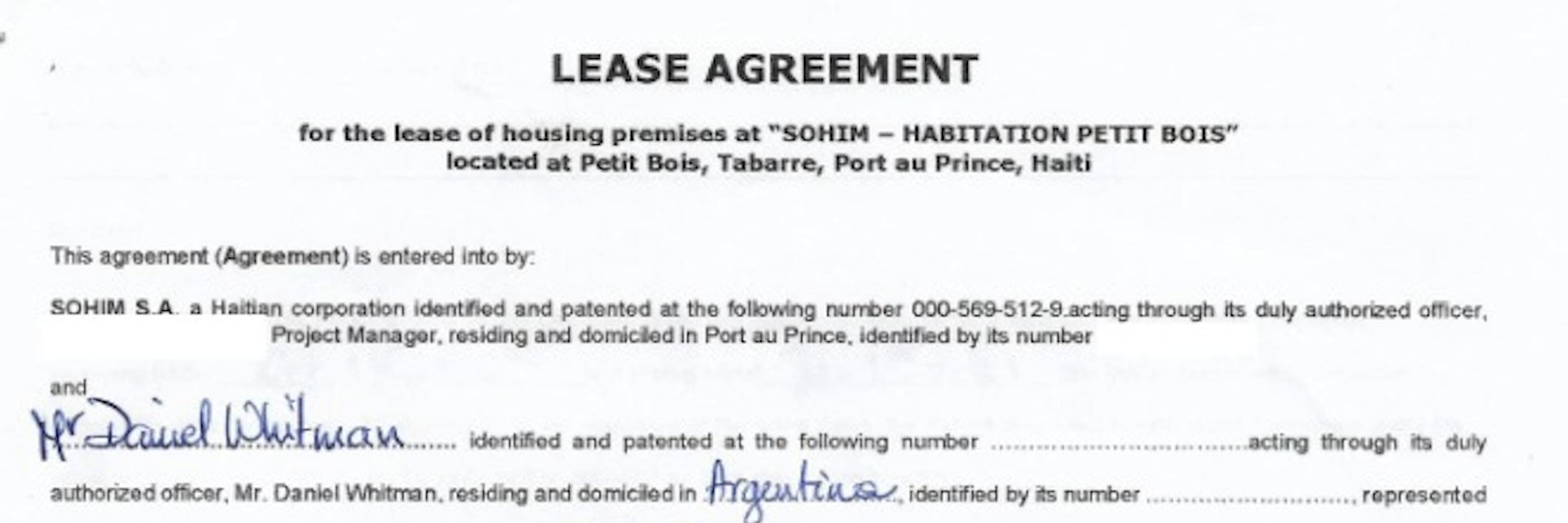
Part of a lease agreement for the Petit Bois apartments in the name of a Daniel Whitman domiciled in Argentina.
Part of a lease agreement for the Petit Bois apartments in the name of a Daniel Whitman domiciled in Argentina.
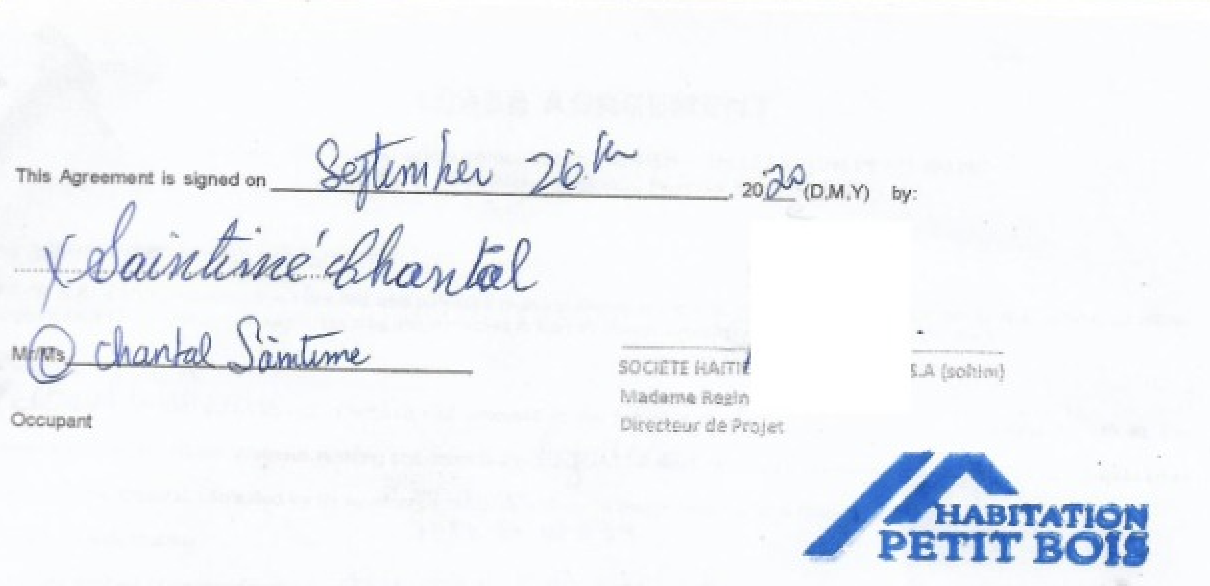
Chantal Saintime signs the lease agreement as a "representative" of Daniel Whitman. September 26, 2020.
Chantal Saintime signs the lease agreement as a "representative" of Daniel Whitman. September 26, 2020.
On September 26, 2020, Chantal Saintime, who presented herself as a representative of Daniel Whitman, signed a lease agreement for the use of 25 housing units. Saintime agreed to pay a $10,000 deposit, though the money did not come right away. Still, trusting that his old friend would come through with the money eventually, Vorbe agreed to let the group into the Petit Bois apartments. The first group moved in soon thereafter, in early October.
I first started hearing whispers of Whitman’s name about six weeks later, in mid-November. A source sent me a screenshot of a message they had received on WhatsApp.
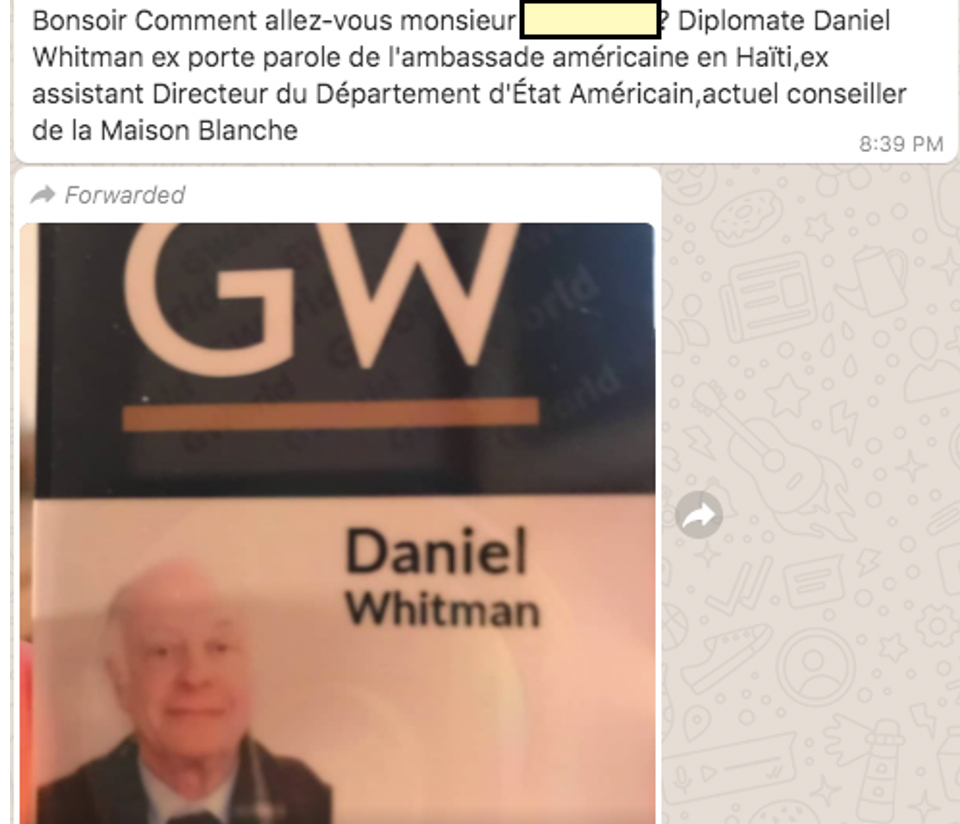
WhatsApp message from an individual claiming to be Daniel Whitman and presenting himself as a current White House advisor. The individual included a photo of a George Washington University ID badge belonging to Whitman.
WhatsApp message from an individual claiming to be Daniel Whitman and presenting himself as a current White House advisor. The individual included a photo of a George Washington University ID badge belonging to Whitman.
“Good evening, how are you, [redacted]? Diplomat Daniel Whitman ex-spokesperson for the American embassy in Haiti, ex-assistant director of the American State Department, current adviser to the White House,” the message read in French. The person said they had rented an apartment in Tabarre, right near the US embassy, where there was a group working “for the smooth development of a new system of governance.” They urged my source to contact a former Haitian judicial official, Mario Beauvoir, to urgently discuss the matter.
The next month, I received another message asking about Whitman from a different source. It seemed that word was spreading. He was working for the State Department, or maybe it was the National Security Council; no, it was the White House, others said. Had President-Elect Joe Biden sent an emissary to evaluate “options” in Haiti? Nothing seemed to make any sense. The individual who had first told me about Whitman was skeptical. As far as they knew, nobody had ever met the former diplomat face-to-face. In fact, they had even warned one of those allegedly in touch with Whitman to be careful.
As he had discussed with the man calling himself Philippe MarcAndre, Dimitri Herard and the USGPN arrived at the Petit Bois apartments in the evening on February 6, 2021. But, they were not there to help arrest the president; they went to Petit Bois to arrest everyone staying there. When the photos of those arrested started circulating, the pieces started coming together. The individuals I had been told were meeting with Whitman had all been arrested, including Marie Antoinette Gauthier; her sister, the police inspector; a Supreme Court judge; and Chantal Saintime. The one person who was not arrested was Mario Beauvoir, who had apparently left the apartment complex earlier that day and — as of this writing — has not been seen or heard from in public since.
It was time to find the real Whitman.
It wasn’t difficult. I sent an email to his publicly listed American University email address and he responded seven minutes later. While Whitman was outraged by the general situation in Haiti, he categorically denied even knowing the names of those who had been arrested that morning. He had left Haiti after his posting in 2001 and had never returned, he said, though he had stayed in contact with a few friends and followed the situation some from Washington.
A week later, we met at the Bishop’s Garden in the shadow of the National Cathedral in Washington. Whitman, 75 years old with thinning white hair, showed up wearing a trench coat. “It makes for a better movie opening than a parking garage in Arlington,” he said with a wry smile that seemed to rarely leave his face. It was a reference to "Deep Throat," the anonymous source that drove the Washington Post’s Watergate coverage. Despite the theatrics, he was not, nor was he trying to be, Deep Throat. But we were meeting in person because I had a hunch who had been impersonating him, and it seemed like Whitman’s name hadn’t simply been pulled out of thin air.
FROM ONE ASSASSINATION TO THE NEXT
In early October 2020, Whitman received a phone call from someone he had not seen in nearly 20 years, a man named Philippe Markington. They had last met in the aftermath of the April 2000 assassination of Haiti’s most prominent journalist, Jean Léopold Dominique, when Whitman was still at the US Embassy in Haiti. At the time, Markington presented himself to the police as a witness to the murder. He quickly became a suspect. Whitman, who had been a guest on Dominique’s radio show in the months before the assassination, met Markington at his embassy office. It wasn't their first encounter. Markington, portraying himself as a government insider, came to the office frequently with tales of "hit-lists" and other supposed evidence of government misdeeds.
It is unclear why Markington was allowed to leave prison to meet with Whitman. In a book Whitman wrote after leaving Haiti, he remembered Markington having visible injuries that he assumed were from being tortured. Markington said that he was being pressured to blame Whitman and the CIA for the assassination. They met two or three times over a short period of time, Whitman wrote, always with approval from his superiors.
Markington surely never forgot the encounters.
The assassination of Dominique was a politically charged and high-profile affair, the subject of an award-winning 2003 documentary by Jonathan Demme, director of "The Silence of the Lambs." It came at the end of president René Préval's first term, in the spring of 2000, and, in many ways, marked a turning point in his relationship with his political mentor and predecessor, Jean-Bertrand Aristide. The assassination was quickly linked to ostensible allies of Aristide, who was preparing to run in upcoming elections for a second mandate, specifically a powerful senator and former military officer, Dany Toussaint. For his part, Toussaint pointed a finger at Whitman and questioned the diplomat’s relationship with Markington. Why was someone at the US Embassy meeting a suspect? Toussaint asked publicly. Whitman says that the Haitian police even had a file on him as a suspect in the case. The assassins allegedly drove a white Jeep, a similar vehicle to the one Whitman used.
Toussaint, who received CIA training, had begun to distance himself from Aristide and his Lavalas party well before the assassination however, and he played an active role with the US, other former soldiers, and the Haitian elite, in undermining the government. Those efforts, stoked by the allegations around Dominique's assassination, succeeded in 2004, when Aristide was overthrown in a coup d’etat. Though many blamed the Aristide government for blocking the Dominique investigation, the case went nowhere even after his ouster. “[It] obviously raises the specter that the whole thing was a charade from the beginning,” Brian Concannon, who investigated the case at the time with the Bureau des Avocats Internationaux, later said. Twenty years after Dominique’s death, the masterminds of that killing have never been identified, a warning to those hoping for quick results after the Moïse assassination.
As for Markington, he was indicted in 2003. He spent less than two years in prison before managing to escape along with two other codefendants. While they were both recaptured, Markington managed to flee the country and eventually settled in Argentina, where he lived out of sight for more than a decade. That changed under the presidency of Michel Martelly. A new judge, Yvickel Dabrésil — the same judge who would be arrested on February 7, 2021 — reopened the investigation and issued a series of new indictments, targeting a number of former officials perceived as close to Aristide, including Markington. In June 2014, Markington was repatriated from Argentina to Haiti. He’s been in a jail in the capital ever since.
Was this the man impersonating Whitman?
I reached out to someone who had worked the Dominique case all those years ago. “When [Markington] came to my office to give me info, I had two choices: believe him or arrest him,” remembered Jean-Sénate Fleury, a former judge and prosecutor. “I arrested him.”
Clearly Fleury didn’t believe the information that Markington provided. “I know for sure he was working for the Haitian police as an informant [at the time of the assassination]” he said. There was always something more going on, he suspected. Fleury said he had long wondered how Markington had managed to get to Argentina in the first place. He has previously suggested it was the CIA. “Markington is someone very well connected,” he told me. I asked if Fleury thought it could have been Markington impersonating Whitman. He had no direct knowledge. But, he added, Markington was a talker. “With his speech, he can drive you anywhere. If something is white, he will tell you it is black — and you will believe it.”
When Markington called Whitman in the fall of 2020, he said that he and others in Haiti were planning a transitional government, and he wanted Whitman to come to Haiti for the inauguration in early 2021. He said they had rented a house near the US Embassy and invited Whitman there. Whitman told me he declined, and put the issue behind him. Still, Markington had continued to call, almost always from a different number.
After the February 7 arrests, journalist Roudy Metellus took to his radio program’s airwaves to explain that he had been contacted by someone claiming to be Whitman. The person had reached out using a number with a 786 area code — South Florida. But, he said, when he got a friend to make contact with the number, the person on the other end didn’t even speak English. The real Whitman may not have had anything to do with the plot, but he did hold the key to finding the impersonator. Philippe Markington had left him a voicemail using that same 786 phone number. It appeared that Markington, still in a jail cell at the National Penitentiary, had been the one impersonating Whitman. And, it seems likely he was also Philippe MarcAndre, the person on the other end of the conversation with the president’s chief of security, Dimitri Herard.
In another conversation on February 6, Herard speaks with the man identifying himself as MarcAndre, who explains that the US Embassy had signed off on the arrest of President Moïse. Herard presses, asking who specifically had approved this, but MarcAndre demurs and quickly hangs up the phone. Herard continued to record.
“He had to go and turn off the phone. He’s in Haiti!” Herard says.
“He’s in Haiti!” Someone can be heard saying in the background, before everyone starts to laugh.
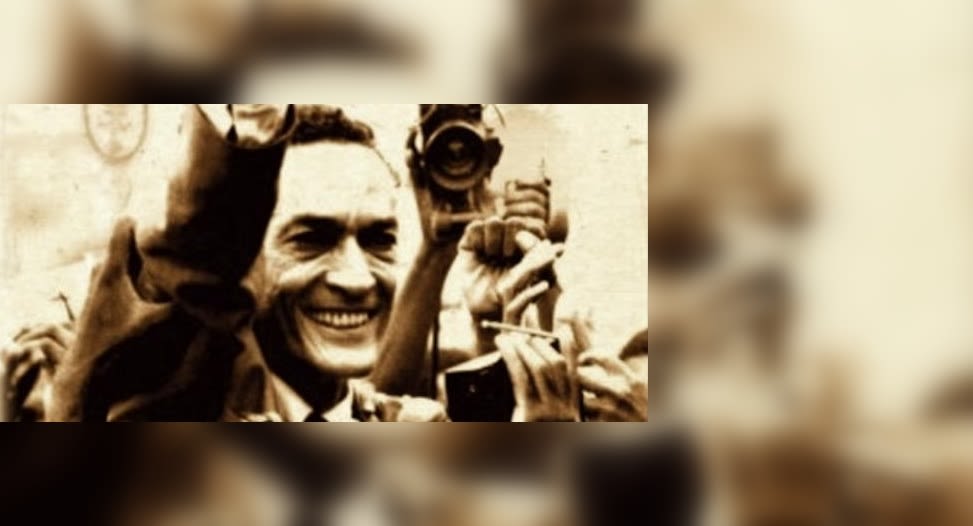
FROM ONE ASSASSINATION TO THE NEXT
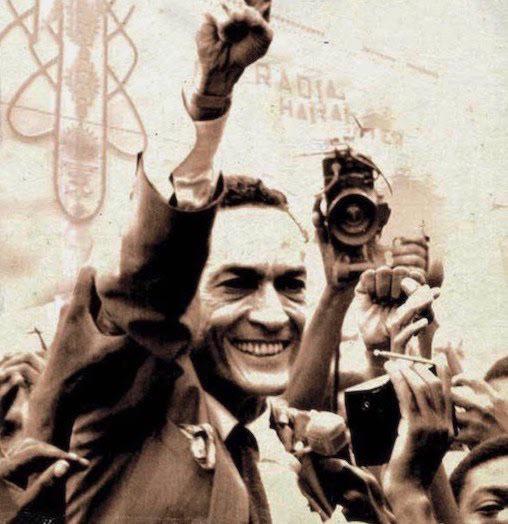
Jean Léopold Dominique
Jean Léopold Dominique
In early October 2020, Whitman received a phone call from someone he had not seen in nearly 20 years, a man named Philippe Markington. They had last met in the immediate aftermath of the April 2000 assassination of Haiti’s most prominent journalist, Jean Léopold Dominique, when Whitman was still at the US Embassy in Haiti. At the time, Markington presented himself to the police as a witness to the murder. He quickly became a suspect. Whitman, who had been a guest on Dominique’s radio show just weeks before the assassination, met Markington at his embassy office. It wasn't their first encounter. Markington, portraying himself as a government insider, came to the office frequently with tales of "hit-lists" and other supposed evidence of government misdeeds.
It is unclear why Markington was allowed to leave prison in the first place. In a book Whitman wrote after leaving Haiti, he remembered Markington having visible injuries that he assumed were from being tortured. Markington said that he was being pressured to blame Whitman and the CIA for the assassination. They met two or three times over a short period of time, Whitman wrote, always with approval from his superiors.
Markington surely never forgot the encounters.
The assassination of Dominique was a politically charged and high-profile affair, the subject of an award-winning documentary by Jonathan Demme, director of "The Silence of the Lambs". It came at the end of president René Préval's first term, in the spring of 2000, and, in many ways, marked a turning point in his relationship with his political mentor and predecessor, Jean-Bertrand Aristide. The assassination was quickly linked to allies of Aristide, who was preparing to run in upcoming elections for a second mandate, specifically a powerful senator and former military officer, Dany Toussaint. For his part, Toussaint pointed a finger at Whitman and questioned the diplomat’s relationship with Markington. Why was someone at the US Embassy meeting a suspect? Toussaint asked publicly. Whitman says that the Haitian police even had a file on him as a suspect in the case. The assassins allegedly drove a white Jeep, a similar vehicle to the one Whitman used.
Toussaint, who received CIA training, had begun to distance himself from Aristide and his Lavalas party well before the assassination however, and he played an active role with the US, other former soldiers, and the Haitian elite, in undermining the government. Those efforts, stoked by the allegations around Dominique's assassination, succeeded in 2004, when Aristide was overthrown in a coup d’etat. Though many blamed the Aristide government for blocking the Dominique investigation, the case went nowhere even after his ouster. “[It] obviously raises the specter that the whole thing was a charade from the beginning,” Brian Concannon, who investigated the case at the time with the Bureau des Avocats Internationaux, later said. Twenty years after Dominique’s death, the masterminds of that killing have never been identified, a warning to those hoping for quick results after the Moïse assassination.
As for Markington, he was indicted in 2003. He spent less than two years in prison before managing to escape along with two other codefendants. While they were both recaptured, Markington managed to flee the country and eventually settled in Argentina, where he lived out of sight for more than a decade. That changed under the presidency of Michel Martelly. A new judge, Yvickel Dabrésil — the same judge who would be arrested on February 7, 2021 — reopened the investigation and issued a series of new indictments, targeting a number of former officials perceived as close to Aristide, including Markington. In June 2014, Markington was repatriated from Argentina to Haiti. He’s been in a jail in the capital ever since.
Was this the man impersonating Whitman?
I reached out to someone who had worked the Dominique case all those years ago. “When [Markington] came to my office to give me info, I had two choices: believe him or arrest him,” remembered Jean-Sénate Fleury, a former judge and prosecutor. “I arrested him.”
Clearly Fleury didn’t believe the information that Markington provided. “I know for sure he was working for the Haitian police as an informant [at the time of the assassination]” he said. There was always something more going on, he suspected. Fleury said he had long wondered how Markington had managed to get to Argentina in the first place. He has previously suggested it was the CIA. “Markington is someone very well connected,” he told me. I asked if Fleury thought it could have been Markington impersonating Whitman. He had no direct knowledge. But, he added, Markington was a talker. “With his speech, he can drive you anywhere. If something is white, he will tell you it is black — and you will believe it.”
When Markington called Whitman in the fall of 2020, he said that he and others in Haiti were planning a transitional government, and he wanted Whitman to come to Haiti for the inauguration in early 2021. He said they had rented a house near the US Embassy and invited Whitman there. Whitman told me he declined, and put the issue behind him. Still, Markington had continued to call, almost always from a different number.
After the February 7 arrests, journalist Roudy Metellus took to his radio program’s airwaves to explain that he had been contacted by someone claiming to be Whitman. The person had reached out using a number with a 786 area code — South Florida. But, he said, when he got a friend to make contact with the number, the person on the other end didn’t even speak English. The real Whitman may not have had anything to do with the plot, but he did hold the key to finding the impersonator. Philippe Markington had left him a voicemail using that same 786 phone number. It appeared that Markington, still in a jail cell at the National Penitentiary, had been the one impersonating Whitman. And, it seems likely he was also Philippe MarcAndre, the person on the other end of the conversation with the president’s chief of security, Dimitri Herard.
In another conversation on February 6, Herard speaks with the man identifying himself as MarcAndre, who explains that the US Embassy had signed off on the arrest of President Moïse. Herard presses, asking who specifically had approved this, but MarcAndre demurs and quickly hangs up the phone. Herard continued to record.
“He had to go and turn off the phone. He’s in Haiti!” Herard says.
“He’s in Haiti!” Someone can be heard saying in the background, before everyone starts to laugh.
INVESTIGATING PETIT BOIS
As I investigated Markington and the Petit Bois affair, I spoke to a Haitian politician who had received a message in February 2020 from a “Peter White” claiming to work for Dan Whitman. Pressed over his identity, “Peter” said his name was actually Paul Philippe, and sent a picture. It was a picture of Philippe Markington. In May 2020, the politician received an email claiming to be from Whitman, who presented himself as a private advisor to Donald Trump. The next month, another email came, this one explicitly talking about plans for a transitional government. The Haitian politician didn’t buy the story and stopped all communication. Well before Markington had established any connection to those arrested at Petit Bois, he had been fishing around among Haiti’s political class, hoping that someone would take the bait. It remains unclear if Markington truly believed in what he was saying, or if the entire thing was a ruse from the beginning. But, by the fall of 2020, an actual plan had begun to take shape.
The first person to move into the Petit Bois apartments was Mario Beauvoir, the former judicial official; he took up residence there in early October. Whitman, however, never materialized. Nor did the money he was supposed to provide. But, from his jail cell, Markington seemed to have a plan. In a video he sent to a contact in early-October, a woman speaking Spanish, apparently in Mexico, can be seen counting stacks of crisp $100 bills, $15,000 in total. “It is for Philippe Markington,” the woman says in Spanish. On October 7, according to a money transfer confirmation obtained as part of this investigation, $30,000 was transferred from a bank in Veracruz, Mexico to Haiti. The transfer was made to a man named Jean Joseph Ferert Douyon, whose Facebook and LinkedIn profiles identify him as the CEO of a small construction company. (Douyon did not respond to multiple calls and messages seeking comment.)
Douyon received the money and then, according to bank records, transferred nearly $10,000 as a partial (and very late) down payment on the Petit Bois apartments. According to sources consulted for this investigation, that was the only money ever paid for the houses. It is unclear what happened to the remaining $20,000.
According to some of those involved, the initial plan involved Wendelle Coq Thélot, a Supreme Court judge and the same person Sanon had mentioned to me in 2019, taking over as provisional president. She had even been given a speech and, together with Beauvoir, had drafted a document outlining the contours of the planned transition. Soon after, however, Coq Thélot apparently had a video call with someone she was expecting to be Daniel Whitman. It wasn’t, and the judge seemed to get spooked. After being in regular contact with Markington for more than a month, she backed out in early November. Beauvoir then approached Judge Dabresil, who moved into the Petit Bois apartments himself along with multiple family members.
In early November, Markington, whose real identity apparently was still unknown to at least most of those involved, sent a 10-point plan for a transition. It included amnesty for officials in the Moïse administration and also reserved at least three ministries to be led by Parti Haïtien Tèt Kale (PHTK) — the party of President Moïse and his predecessor, Michel Martelly. Inside Petit Bois, some believed the government was actively engaged in negotiations for its own peaceful exit from power.
Markington, claiming to be Whitman's emissary and still using a pseudonym, began to tell contacts that he was in touch with the president’s security officials. On November 15, records show, the Haitian cell phone registered to Markington received a call from Jean Laguel Civil, the president’s security coordinator. The next day, records show a five-minute call between Markington and a phone registered to Dimitri Herard. Around this same time, the meetings at the Petit Bois complex multiplied; more prominent figures began to show up, including members of the Haitian police.
Meanwhile, the government was implementing a major personnel shake up. On November 16, Moïse appointed a new police chief, Leon Charles, who had been serving in Washington as the country’s ambassador to the OAS. While there, he had helped ensure continued diplomatic support for Moïse even after he began ruling by decree the year prior. The changes reflected the growing influence within the government of Laurent Lamothe, the former prime minister under Martelly. Charles made multiple visits to the Petit Bois complex soon after taking the position. The Moïse administration, however, already had their eyes on Petit Bois.
In late November, facing continued and widespread protests, Moise issued a presidential decree that expanded the definition of terrorism to include common civil disobedience tactics and created a new intelligence agency that would respond directly to the executive branch. According to multiple sources, the driving force behind this new agency was, again, Lamothe. When he had been prime minister, he had desperately wanted to establish a new intelligence agency. He had even created an informal body within the police, but responsive primarily to the prime minister’s office, that functioned as an intelligence agency. The man he tasked with leading the effort had been Leon Charles. Now, years later, with the Agence Nationale d’Intelligence (ANI) formalized and Charles serving as police chief, it seemed that Lamothe finally had what he was looking for. A plot against the president provided the perfect justification.
Around the same time, Rony Colin, a businessman and former mayor of the municipality of Croix du Bouquet, came to the Petit Bois apartments for a meeting. According to a source who was there, Colin told them that the Moïse administration was aware of the plan and was not going to go along with it. (Colin did not respond to a request for comment for this article.) The US Embassy was also aware of what was taking place. In early December, a Haitian government official who had been approached by Mario Beauvoir said he had alerted the embassy that there was a group claiming US support for arresting Moïse. But the Petit Bois plan went forward undeterred. The embassy and State Department did not respond to any specific questions concerning Petit Bois or the assassination.
As the calendar turned to 2021, the political and security situation on the ground in Haiti was reaching a breaking point. Groups of armed civilians, operating under an alliance called the "G9" and led by a former Haitian police officer, Jimmy Cherizier, had seized control over large tracts of the capital. Kidnappings were skyrocketing. Over the previous two-plus years, human rights organizations had documented more than a half-dozen massacres, resulting in hundreds of deaths. And, they alleged, the G9 was receiving support from high-level government officials. The United States sanctioned Cherizier, as well as two ministers in Moïse’s administration, for their alleged involvement in the deaths. The economy was cratering. Years of protests, and an opposition-led program of Peyi Lok — country lock — had effectively shut down most commerce. On top of all this, the Haitian National Police was collapsing due to its increasing politicization. A group of disgruntled cops had begun taking to the streets themselves in protest, often marching side by side with armed civilians. Many officers, including Herard, had started lucrative side gigs to provide private security.
In January, the president issued a direct warning, not to the parties responsible for the massacres, but to his political opponents who he alleged were behind every protest. The new intelligence agency had been the subject of intense criticism, but a defiant Moïse claimed that it was already operational. “We have already started to monitor a lot of things in the country,” he told the press on January 19. He said the government had created the new intelligence agency in order to monitor the “vagabonds” in the country. “When someone uses their money to destabilize the country, it is terrorism,” the president said. “We are watching you, we will come for you,” he threatened.
Those involved with Petit Bois, however, seemed to believe that their plan had official support. According to the testimony of some of the arrestees, the Haitian police actually provided security at the apartment complex for nearly a month in the lead up to February 7. And in late December the group was approached by Edouard Ambroise, who presented himself as an advisor to the president. There is no evidence he was. In fact, before joining with those in Petit Bois, he had been actively involved with Sanon for months. Sanon too had been hoping to replace the president come February 7, but, in the final months, his own efforts were pushed aside in favor of the Petit Bois plan. Ambroise had his hands in both efforts.
On February 5, Dimitri Herard recorded a conversation with the police inspector involved in Petit Bois:
Inspector Gauthier: Hello?
Herard: Sorry, Inspector, there were people with me so I couldn’t answer.
IG: Oh okay, I thought that might be the case. Listen I needed you, do you know of a certain Edouard Ambroise? I’ve been told he’s a friend of [Civil].
Herard: Okay, a friend of Commandant Civil.
IG: Yes, I’ve been told he has an access card to the palace already. I’ve been told that he will be the one making the connection between you and I.
Ambroise's involvement hints at the overlap between the two parallel efforts to replace Moïse. He was one of the first people that Markington, the man impersonating the State Department officer from his jail cell, spoke to after the arrests at Petit Bois. Five months later, he was in touch with key suspects in the immediate aftermath of the president's killing. Ambroise, however, was not the only actor connected to the assassination and those arrested at Petit Bois.
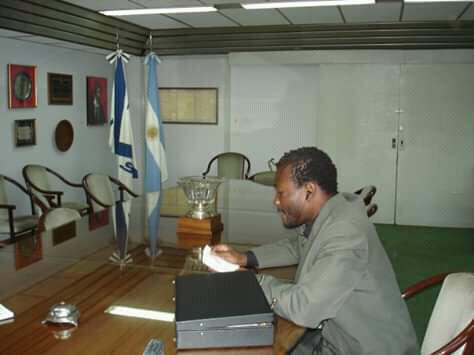
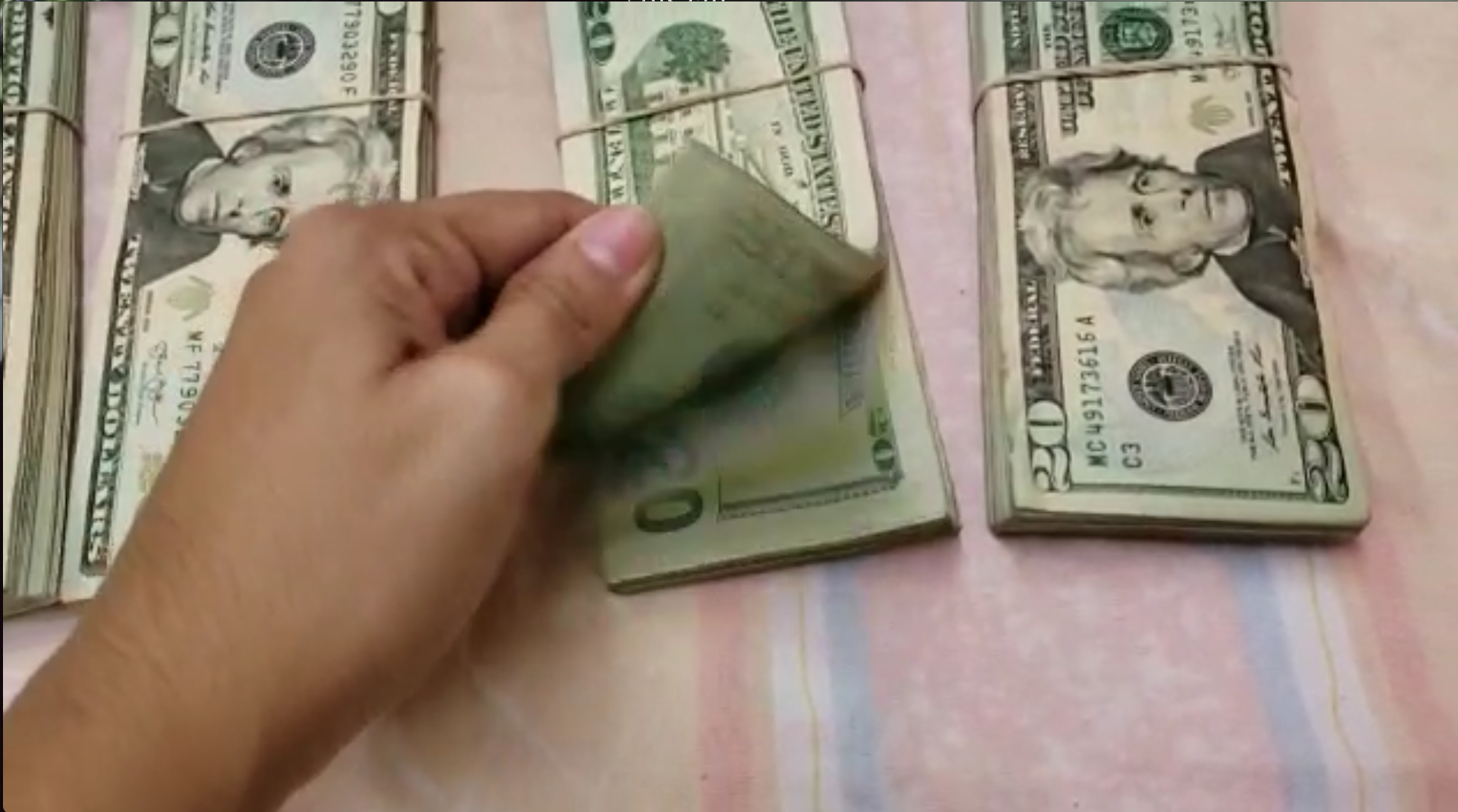
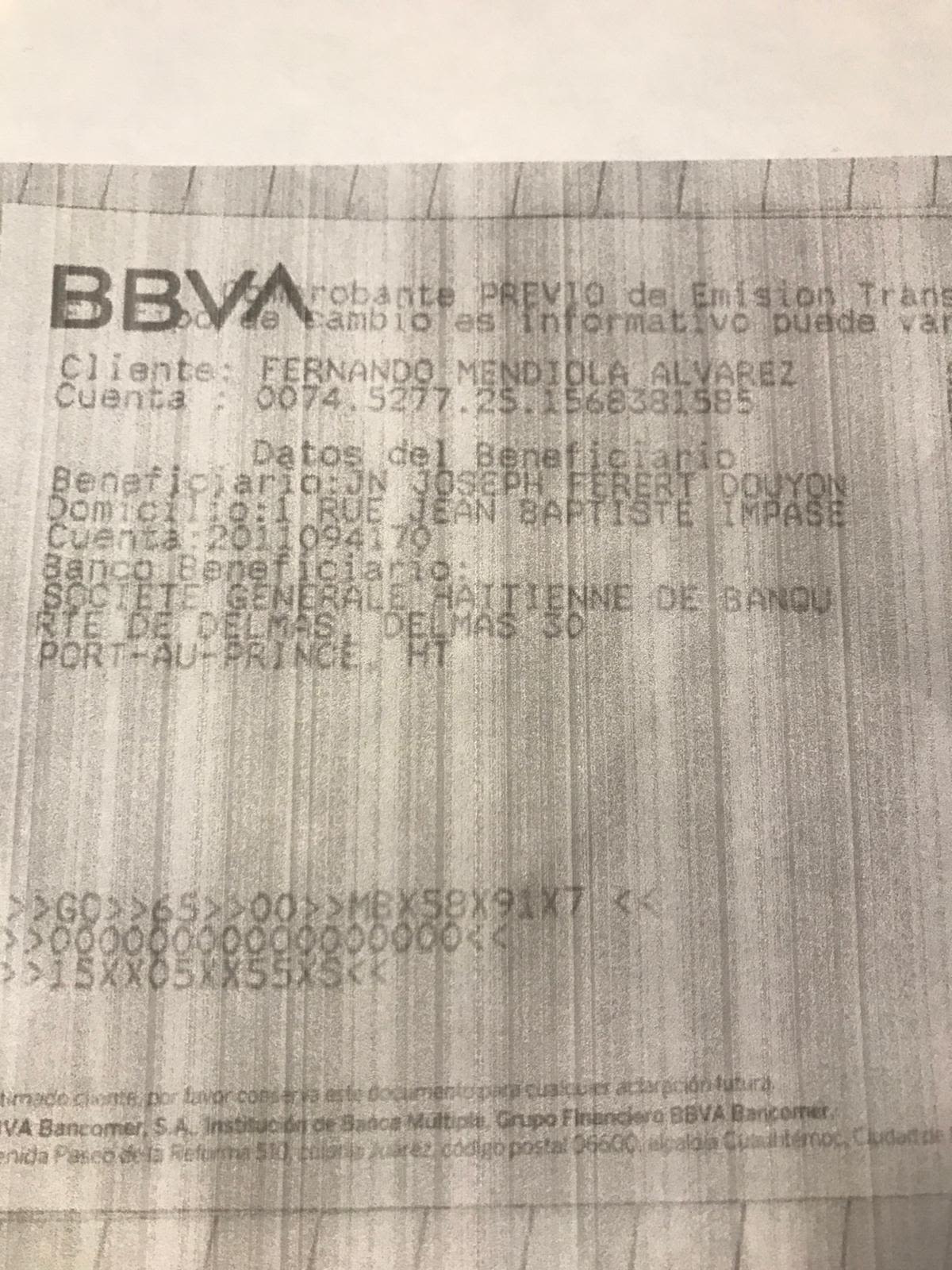
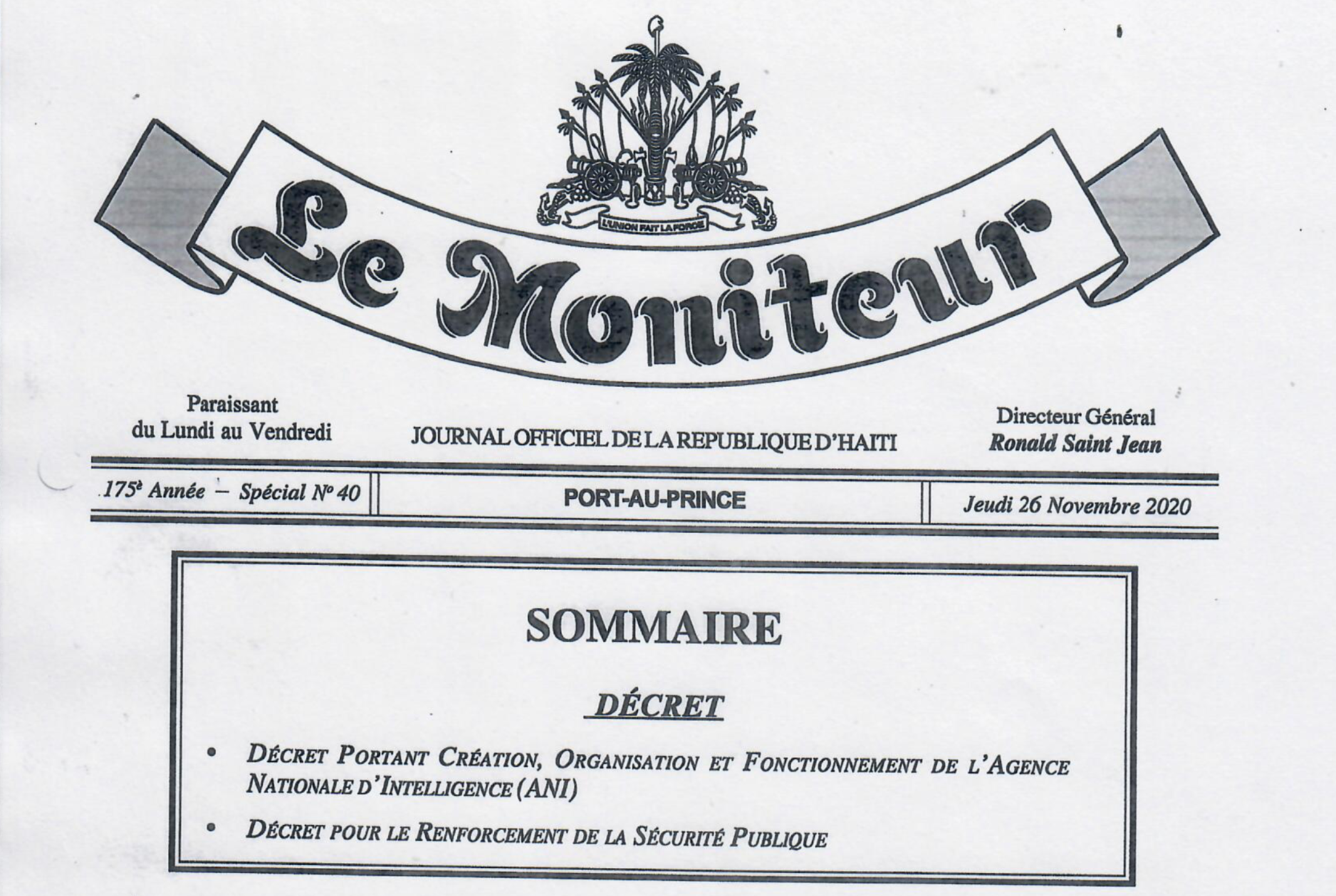
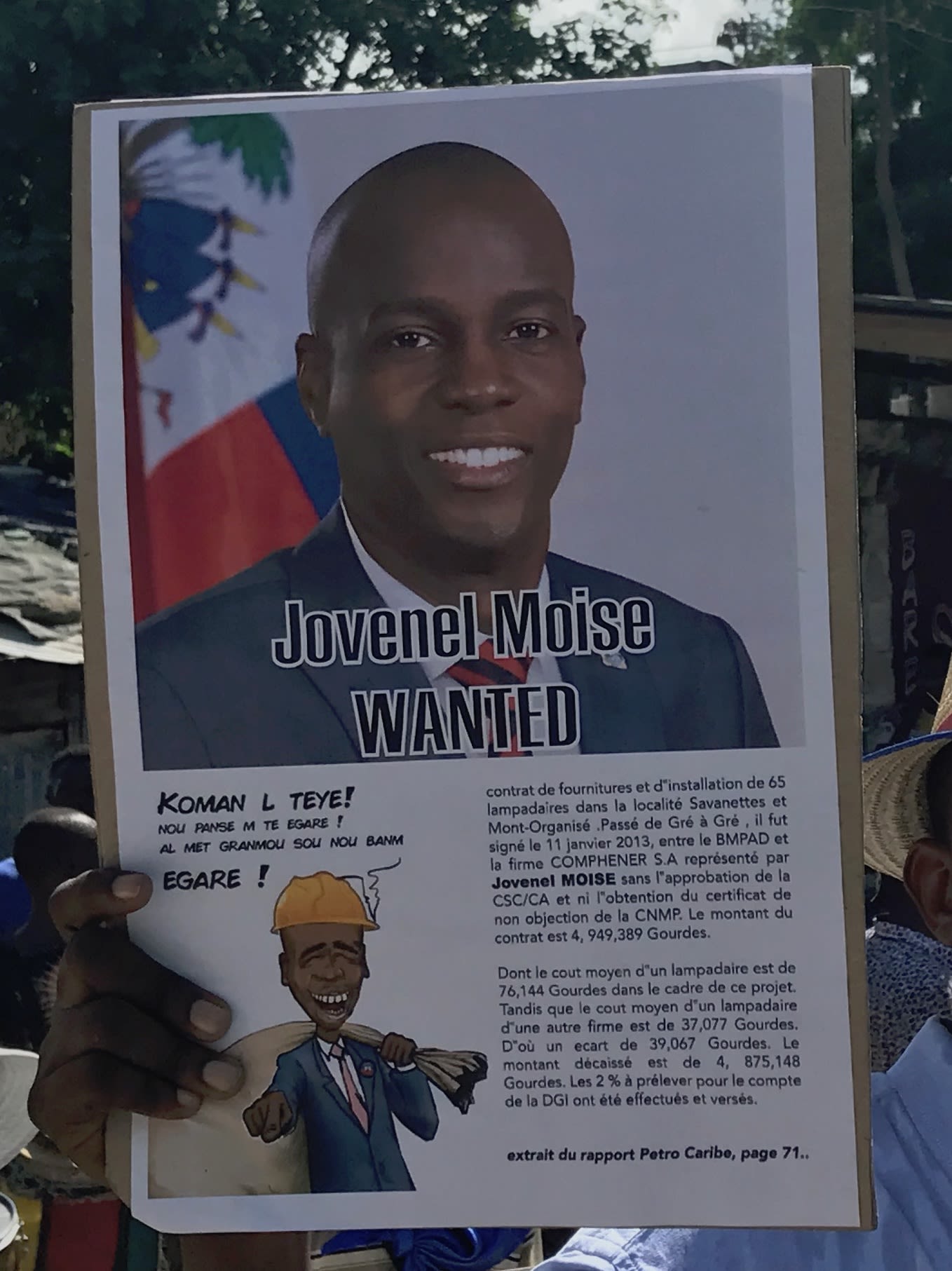
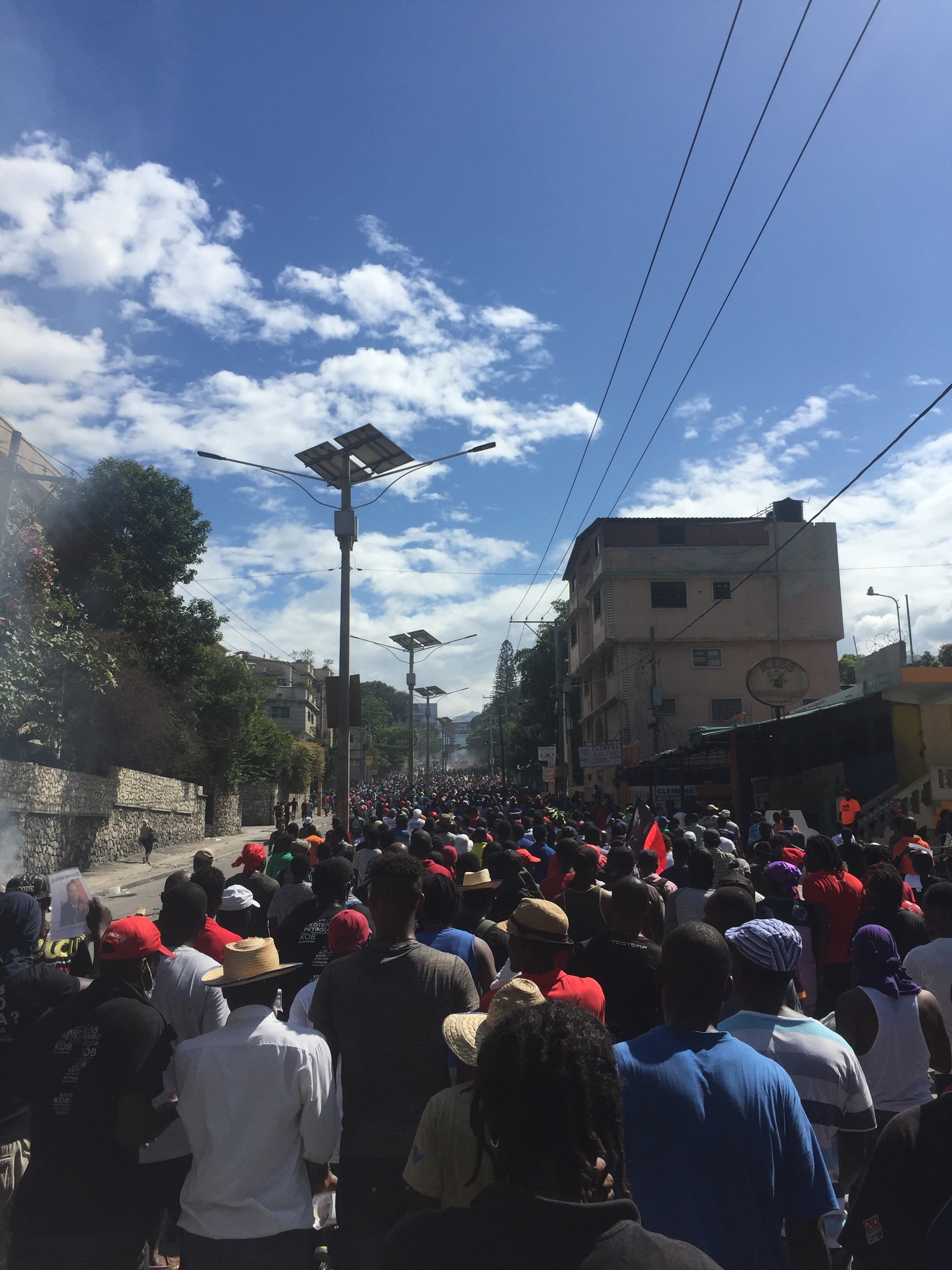
INVESTIGATING PETIT BOIS
As I investigated Markington and the Petit Bois affair, I spoke to a Haitian politician who had received a message in February 2020 from a “Peter White” claiming to work for Dan Whitman. Pressed over his identity, “Peter” said his name was actually Paul Philippe, and sent a picture. It was a picture of Philippe Markington. In May 2020, the politician received an email claiming to be from Whitman, who presented himself as a private advisor to Donald Trump. The next month, another email came, this one explicitly talking about plans for a transitional government. The Haitian politician didn’t buy the story and stopped all communication. Well before Markington had established any connection to those arrested at Petit Bois, he had been fishing around among Haiti’s political class, hoping that someone would take the bait. It remains unclear if Markington truly believed in what he was saying, or if the entire thing was a ruse from the beginning. But, by the fall of 2020, an actual plan had begun to take shape.
The first person to move into the Petit Bois apartments was Mario Beauvoir, the former judicial official; he took up residence there in early October. Whitman, however, never materialized. Nor did the money he was supposed to provide. But, from his jail cell, Markington seemed to have a plan. In a video he sent to a contact in early-October, a woman speaking Spanish, apparently in Mexico, can be seen counting stacks of crisp $100 bills, $15,000 in total. “It is for Philippe Markington,” the woman says in Spanish. On October 7, according to a money transfer confirmation obtained as part of this investigation, $30,000 was transferred from a bank in Veracruz, Mexico to Haiti. The transfer was made to a man named Jean Joseph Ferert Douyon, whose Facebook and LinkedIn profiles identify him as the CEO of a small construction company. (Douyon did not respond to multiple calls and messages seeking comment.)
Douyon received the money and then, according to bank records, transferred nearly $10,000 as a partial (and very late) down payment on the Petit Bois apartments. According to sources consulted for this investigation, that was the only money ever paid for the houses. It is unclear what happened to the remaining $20,000.
According to some of those involved, whose identities are being withheld out of fears of safety, the initial plan involved Wendelle Coq Thélot, a Supreme Court judge and the same person Sanon had mentioned to me in 2019, taking over as provisional president. She had even been given a speech and, together with Beauvoir, had drafted a document outlining the contours of the planned transition. Soon after, however, Coq Thélot apparently had a video call with someone she was expecting to be Daniel Whitman. It wasn’t, and the judge seemed to get spooked. After being in regular contact with Markington for more than a month, she backed out in early November. Beauvoir then approached Judge Dabresil, who moved into the Petit Bois apartments himself along with multiple family members.
In early November, Markington, whose real identity apparently was still unknown to at least most of those involved, sent a 10-point plan for a transition. It included amnesty for officials in the Moïse administration and also reserved at least three ministries to be led by Parti Haïtien Tèt Kale (PHTK) — the party of President Moïse and his predecessor, Michel Martelly. Inside Petit Bois, some believed the government was actively engaged in negotiations for its own peaceful exit from power.
Markington, claiming to be Whitman's emissary and still using a pseudonym, began to tell contacts that he was in touch with the president’s security officials. On November 15, records show, the Haitian cell phone registered to Markington received a call from Jean Laguel Civil, the president’s security coordinator. The next day, records show a five-minute call between Markington and a phone registered to Dimitri Herard. Around this same time, the meetings at the Petit Bois complex multiplied; more prominent figures began to show up, including members of the Haitian police.
Meanwhile, the government was implementing a major personnel shake up. On November 16, Moïse appointed a new police chief, Leon Charles, who had been serving in Washington as the country’s ambassador to the OAS. While there, he had helped ensure continued diplomatic support for Moïse even after he began ruling by decree the year prior. The changes reflected the growing influence within the government of Laurent Lamothe, the former prime minister under Martelly. Charles made multiple visits to the Petit Bois complex soon after taking the position. The Moïse administration, however, already had their eyes on Petit Bois.
In late November, facing continued and widespread protests, Moïse issued a presidential decree that expanded the definition of terrorism to include common civil disobedience tactics and created a new intelligence agency that would respond directly to the executive branch. According to multiple sources, the driving force behind this new agency was, again, Lamothe. When he had been prime minister, he had desperately wanted to establish a new intelligence agency. He had even created an informal body within the police, but responsive primarily to the prime minister’s office, that functioned as an intelligence agency. The man he tasked with leading the effort had been Leon Charles. Now, years later, with the Agence Nationale d’Intelligence (ANI) formalized and Charles serving as police chief, it seemed that Lamothe finally had what he was looking for. A plot against the president provided the perfect justification.
Around the same time, Rony Colin, a businessman and former mayor of the municipality of Croix du Bouquet, came to the Petit Bois apartments for a meeting. According to a source who was there, Colin told them that the Moïse administration was aware of the plan and was not going to go along with it. (Colin did not respond to a request for comment for this article.) The US Embassy was also aware of what was taking place. In early December, a Haitian government official, who had been approached by Mario Beauvoir, said he had alerted the embassy that there was a group claiming US support for arresting Moïse. But the Petit Bois plan went forward undeterred.
As the calendar turned to 2021, the political and security situation on the ground in Haiti was reaching a breaking point. Groups of armed civilians, operating under an alliance called the "G9" and led by a former Haitian police officer, Jimmy Cherizier, had seized control over large tracts of the capital. Kidnappings were skyrocketing. Over the previous two-plus years, human rights organizations had documented more than a half-dozen massacres, resulting in hundreds of deaths. And, they alleged, the G9 was receiving support from high-level government officials. The United States sanctioned Cherizier, as well as two ministers in Moïse’s administration, for their alleged involvement in the deaths. The economy was cratering. Years of protests, and an opposition-led program of Peyi Lok — country lock — had effectively shut down most commerce. On top of all this, the Haitian National Police was collapsing due to its increasing politicization. A group of disgruntled cops had begun taking to the streets themselves in protest, often marching side by side with armed civilians. Many officers, including Herard, had started lucrative side gigs to provide private security.
In January, the president issued a direct warning, not to those parties responsible for the massacres, but to his political opponents who he alleged were behind every protest. The new intelligence agency had been the subject of intense criticism, but a defiant Moïse claimed that it was already operational. “We have already started to monitor a lot of things in the country,” he told the press on January 19. He said the government had created the new intelligence agency in order to monitor the “vagabonds” in the country. “When someone uses their money to destabilize the country, it is terrorism,” the president said. “We are watching you, we will come for you,” he threatened.
Those involved with Petit Bois, however, seemed to believe their plan had official support. According to the testimony of some of those arrested, the Haitian police actually provided security at the apartment complex for nearly a month in the lead up to February 7. And in late December the group was approached by Edouard Ambroise, who presented himself as an advisor to the president. There is no evidence he was. In fact, before joining with those in Petit Bois, he had been actively involved with Sanon for months. Sanon too had been hoping to replace the president come February 7, but, in the final months, his own efforts were pushed aside in favor of the Petit Bois plan. Ambroise had his hands in both efforts.
On February 5, Dimitri Herard recorded a conversation with the police inspector involved in Petit Bois:
Inspector Gauthier: Hello?
Herard: Sorry, Inspector, there were people with me so I couldn’t answer.
IG: Oh okay, I thought that might be the case. Listen I needed you, do you know of a certain Edouard Ambroise? I’ve been told he’s a friend of [Civil].
Herard: Okay, a friend of Commandant Civil.
IG: Yes, I’ve been told he has an access card to the palace already. I’ve been told that he will be the one making the connection between you and I.
Ambroise's involvement hints at the overlap between the two parallel efforts to replace Moïse. He was one of the first people that Markington, the man impersonating the State Department officer from his jail cell, spoke to after the arrests at Petit Bois. Five months later, he was in touch with key suspects in the immediate aftermath of the president's killing. Ambroise, however, was not the only actor connected to the assassination and those arrested at Petit Bois.
THE MISSING LINK
Altogether, 18 people were arrested on February 7, 2021. There was Judge Dabrésil, as well as three of his cousins, his driver, and two of his security agents; there were the Gauthier sisters, and Marie Antoinette’s husband, the agronomist Louis Buteau; two employees of the Petit Bois complex; two small-time opposition politicians; two members of the Haitian police, both of whom worked for the prison division; Chantal Saintime, who had signed the lease agreement; and, finally, her 21-year-old daughter, Hija Djenicka Philippe, whom she had had with Philippe Markington. The police seized seven guns, most of which apparently belonged to the police officers and security guards staying there.
The whole Petit Bois affair was interpreted by supporters of Moïse as a bloody coup attempt that proved that the president’s opponents were hell bent on overthrowing or even killing him, and, on the other hand, as a sordid set-up, a plot to entrap political opponents that showed the extent to which the president would go to hang on to power. A meme began flying around on social media with people posting regular household items with the caption: "coup d’etat." “You don’t lead a coup with four old rifles,” an opposition leader declared.
Those arrested were accused of participating in a “conspiracy against the internal security of the state,” a legal term that had only really ever been applied by the Duvalier dictatorship. And, to many in Haiti, that’s what things were beginning to look like. Moïse had been ruling by decree for over a year, the terms of parliament having expired in January 2020. After February 7, he fired and replaced three Supreme Court judges — Coq Thélot, Dabresil, and a third judge, Joseph Mécène Jean-Louis, whom some in the opposition had recognized as president. Moïse had consolidated power in the executive, created a new intelligence agency, and was openly talking about reforming the constitution through a national referendum. The last time that had happened was, once again, under Duvalier, when he declared himself president for life. Many expected the government to use the Petit Bois affair as the basis for a widespread crackdown on political opponents.
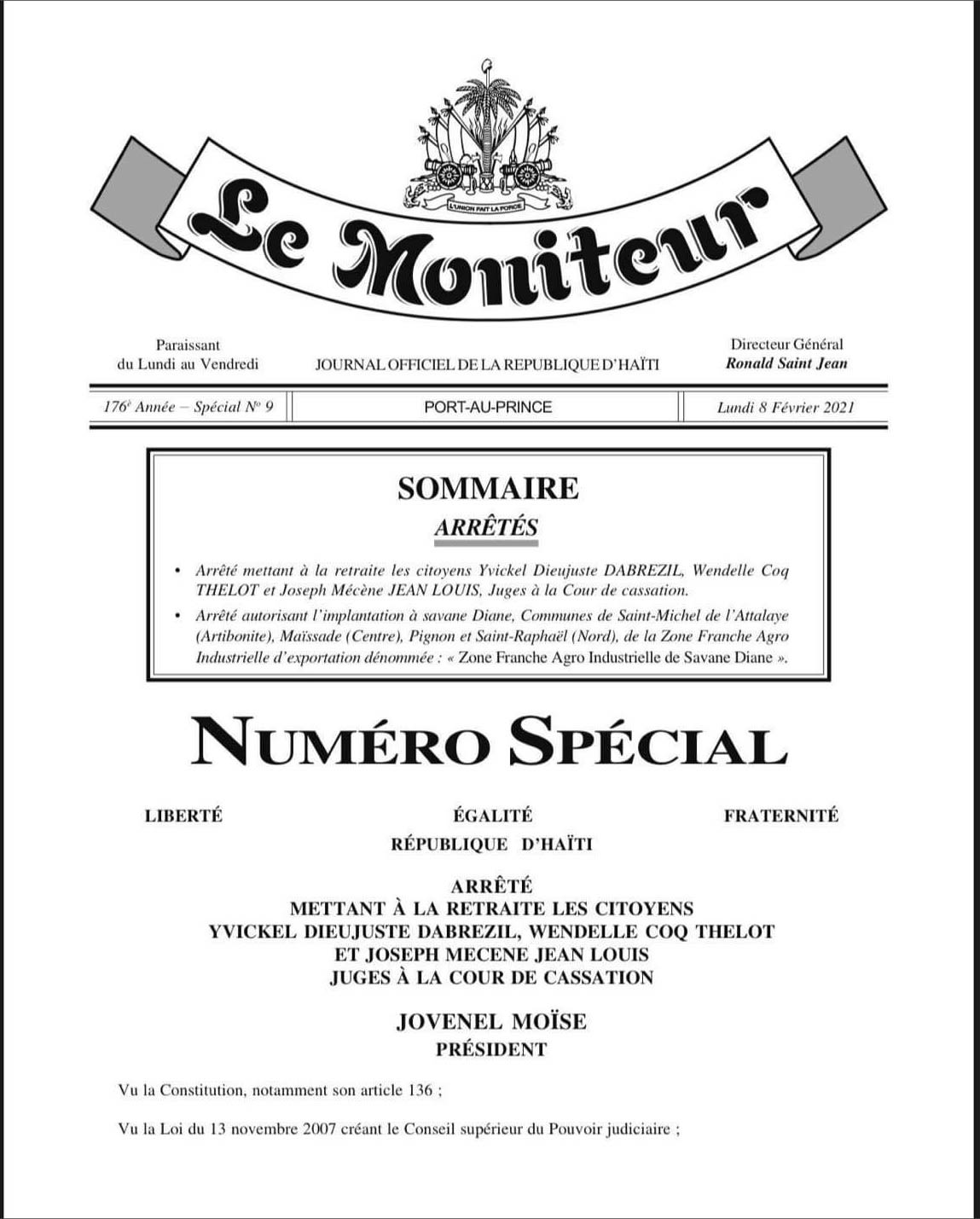
Le Moniteur from February 8, 2021 where Moïse decrees the retirement of three supreme court judges.
Le Moniteur from February 8, 2021 where Moïse decrees the retirement of three supreme court judges.
But the investigation into Petit Bois went nowhere. Judge Dabresil was released from jail within a few days, his arrest ruled illegal. By the end of March, 16 of the 17 others were also released. It was quite clear that none of them had been calling the shots. They had been played, convinced by a smooth-talker claiming to have the support of the United States government. Even the president’s own top security officers were in on it, they had been led to believe. None of those individuals arrested were planning a bloody coup d’etat. There was no military force ready to storm the palace and seize power. They did, however, truly seem to believe that a peaceful transfer of power was not only possible but necessary for Haiti's future. Of course, they were wrong, and they ended up taking the fall. But the question remained: who was pulling the strings behind it all?
If Whitman was the ringleader, and Whitman was actually Markington, was the entire thing organized out of a jail cell in the Haitian capital? And if so, certainly it couldn’t have been done alone. Markington has a reputation as a talker, but it is hard to imagine that he had dreamed up this entire plot on his own. He had spent months on the phone from prison using multiple numbers. At the very least, someone would have had to pay for all those cell phone minutes.
Instead of the judicial police taking the lead in the investigation, Moïse gave the task to his own security forces, mainly to Dimitri Herard and Jean Laguel Civil, both of whom had been actively engaged with those arrested — and with Markington — since at least November 2020. If the Petit Bois plan ever represented a real threat to the president, it would only have been because both Herard and Civil were part of it.
Five months to the day after Moïse praised his security chiefs for disrupting this coup plot, he was assassinated, shot 12 times in his bedroom. Both Herard and Civil are now in jail, accused of, at the very least, negligence in allowing the president’s assassination to take place. According to the preliminary investigation conducted by the Haitian police, Civil allegedly had at least $80,000 to distribute to palace security the day of the attack while Herard provided arms, ammunition, and other supplies to the Colombian mercenaries accused of carrying out the assassination. Both have denied the allegations.
After the assassination, it was impossible not to think back to Petit Bois. What had really happened? Had Herard and Civil actually been serious about turning on the president? Why didn't they go through with it? Who was behind Markington? I was reminded of something a source had told me just days after the Petit Bois arrests. They had told me that there wasn’t simply one plan. No, they explained, there was also a plan being organized in Delmas 60, and even another one coming out of the Dominican Republic. “All of them are being manipulated by the same people,” the source had said.
Christian Sanon had been arrested at a home in Delmas 60 two days after the assassination. He hadn’t fled. He didn’t go into hiding. He was a sitting duck, just like those arrested in Petit Bois. Had Sanon been manipulated by the same people?
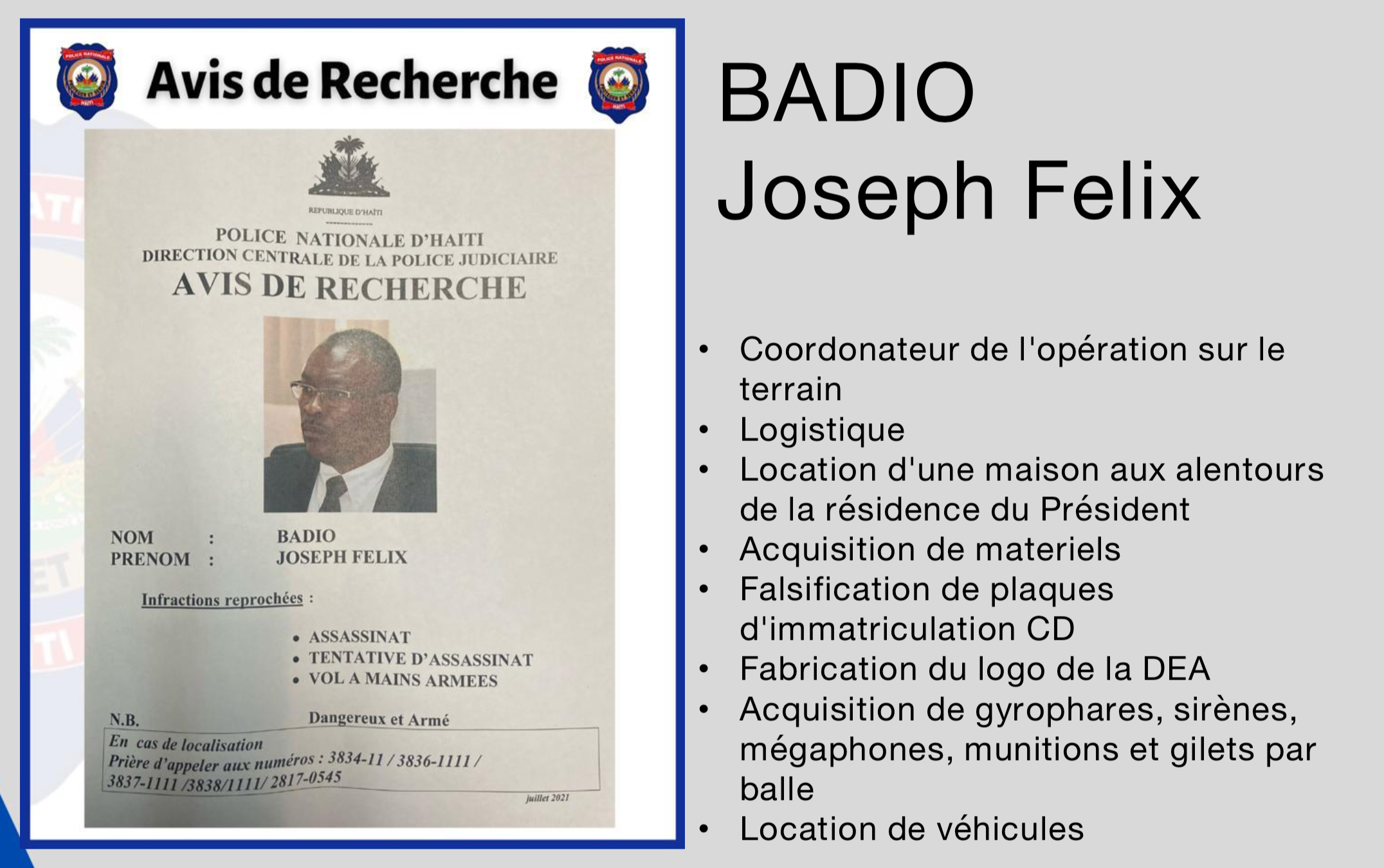
Slide from Haitian National Police presentation showing wanted poster for Joseph Felix Badio.
Slide from Haitian National Police presentation showing wanted poster for Joseph Felix Badio.
A week after the assassination, the Haitian police issued an arrest warrant for Joseph Felix Badio, a longtime mid-level official at the Ministry of Justice who more recently had been working for the country’s anti-corruption unit, the ULCC. Badio, a tall, slender figure with a faint mustache, is considered a key figure in the plot. The Colombian police reported that it was Badio (and not Sanon) who changed the mission and ordered the Colombian mercenaries to take out the president rather than attempt to arrest him. Some of those detained apparently told investigators that it had been Badio who, the night of the assassination, gave word that the operation was a go. He had even rented an apartment close to the president’s home and had been keeping tabs on him for many months. The Haitian police said that Badio had been fired from his position at the ULCC in May, but failed to provide any specific reason.
Could his firing provide answers? A few weeks later, a journalist sent me a letter from ULCC that explained why Badio had been fired. According to that document, the authenticity of which was confirmed by the head of the ULCC, it resulted from of an accusation that Badio had solicited a $30,000 bribe from an inmate with a promise to get them out of jail.
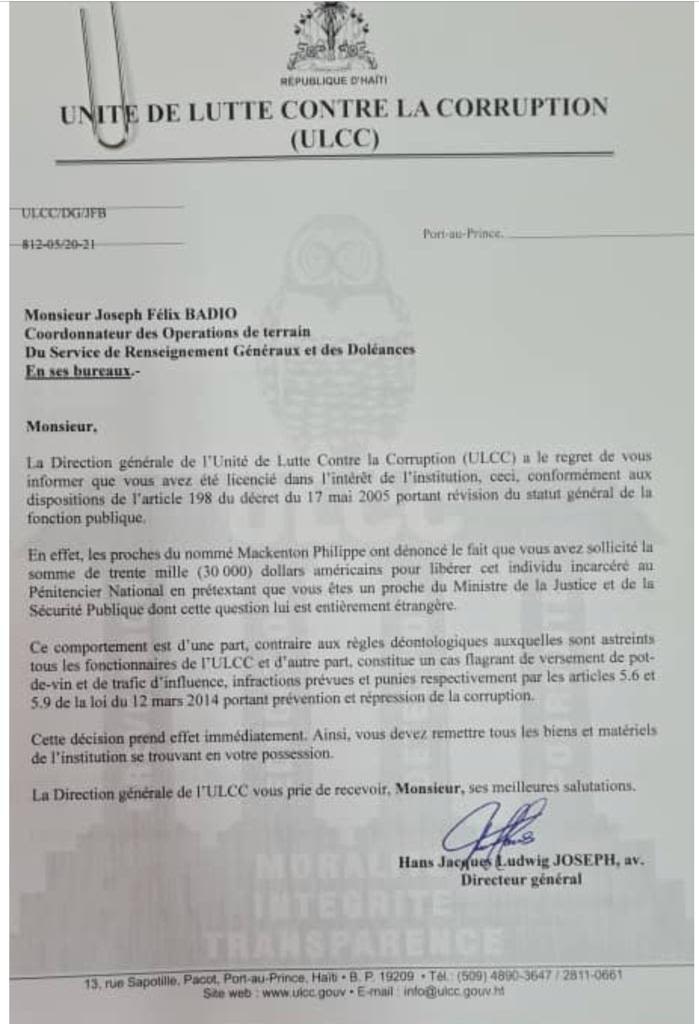
Document from anti-corruption unit providing the reason for Badio's dismissal: an allegation that he had solicited a $30,000 bribe in exchange for releasing a "Mackenton Philippe" from jail.
Document from anti-corruption unit providing the reason for Badio's dismissal: an allegation that he had solicited a $30,000 bribe in exchange for releasing a "Mackenton Philippe" from jail.
According to that document, the inmate was "Mackenton Philippe," a different spelling of Markington, the man impersonating Whitman from his jail cell, the man who had facilitated a $30,000 money transfer from Mexico. According to sources consulted as part of this investigation, Badio is a close contact of John Joseph Ferert Douyon, the individual who received the $30,000 transfer from Mexico.
It wasn’t the only connection. Badio’s name had come up before, the morning of February 7. “I’m hearing the name of [Joseph Felix] Badio…who led them to believe State Department was supporting the idea,” a contact messaged me that day. Multiple sources who have known Badio for years said he had long claimed ties to the FBI and DEA, though they doubted it was true. After decades working in government, he was extremely well connected across the political spectrum. The Miami Herald later reported that Moïse had even been considering Badio for a high-level position within his government.
Was it Badio that manipulated Markington? Did that explain the $30,000 transfer from Mexico? Did Badio put him up to it all with a promise to help get him out of jail? Badio had been in direct communication with Markington since at least early August 2020, before Markington had even made a connection with the Gauthiers or anyone else eventually arrested in Petit Bois. Badio’s name, however, never came up publicly at the time.
Markington’s relationship to those arrested at Petit Bois, or to Badio, would have been an easy connection for Haitian police investigators to make. A cursory review of phone records would identify his role in the affair. I can confirm that Haitian police had that information. Further, Markington himself made multiple calls to the police the morning of the arrests from a cell phone registered in his name. The other individual who had seemingly been involved from day one was Mario Beauvoir, the former government commissioner who had skipped town the day of the arrests. The police never even issued an arrest warrant for him.
It was as if the authorities had no intention of actually investigating. Why? And, if a real investigation had occurred, would the president have ended up dead?
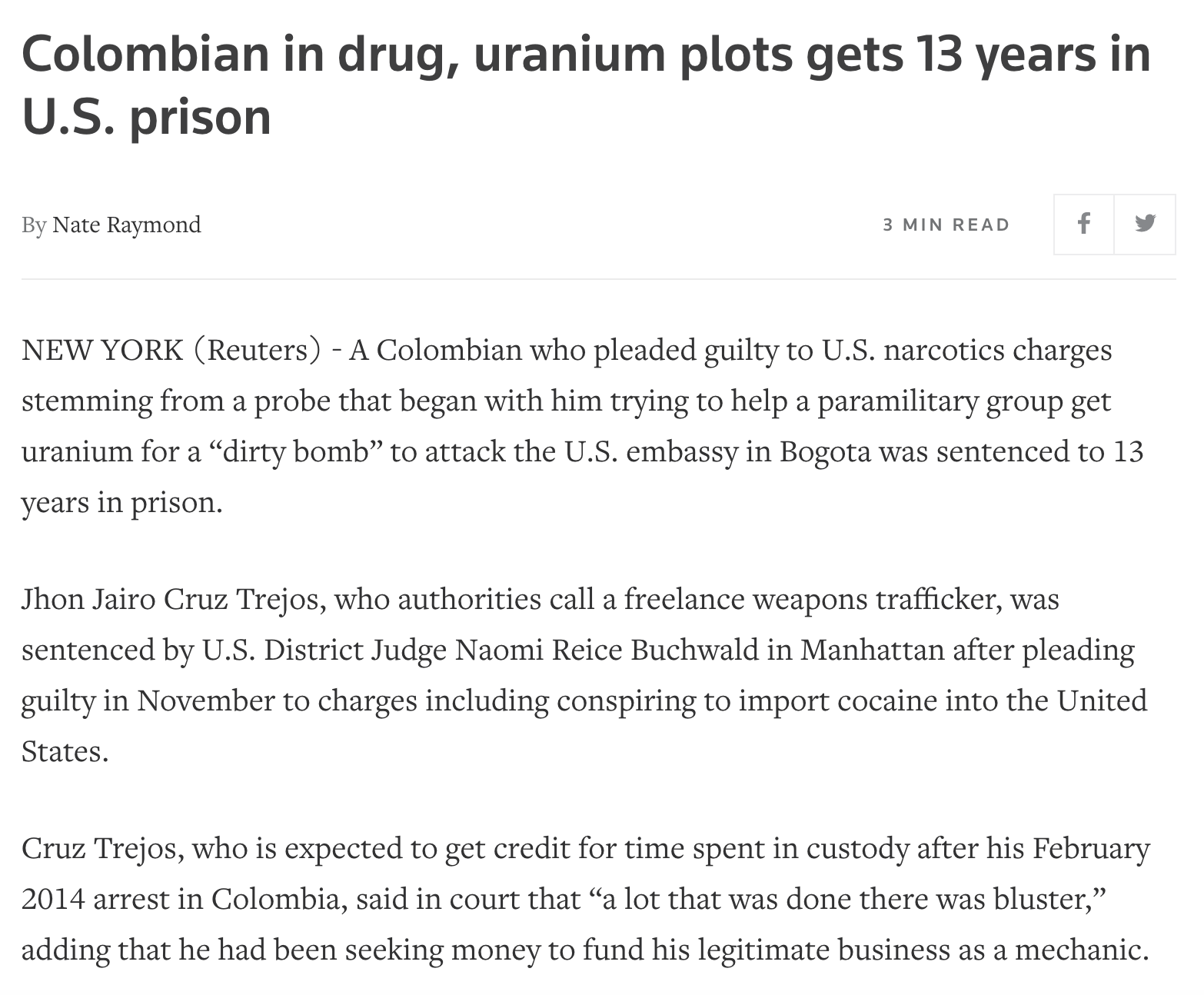
April 4, 2016 Reuters article detailing the drug and uranium scheme.
April 4, 2016 Reuters article detailing the drug and uranium scheme.
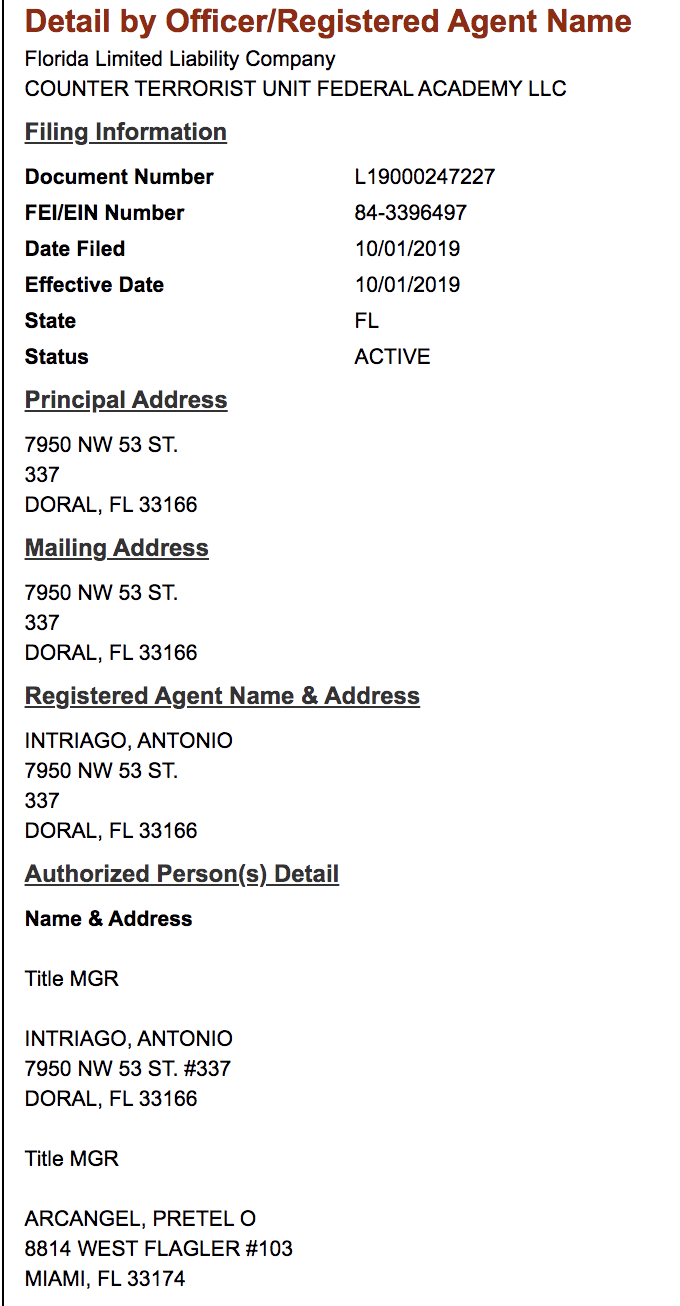
Florida business registration for Counter Terrorism Unit Federal Academy LLC. The company was created in 2019 with two managers listed: Antonio Intriago and Pretel O. Arcangel. Intriago, through his lawyers, claims that Pretel had a working relationship with the FBI.
Florida business registration for Counter Terrorism Unit Federal Academy LLC. The company was created in 2019 with two managers listed: Antonio Intriago and Pretel O. Arcangel. Intriago, through his lawyers, claims that Pretel had a working relationship with the FBI.
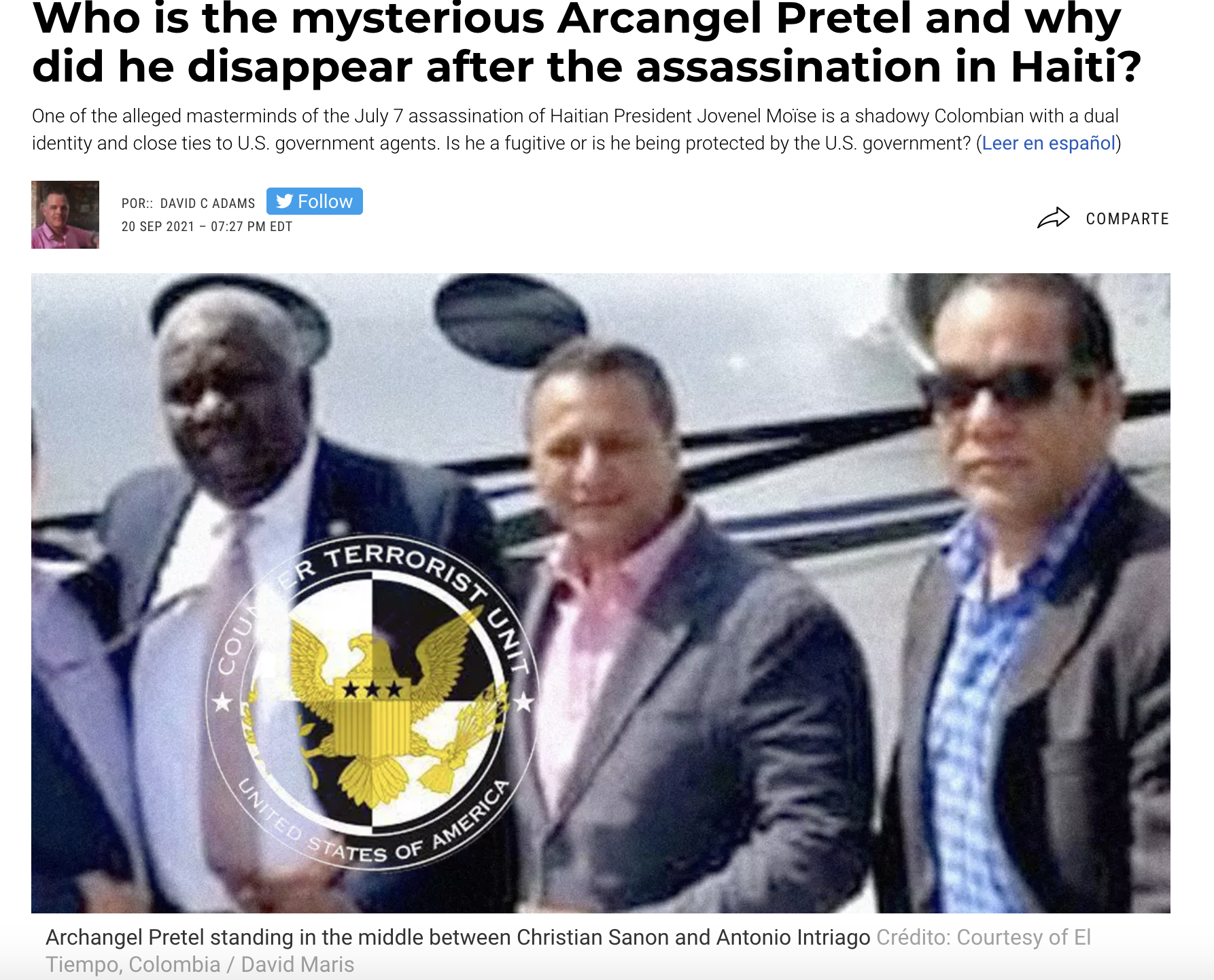
September 20, 2021 Univision article about Arcangel Pretel.
September 20, 2021 Univision article about Arcangel Pretel.
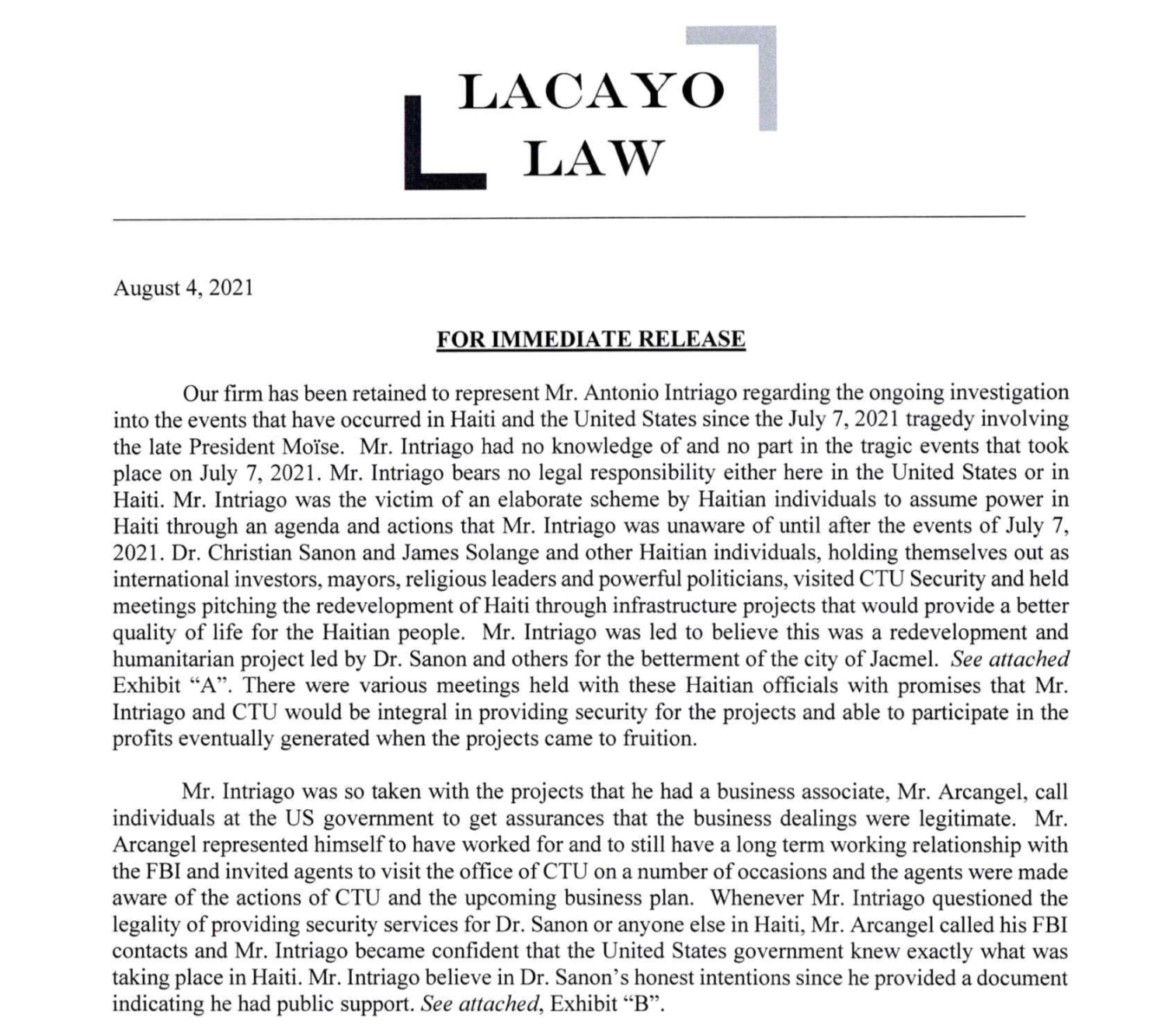
Letter from lawyer of CTU Security alleging that Arcángel Pretel presented himself as having a longstanding relationship with the FBI.
Letter from lawyer of CTU Security alleging that Arcángel Pretel presented himself as having a longstanding relationship with the FBI.
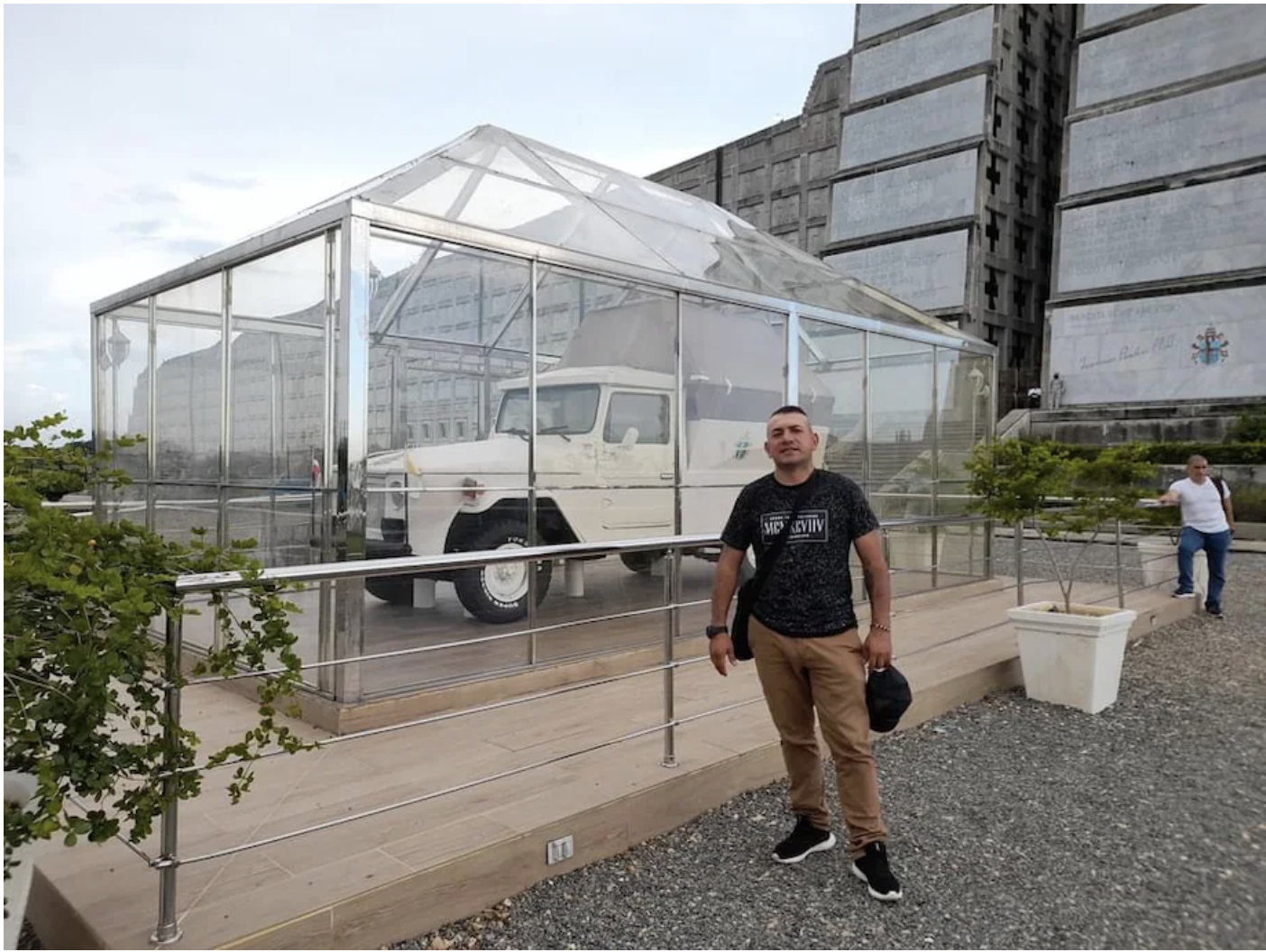
Photo of one of the Colombian former soldiers in the Dominican Republic, posted on Facebook.
Photo of one of the Colombian former soldiers in the Dominican Republic, posted on Facebook.
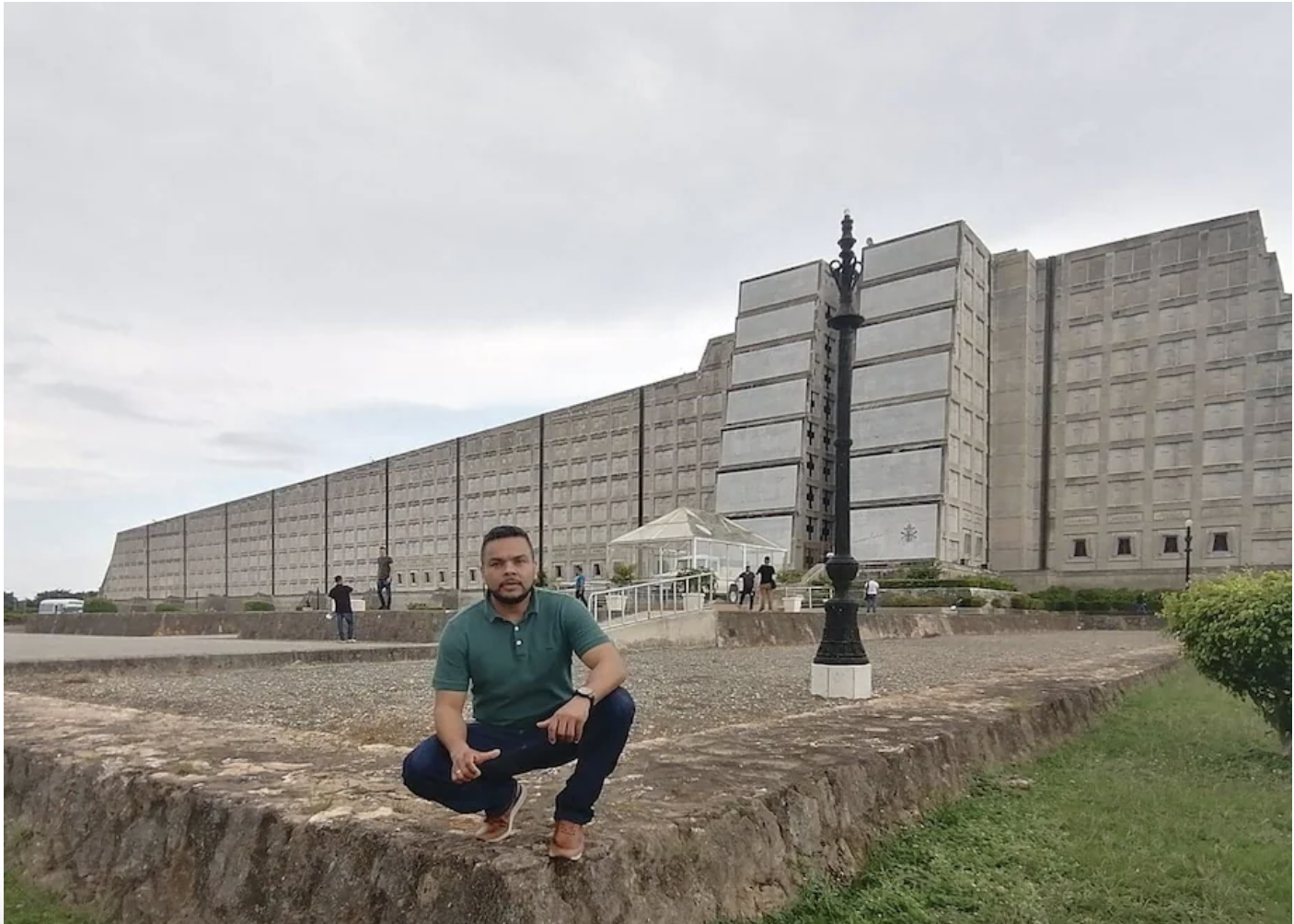
Photo of one of the Colombian former soldiers in the Dominican Republic posted on Facebook.
Photo of one of the Colombian former soldiers in the Dominican Republic posted on Facebook.
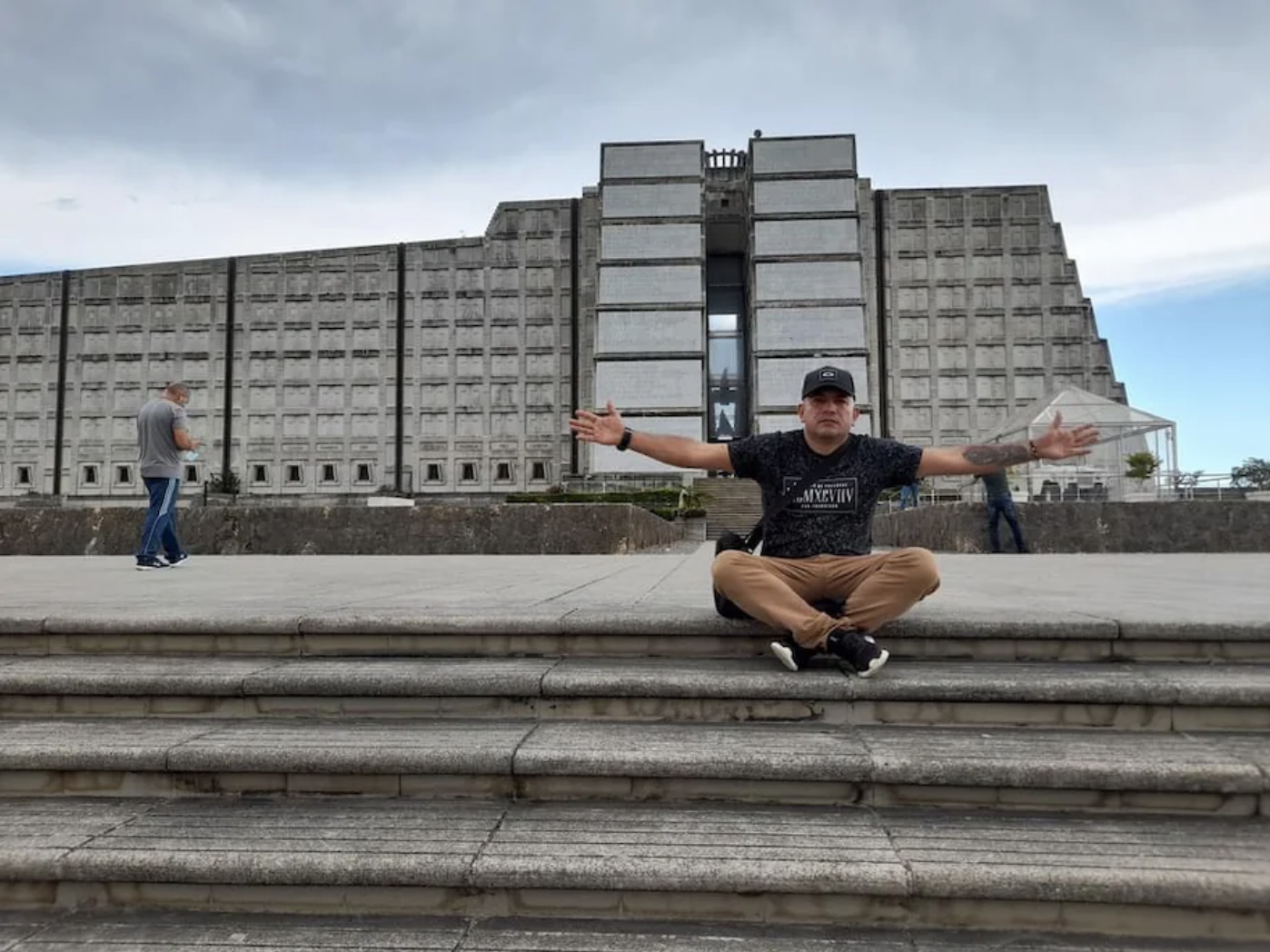
Photo of one of the Colombian former soldiers in the Dominican Republic posted on Facebook.
Photo of one of the Colombian former soldiers in the Dominican Republic posted on Facebook.
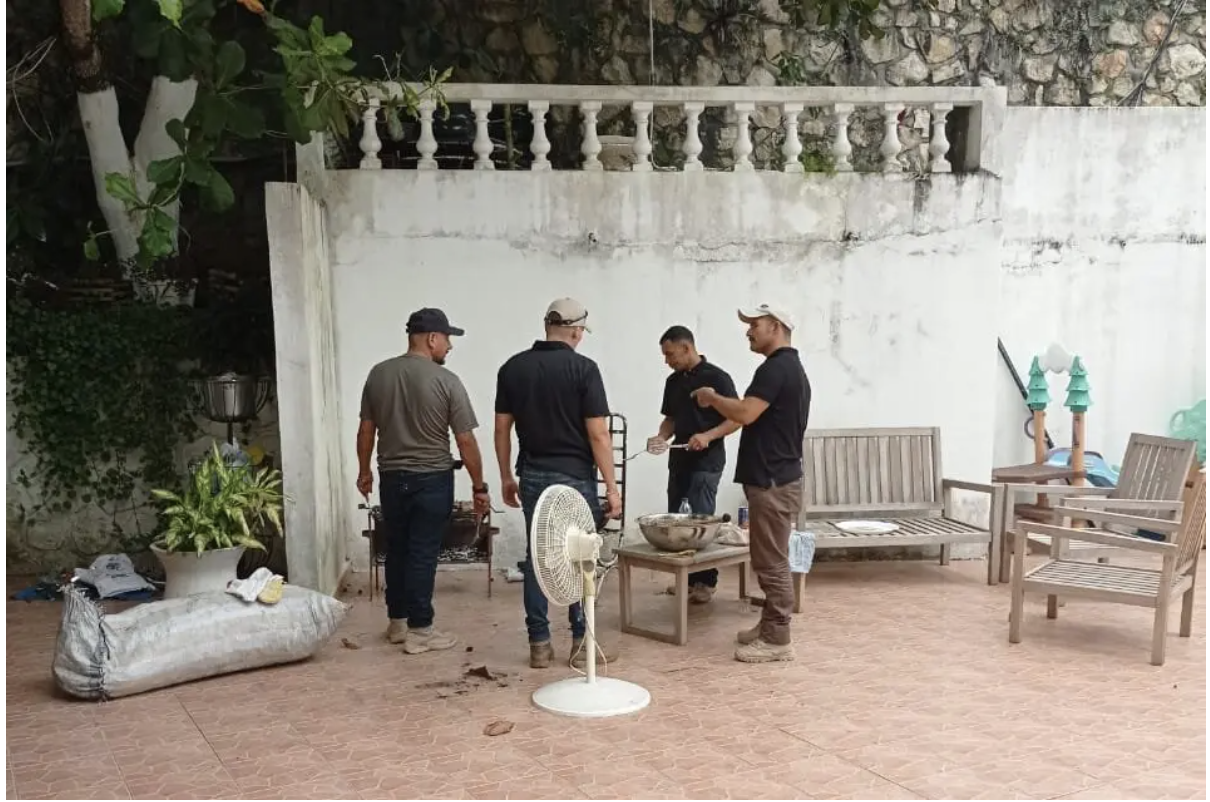
Four of the retired Colombian military officers arrested in Haiti can be seen cooking at the location they stayed in Port-au-Prince.
Four of the retired Colombian military officers arrested in Haiti can be seen cooking at the location they stayed in Port-au-Prince.
THE PLOT
In 2016, a Colombian arms trafficker was sentenced to 13 years in US prison for allegedly brokering a cocaine for guns deal that also included obtaining highly enriched uranium destined for Colombian rebel groups and maybe even the Venezuelan government. It was a big story, one that, according to the US government, showed the clear desire on the part of these criminal actors to commit acts of terror against the United States. However, there was never any uranium. In fact, the plot had begun back in 2009, and, from the very beginning it had been an FBI-led sting operation. When, in 2013, after continued prodding by FBI informants, the Colombian sent a small amount of cocaine to the United States thinking he would receive a shipment of high-powered weapons in return, he was arrested. It is a common FBI tactic that often generates splashy headlines of "terror averted." But once the details emerge, it mostly looks like entrapment — similar to Petit Bois.
The confidential FBI informant at the center of this high-profile “uranium” plot was Arcángel Pretel Ortíz, according to lawyers representing the Colombian family of a co-defendant in the case who died in a US prison. Pretel would later become an associate of CTU Security, the firm that hired the Colombian mercenaries. In addition to working as an FBI informant in Colombia, Pretel also worked as a trainer for the Colombian military’s elite antidrug unit, known as the Bloque de Búsqueda. It was during that job when he first met at least some of the men who would eventually find themselves sitting in a Haitian prison, accused of assassinating the president. The job in Haiti wasn’t Pretel’s first with his old friends. In late 2020, Pretel, Antonio Intriago, the owner of CTU Security; and Germán Rivera García, reportedly the leader of the Colombian mercenaries, traveled to Bolivia. According to authorities there, the three had been contacted about a plan to assassinate Luis Arce, then a presidential candidate in upcoming elections, by officials who had seized power following a coup the year prior. Arce ended up winning the vote handily, and any plans for his assassination were scrapped.

Florida business registration for Counter Terrorism Unit Federal Academy LLC. The company was created in 2019 with two managers listed: Antonio Intriago and Pretel O. Arcangel. Intriago, through his lawyers, claims that Pretel had a working relationship with the FBI.
García, who went by the nickname “Colonel Mike,” told Haitian investigators that Pretel, whom he had known for 15 years, contacted him in February or March of 2021 with an offer for more work, this time in Haiti. He apparently made no mention of his trip to Bolivia. García eventually learned the job in Haiti was to provide security for a pastor named Christian Emmanuel Sanon.
By then, Sanon had been talking about his connections and support inside the US government for at least two years. He had convinced quite a few. Sanon had been having regular meetings with a group of individuals from various backgrounds, talking about grand plans to redevelop Haiti and restore good governance. Given COVID-19, they were held on Zoom. One frequent attendee, an American woman named Helen Manich, often introduced herself as working for the US government, according to one participant. It wouldn’t have been the first time she had claimed such a tie. Another source, who had known the woman for years, recounted an interaction with her in which she claimed to work for US intelligence.
In early 2021, James Solage, a Haitian-American living in Florida at the time, received a phone call from Sanon, whom he claims to have only recently met through a mutual acquaintance. Sanon said he had just come from a meeting with the State Department, who had chosen him to be the next president of Haiti, Solage told Haitian investigators. Sanon asked him to help, and Solage says he was the one to find CTU Security. His testimony is filled with references to US support. Solage attended multiple meetings at the security firm’s office, including one with Sanon, a former Haitian senator, a Haitian mayor, and three individuals who, he claims, introduced themselves as FBI agents.
After the arrests, the lawyers for Intriago, the CEO of CTU Security and Arcángel Pretel’s partner, released a long letter defending their client. It states that Sanon had pitched the firm on “redevelopment of Haiti through infrastructure projects,” and denies that their client had any knowledge of the assassination. But the letter also claims that Intriago believed his actions had the full support of the US government. Arcángel Pretel “represented himself” as having a “long-term working relationship” with the FBI and had invited agents to the CTU offices on multiple occasions, the letter states.

Letter from lawyer of CTU Security alleging that Arcángel Pretel presented himself as having a longstanding relationship with the FBI.
“Whenever Mr. Intriago questioned the legality of providing security services for Dr. Sanon or anyone else in Haiti, Mr. Arcángel called his FBI contacts and Mr. Intriago became confident that the United States government knew exactly what was taking place in Haiti,” the lawyers write.
Wherever you look, the individuals alleged to have been involved in the assassination of the president seem to believe their actions had US support. Even the former Colombian military officers were led to believe their new job was backed by the State Department. It mirrors the case of Petit Bois almost perfectly, except this time a number of key players seem to actually have confirmed ties to US agencies. It wasn’t just Arcángel Pretel.
Joseph Vincent, a long-time DEA informant, arrived in Haiti in early January. A Haitian-American, he had been arrested in Florida for passport fraud in 1999. He began working with the agency soon after. According to police documents, Vincent told Haitian investigators that, after landing in Haiti, he had been contacted by a man named Bob Balthazar, who, he says, worked for the US State Department. Balthazar told him to talk to Christian Sanon about a plan for a transitional government. When he spoke with Sanon, the pastor told Vincent of his plans to become prime minister. Vincent says the plan was to take power legally, after the end of Moïse’s constitutional mandate, which, many believed, was February 7, 2021, the day of the Petit Bois arrests. Vincent, through his lawyer, maintains that he only ever traveled to Haiti on official US government business.
Bob Balthazar is a well-known figure in certain Haitian circles. He is someone who has long claimed to have ties to the US government. True or not, the perception in Haiti is that Balthazar is connected, and he seems to have made much of his career out of furthering that perception. “He knows everybody who is anybody in Haiti, in politics, business and the National Police Force,” one contact, who has known him for decades, said. Balthazar is also a known associate of Helen Manich, the woman who had attended Sanon’s planning meetings and had also long claimed to work for the US government. Sanon told Haitian investigators that it had been Balthazar who put him in touch with John Joel Joseph, a former Haitian senator who had attended meetings at the Florida-based security firm’s offices and rented the cars used by the Colombians the night of the assassination. Joseph was arrested in Jamaica in mid-January. Balthazar did not respond to repeated messages asking for a comment.
In early May, there was a meeting in the Fort Lauderdale conference room of Worldwide Capital, a small lending firm run by a wealthy Ecuadorian. The company agreed to raise funds for Sanon’s grandiose redevelopment plans. Present at the meeting, according to a photo later released by the Haitian police, were Sanon; Solage; former senator Joseph; as well as the partners of CTU Security, Intriago and Arcángel Pretel. A few weeks later, Sanon and his new partners from Worldwide and CTU arrived in Haiti on a private jet. They spent their time between the Maxime Boutique hotel in Petionville and a private residence in Delmas 60, where Sanon began to hold regular political meetings.

Photo of one of the Colombian former soldiers in the Dominican Republic, posted on Facebook.

Photo of one of the Colombian former soldiers in the Dominican Republic posted on Facebook.
At that point, the first group of four Colombians were already in Haiti, including Rivera García, the soldier who had initially been contacted by their old friend Pretel. In early June, a second group consisting of 20 Colombians entered Haiti. They had first flown to the Dominican Republic, where a number of the former soldiers snapped photos of themselves at tourist sites and posted them to social media. If they were on a secret mission to assassinate a president, nobody seemed too concerned.

Photo of one of the Colombian former soldiers in the Dominican Republic posted on Facebook.

Four of the retired Colombian military officers arrested in Haiti can be seen cooking at the location they stayed in Port-au-Prince.
According to family members of the Colombians, once they showed up in Haiti, they had little to do. Some complained about long hours accompanying Sanon, but most told family members they were just hanging at their apartment, cooking over the barbecue and waiting. They didn’t even have weapons, and the promised paychecks had yet to materialize. Two from among the first group decided to call it quits and returned to Colombia. On the ground in Haiti, plans started shifting quickly.
AN INTERNAL POWER STRUGGLE
In early June, just a few days before a group of Colombian retired military soldiers crossed the border between the Dominican Republic and Haiti, so too did Dimitri Herard, the president’s chief of security. Herard has claimed that this travel had nothing to do with the arrival of the Colombians, but the timing is hard to ignore completely. Herard was returning from an official trip to Ecuador to attend a presidential inauguration. He traveled to Ecuador relatively frequently even after he finished his military studies there. On the return trip, as he normally did, he stopped in Colombia before continuing on to the Dominican Republic. But he didn’t head straight back to Haiti, nor, when he did, did he fly to the capital. Instead, he crossed by, just as the Colombians apparently did.
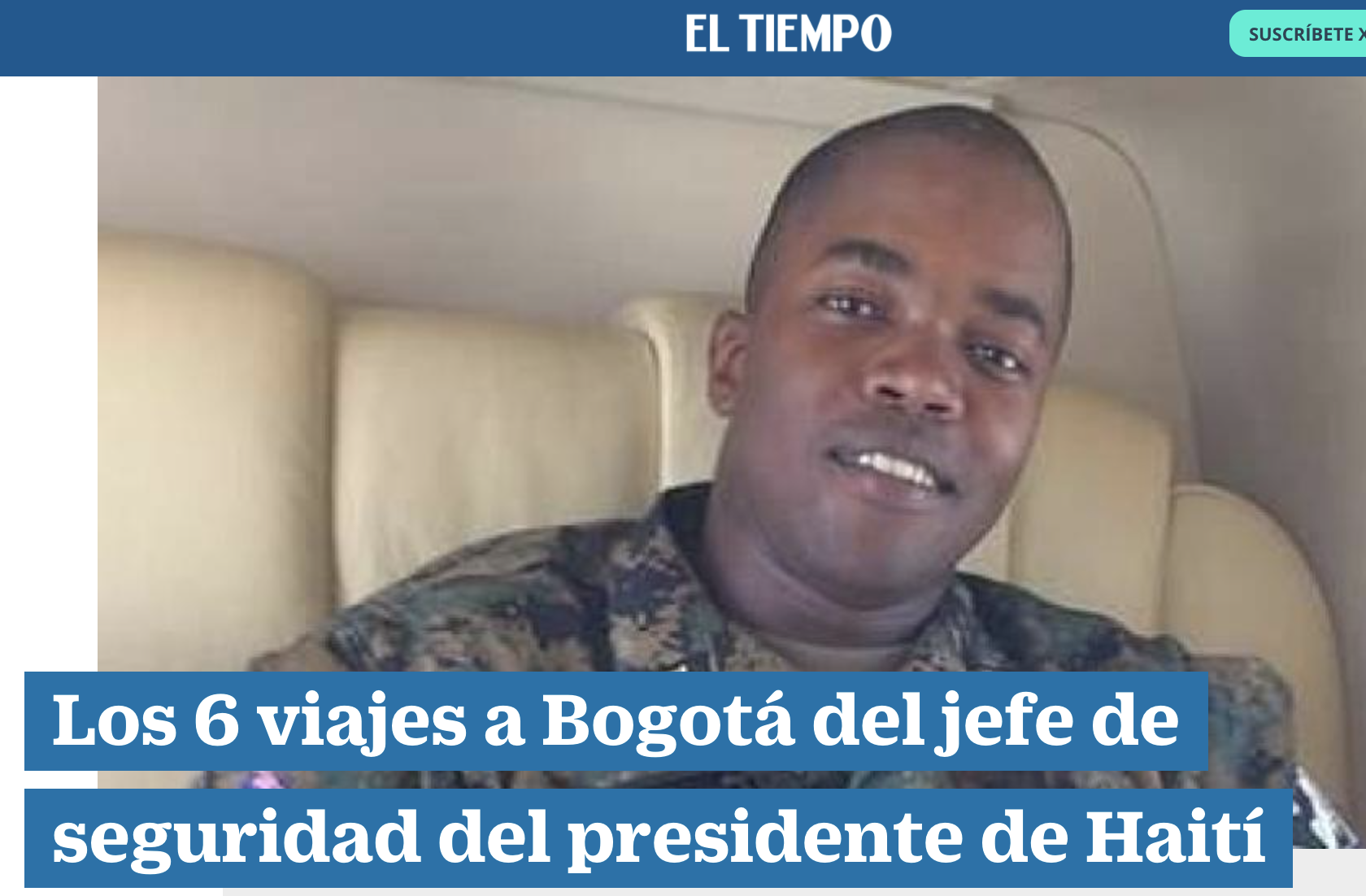
Colombia outlet El Tiempo report: "The six trips to Bogota by the security chief of the president of Haiti."
As the head of the president’s palace guard, Herard had a history of bringing in foreign mercenaries to assist with operations. He also owned his own private security company, and had reportedly been a subject of US law enforcement investigations into drug and arms trafficking. A high-level police source told me just weeks before the assassination that Moïse was going to let the United States arrest Herard. And there are some indications that Herard planned to leave the country: he was scheduled to get his COVID-19 vaccine in Ecuador just two weeks after the assassination, according to government records. According to the testimony of Joseph Vincent, the DEA informant, Herard was the “main instigator” in the plan to obtain weapons and other equipment for the Colombians. Solage’s testimony also alleges that Herard helped obtain arms and ammunition.
Just two days after the second group of Colombians arrived in Haiti, Joseph Felix Badio, the man who had played a role in the Petit Bois deception, called his friend Reynaldo Corvington, the owner of a security firm in Port-au-Prince that had been around since the Duvalier days and for which Badio provided legal services. According to a letter released by Corvington’s lawyer, Badio said that “an FBI officer and a DEA official” wanted to meet with Corvington. According to the lawyer, Badio arrived with Solage, Vincent, former senator Joseph, one of the Colombians, and Rodolphe Jaar. The last is a member of a well-known elite family in Haiti who had worked for years as a DEA informant before eventually getting arrested himself on cocaine trafficking charges and spending a few years in a US jail. According to at least some of the Colombians, they were at Jaar’s residence the night of the assassination, waiting for the go ahead. Jaar was arrested in early January in the Dominican Republic and transferred to the United States weeks later. He is reportedly cooperating with US authorities.
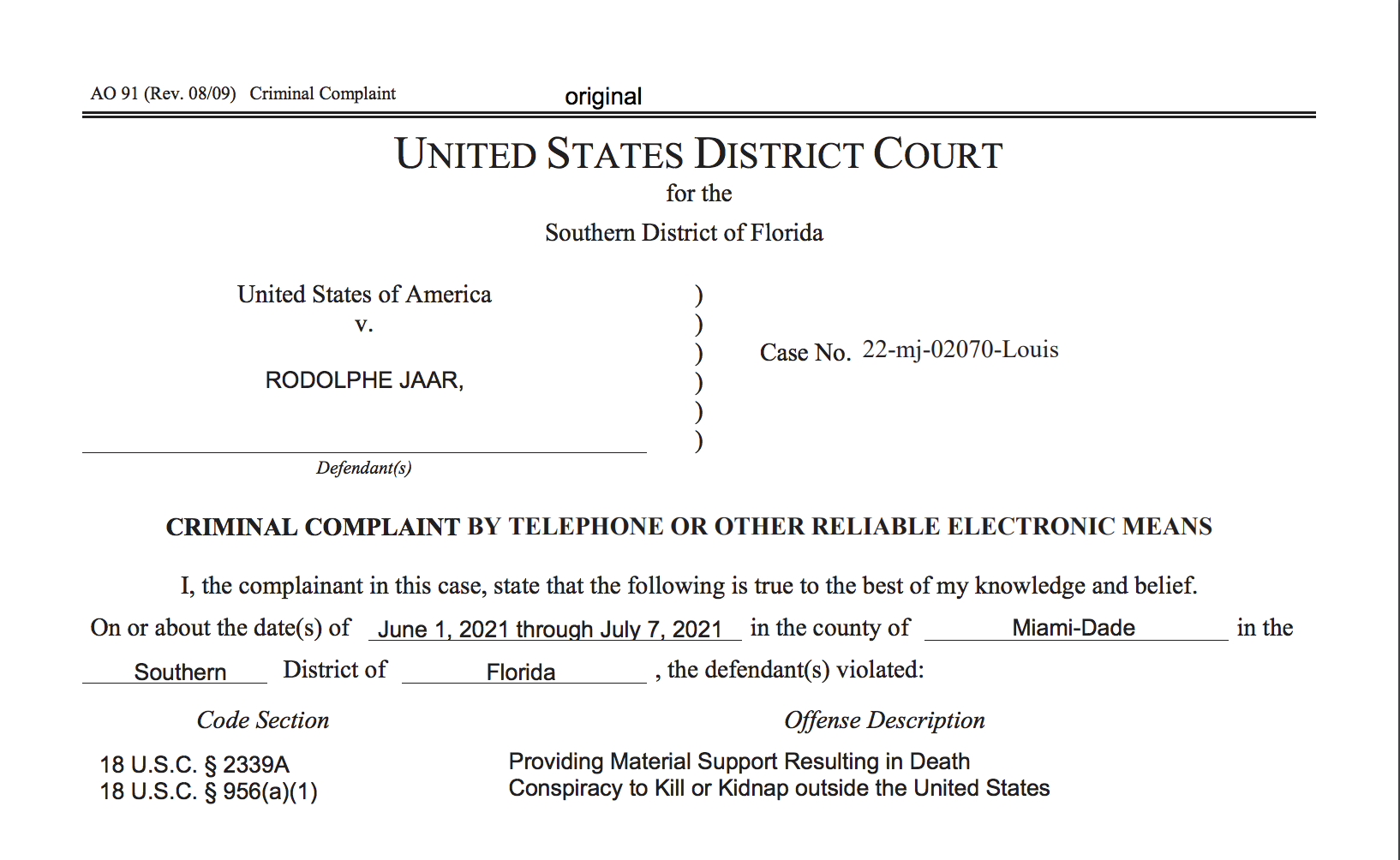
US criminal complaint against Rodolphe Jaar, unsealed on January 20, 2022. In a statement to US law enforcement, Jaar admitted "that he provided firearms and ammunition to the Colombians to support the assassination operation. He stated that the operation changed from an arrest operation to an assassination operation after the initial plan to 'capture' the Haitian President at the airport and take him away by plane did not go forward," according to an accompanying affidavit.
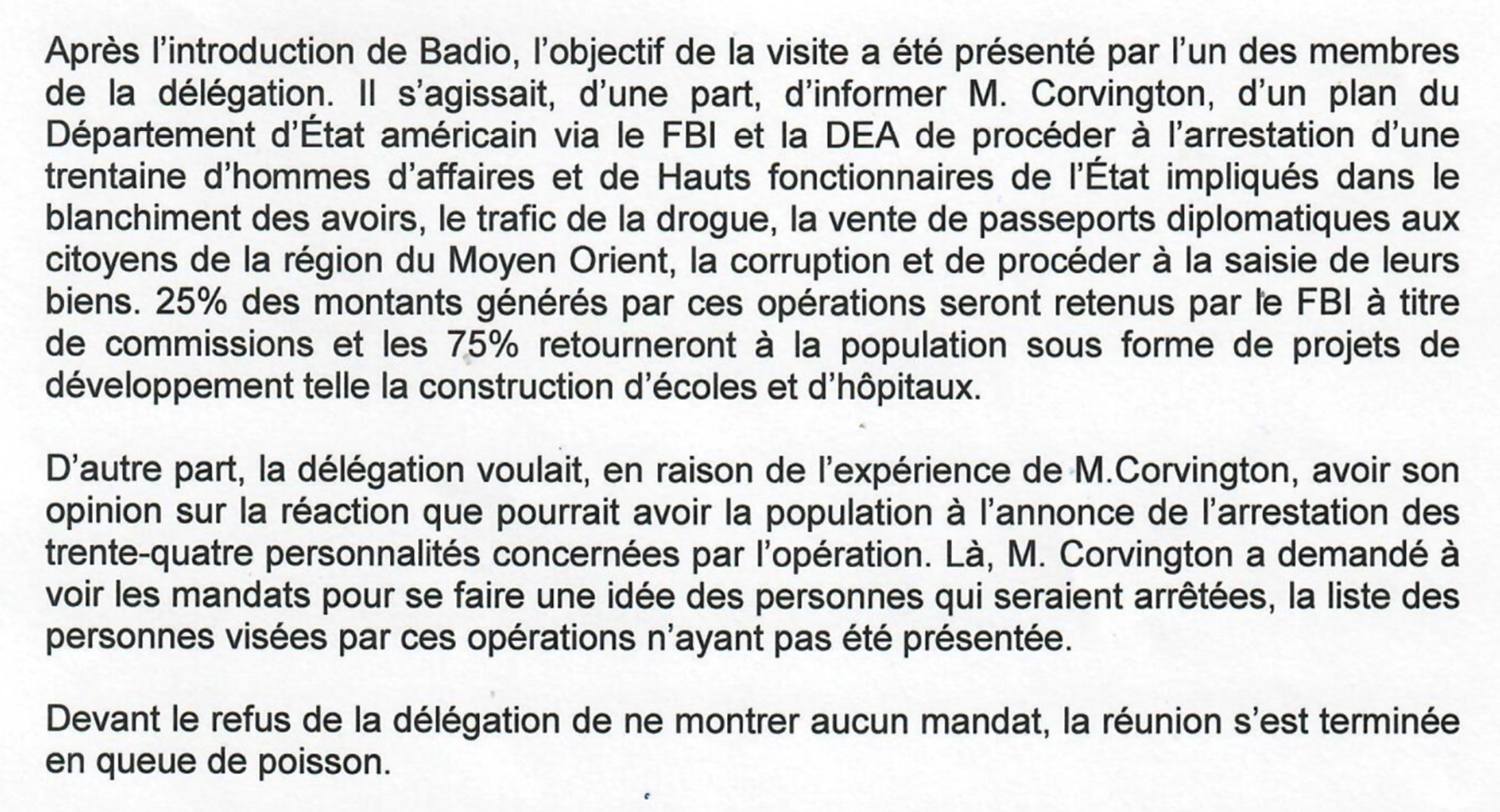
Excerpt from letter released by the lawyer of Reynaldo Corvington. It claims that Joseph Felix Badio presented a plan, backed by the FBI and DEA, to arrest 34 Haitian businessmen and politicians.
According to testimony from Vincent and Solage, Herard was also supposed to be at the meeting but was unable to attend. He knew the firm well, however. Corvington’s son-in-law, who worked at the security company, was a childhood friend of Herard’s and had gone to karate school together. Another Corvington employee, Gilbert Dragon, had attended the police academy in Ecuador, though years prior to Herard’s time there.
At the meeting, according to the lawyer’s letter, Badio pitched Corvington on a plan to arrest more than two dozen businessmen and high-level government officials for their involvement in money laundering and drug trafficking. The lawyers maintain that Corvington asked to see the arrest warrants, and, when Badio was unable to produce any, he ended the meeting and that was that. Corvington and his son-in-law are both in jail. Dragon was too, before passing away from COVID-19 in mid-November. Notably absent from the meeting was Christian Sanon, who told police investigators after his arrest that he didn't even know who Badio was. But in Haiti, word was traveling fast about his activity. It had gotten all the way to the president.
On June 10, Moïse jotted down a few words in a notebook that investigators later found in his bedroom. “To verify Pastor Sanon’s full name and phone number on an attempted coup,” he wrote. But, already, Sanon appeared to be losing control. According to testimony from some of the Colombians and obtained by Colombian media, the officers realized that Sanon lacked political support and would be unable to take power.
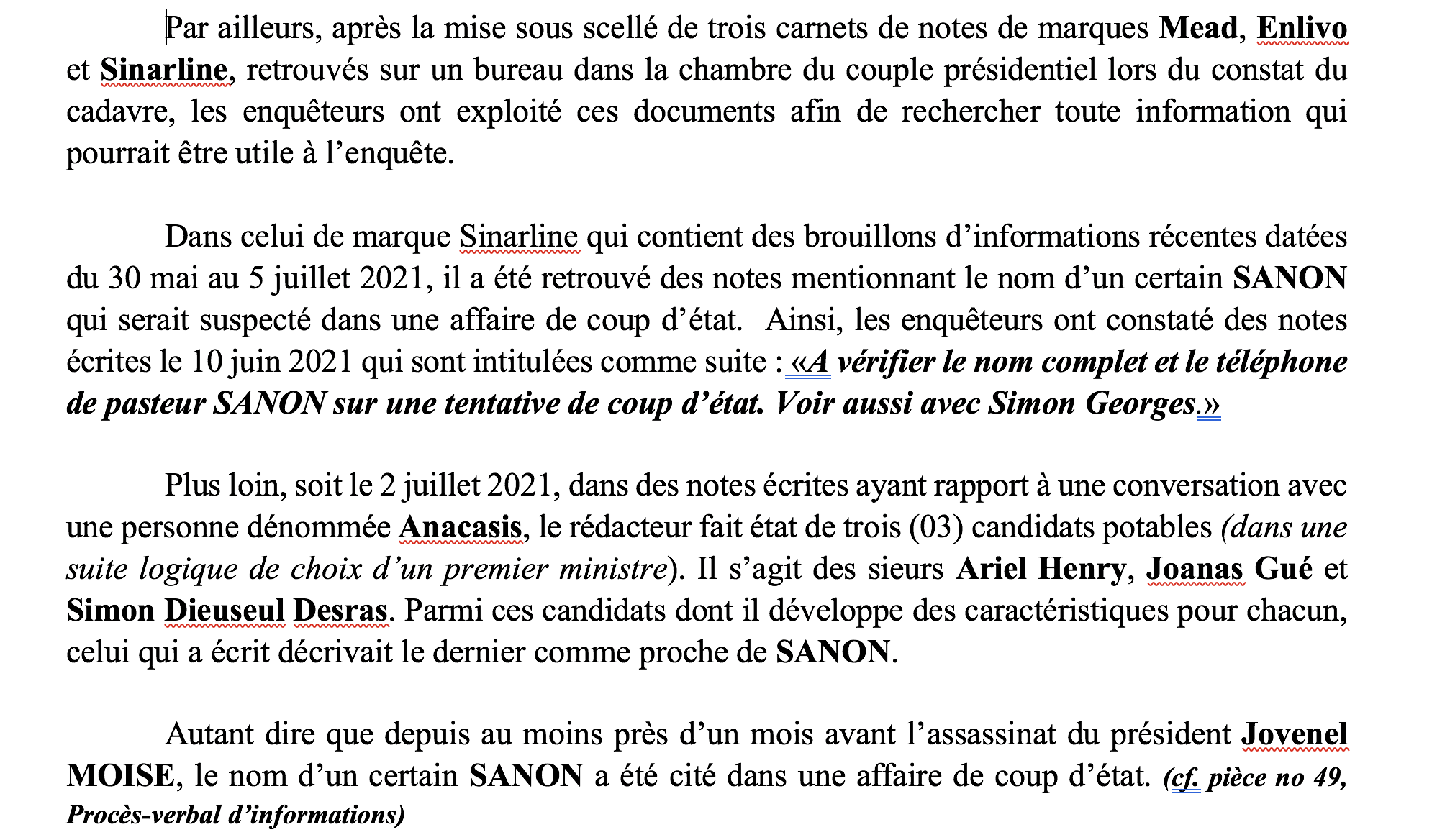
Excerpt from Haitian police investigation. Police discovered three notebooks in the residence of Moise. In one there is a note dated June 10: "To verify the full name and telephone of pastor Sanon about a possible coup d'etat." In another, there are notes on Moise's discussions for a new prime minister with Jean Hector Anacasis. Moise dismissed one option as being too close to Sanon.
Later that month, according to testimony of some of those arrested, there was a meeting at the home of former Supreme Court judge Wendelle Coq Thélot, the woman who had been Sanon’s initial choice as president, and who had also been linked to Petit Bois. CTU’s lawyer claims that, at this meeting, Coq Thélot and a district attorney signed a document authorizing CTU and the Colombian contractors to arrest President Moïse. Coq Thélot is currently wanted by the police and could not be reached for comment; however, a family member told The Washington Post that the document was fake. The district attorney agreed. “It’s the first time I’m seeing this document in my life,” they told The Post. “Someone tried to imitate my signature.”
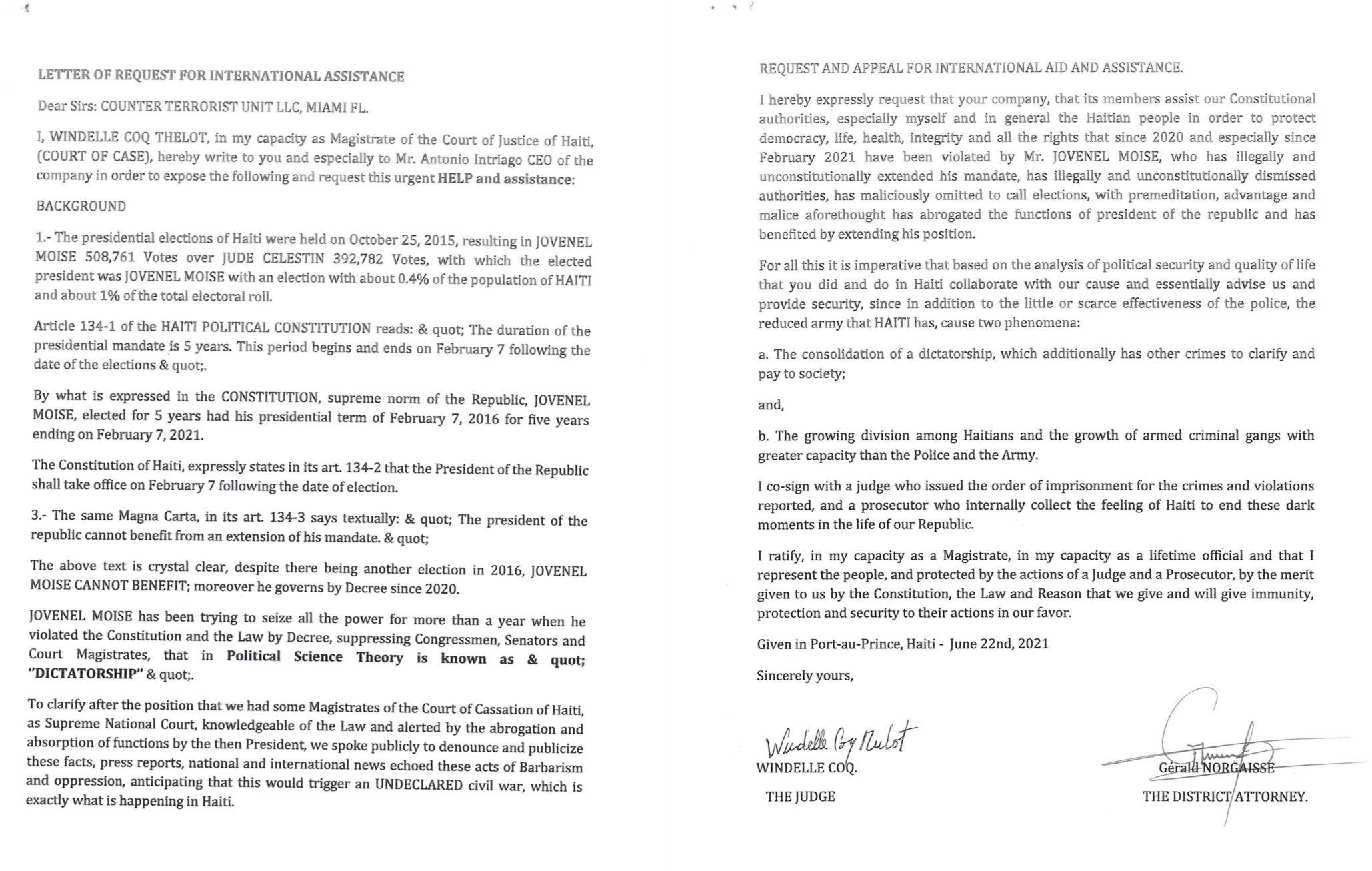
Document released by lawyers from CTU Security apparently signed by Supreme Court judge Wendelle Coq Thélot and a District Attorney named Gerald Norgaisse, requesting assistance from the Florida-based company. Both deny the authenticity of said document.
A friend of Sanon’s told the Miami Herald that they had received a call a week before the assassination and that Sanon said his security team had abandoned him. Sanon told Haitian police the same. Testimony from the detained Colombians also indicates that plans had shifted. At least a few of the Colombians claimed that, about a week before the assassination, they had received an order from Joseph Felix Badio. Their mission was no longer to arrest the president; instead, they were asked to assassinate him and anybody else inside the residence. “It was time to go in and kill everyone, it was time to kill all the policemen…if there was even a pet, kill the pet, there could be no witnesses,” one of the detained Colombians allegedly said.
It was no secret that many of Moïse’s opponents wanted him gone, but he was also becoming a barrier even to his own allies. As 2021 wore on, it became increasingly clear that the president’s attempts to hold elections and a vote on constitutional reform were faltering. Without the election, it looked likely that, come February 2022, Moïse would be forced to step down without an elected successor to take power. This was a threat to PHTK and Moïse’s allies, who would potentially lose access to power, as well as to the United States and other donors, who increasingly saw their efforts to bring stability to Haiti evaporating. In the weeks leading up to Moïse’s assassination, the president had been quietly engaged in negotiations over a new government, one that he hoped would be able to dislodge the obstacles standing in the way of elections. In hindsight, one wonders if he was negotiating with a gun to his head.
On the morning of July 2, the president spent more than an hour on the phone with Jean Hector Anacasis, a former senator who had worked on the campaign of Moïse’s opponent in the 2016 elections. The two discussed options for a new prime minister. The president also spoke with Josué Pierre Louis, who had served in various official capacities for decades. In his notebook, Moïse jotted down three names, one of which the president discarded as apparently too close to Christian Sanon. The next day, Moïse received a warning telling him that something was being planned, and to keep a close eye on his security team. But nothing happened.
On July 4, negotiations continued. Moïse spoke again with Anacasis and then directly with Dr. Ariel Henry, one of the names on the list he had drawn up days earlier. The decision was made, though the president was not simply attempting to assuage his critics; it was also an attempt by the president to keep his own allies happy. Multiple sources close to Moïse said that he had decided to throw his support behind someone other than his predecessor, Michel Martelly, in the upcoming election. This had made Martelly livid. But Henry, a neurosurgeon by trade, was Martelly’s choice for prime minister. Though he remained connected to certain factions of the political opposition, Henry had also served as minister of the interior during Martelly’s final year in office and maintained a close personal friendship with Sophia St. Remy, Martelly’s wife. On the afternoon of July 5, the president issued a decree naming Henry prime minister.
Moïse confided in an ally that, while agreeing to Martelly’s choice, he still had his own plan. With Henry, Moïse felt that he would be able to temper criticism, broaden his base of political support, and reach a deal for elections. And, once the infrastructure was in place and the vote scheduled, he would be back in the driver's seat, not Martelly. Still, many of Moïse’s hardline supporters in the government argued against the strategy, and sought to torpedo Henry’s nomination before he officially took office. One of Moïse’s top advisors reached out to a lawyer, looking for anything to try to get the president to rescind the nomination. Henry’s official swearing in was pushed off for a couple of days. On the eve of his assassination, Jovenel Moïse was embroiled in an all-out internal power struggle.
On July 6, the president spoke with a friend, a former senator. Moïse had stayed home that day rather than travel to the National Palace. “He told me a lot of people were spending a lot of money to murder him,” the friend later recounted to Reuters. Moïse, his friend said, knew that Colombian mercenaries were in Haiti and said he was planning to arrest them.
“I said, ‘Why don't you do it right away?,’” the friend told Reuters. “He said: ‘I am going to do it.’”
Within hours, the president was dead.

Colombia outlet El Tiempo report: "The six trips to Bogota by the security chief of the president of Haiti."
Colombia outlet El Tiempo report: "The six trips to Bogota by the security chief of the president of Haiti."

US criminal complaint against Rodolphe Jaar, unsealed on January 20, 2022. In a statement to US law enforcement, Jaar admitted "that he provided firearms and ammunition to the Colombians to support the assassination operation. He stated that the operation changed from an arrest operation to an assassination operation after the initial plan to 'capture' the Haitian President at the airport and take him away by plane did not go forward," according to an accompanying affidavit.
US criminal complaint against Rodolphe Jaar, unsealed on January 20, 2022. In a statement to US law enforcement, Jaar admitted "that he provided firearms and ammunition to the Colombians to support the assassination operation. He stated that the operation changed from an arrest operation to an assassination operation after the initial plan to 'capture' the Haitian President at the airport and take him away by plane did not go forward," according to an accompanying affidavit.

Excerpt from letter released by the lawyer of Reynaldo Corvington. It claims that Joseph Felix Badio presented a plan, backed by the FBI and DEA, to arrest 34 Haitian businessmen and politicians.
Excerpt from letter released by the lawyer of Reynaldo Corvington. It claims that Joseph Felix Badio presented a plan, backed by the FBI and DEA, to arrest 34 Haitian businessmen and politicians.

Excerpt from Haitian police investigation. Police discovered three notebooks in the residence of Moise. In one there is a note dated June 10: "To verify the full name and telephone of pastor Sanon about a possible coup d'etat." In another, there are notes on Moise's discussions for a new prime minister with Jean Hector Anacasis. Moise dismissed one option as being too close to Sanon.
Excerpt from Haitian police investigation. Police discovered three notebooks in the residence of Moise. In one there is a note dated June 10: "To verify the full name and telephone of pastor Sanon about a possible coup d'etat." In another, there are notes on Moise's discussions for a new prime minister with Jean Hector Anacasis. Moise dismissed one option as being too close to Sanon.

Document released by lawyers from CTU Security apparently signed by Supreme Court judge Wendelle Coq Thélot and a District Attorney named Gerald Norgaisse, requesting assistance from the Florida-based company. Both deny the authenticity of said document.
Document released by lawyers from CTU Security apparently signed by Supreme Court judge Wendelle Coq Thélot and a District Attorney named Gerald Norgaisse, requesting assistance from the Florida-based company. Both deny the authenticity of said document.
THE ASSASSINATION
Route Kenscoff (the yellow road in the map) is a long, winding road that traverses the wealthier, hillside neighborhoods that overlook the capital.
The night of the assassination, the team of Colombians allegedly waited in Pelerin 6 [UPDATE: SUBSEQUENT RECORDS INDICATE THE STAGING HOUSE WAS ACTUALLY LOCATED NEAR THE THOMASSIN 31 NEIGHBORHOOD] at the home of Rodolphe Jaar. Once they received the go ahead, they traveled in 6 pick up trucks down Route Kenscoff to Pelerin 5.
Pelerin 5, the darker shaded area is the private residence of President Jovenel Moise. Between 1:30 a.m. and 2:00 a.m., the president was shot 12 times in his bedroom.
Where Route Kenscoff opens into Petionville and Place St. Pierre (light green shaded area). This is where the president's security unit set up a road block after the assassination.
Section of Route Kenscoff where the Colombians, as well as two Haitian-Americans, Joseph Vincent and James Solage, sought shelter after the assassination. Vincent, a former DEA informant, called his handler who helped facilitate his and Solage's surrender. Soon thereafter, Haitian police raided the building, killing at least two.
Green dot is the location of the Taiwanese embassy. After fleeing the empty building under police gunfire, a number of Colombians broke into the embassy. They were arrested there the following day. In the top left is Jalousie, a hillside shanty town where residents apprehended some of the Colombians. In total 18 were arrested.
The specifics of what happened that night remain very much in question. Testimonies collected by Haitian investigators are contradictory and partial. What we do know is that, just before 1:30 am, residents of the president’s neighborhood started hearing lots of gunfire. A neighbor reported witnessing a drone flying overhead.
At 1:34, the president spoke with the coordinator of his security teams, Jean Laguel Civil, telling him that there was a lot of shooting and to urgently send backup. Two minutes later, Moïse called the chief of police, Leon Charles, who was still at police headquarters wrapping up after a long day of work. Then he called Dimitri Herard, who was off duty that night and at home. The president’s final call, at 1:46, was to Vladimir Paraison, a police officer and Moïse's close friend. A few minutes later, neighbors reported hearing three loud explosions.
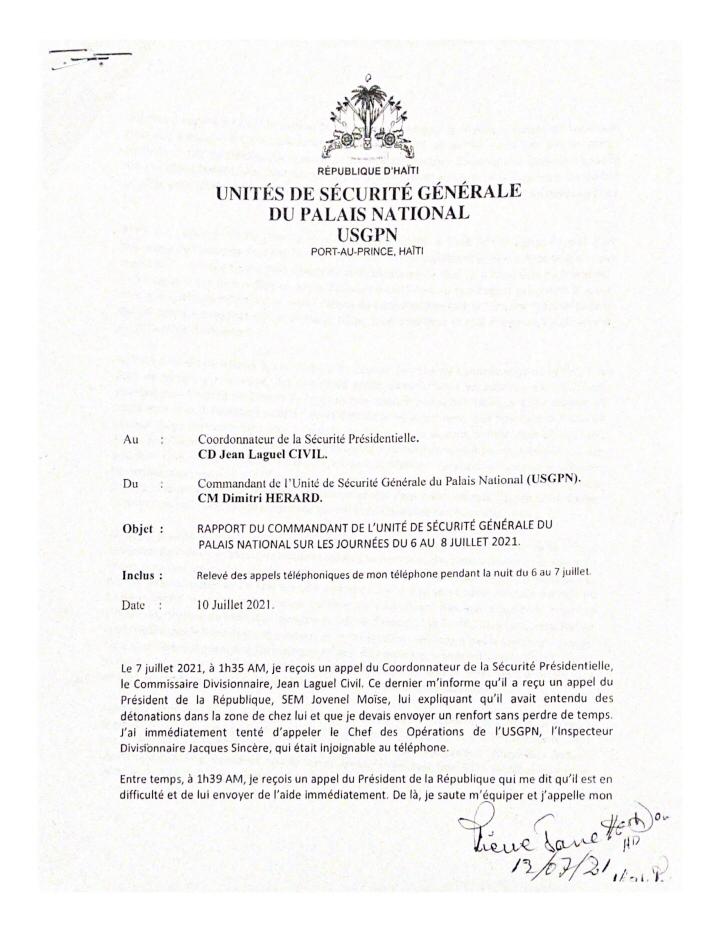
Statement released by Dimitri Herard.
Video showing heavily armed men approaching the president's residence. Source: Journal la Diaspora
Video showing heavily armed men approaching the president's residence. Source: Journal la Diaspora
At some point, James Solage got on a loudspeaker and declared, both in English and Kreyol, that this was "a DEA operation," and called for everyone to stand down.
"This is a DEA operation," a male voice can be heard repeating. The individual was later identified as James Solage.
"This is a DEA operation," a male voice can be heard repeating. The individual was later identified as James Solage.
A number of the Colombians later testified that the front door had been left open and that they had simply walked in. Other reports indicate the explosions were from a group of Colombians breaking into the house. What is clear is that, within minutes of those explosions, President Jovenel Moïse was dead, and his wife seriously injured. Two of their children apparently hid in their room and were left undisturbed. After about a 15-minute pause, residents reported hearing the shooting pick up again at just after 2:00 a.m. And yet, in the apparent hail of gunfire, not a single person was injured or killed aside from the president and the First Lady. One security officer on duty that night was later found hiding in the yard with no clothes on. He had ditched his uniform when the whole thing started.
Though Paraison was Moïse's final call, he was the first to show up, and, according to multiple sources and the Haitian police investigation, it was Paraison who ended up finding the president dead and taking Martine Moïse to the hospital. Herard and Laguel also reportedly arrived at the area around 2:00 am. Laguel testified that, on his way to the residence, he ran into a group of heavily armed men who prevented him from getting there. Herard’s story is that when he arrived at the president's neighborhood of Pelerin 5, he could hear someone on a loudspeaker claiming a DEA operation was underway. He didn’t make it any closer.
Rather than directly confront the armed group, Haitian police claim to have set up roadblocks — one at the base of Kenscoff Road where it opens onto a public square, Place St. Pierre, and the other further up the road. One partially unanswered question, which has been the cause of much speculation, is why this ostensibly elite-trained group of Colombian former military officers didn’t have an adequate exit plan. Once again, there has been no clear explanation. Regardless, the Colombians ended up taking cover in a two-story building between Pelerin 5 and Place St. Pierre. Meanwhile, Arcangel Pretel, the man who had recruited them months earlier, appeared to try and salvage the operation. “It looks like there’s bad communication with the local police, and that can bring problems for all of you,” he texted a suspect, according to The New York Times. “The new president should be sworn in,” he added, in an apparent reference to Coq Thélot, the Supreme Court judge.
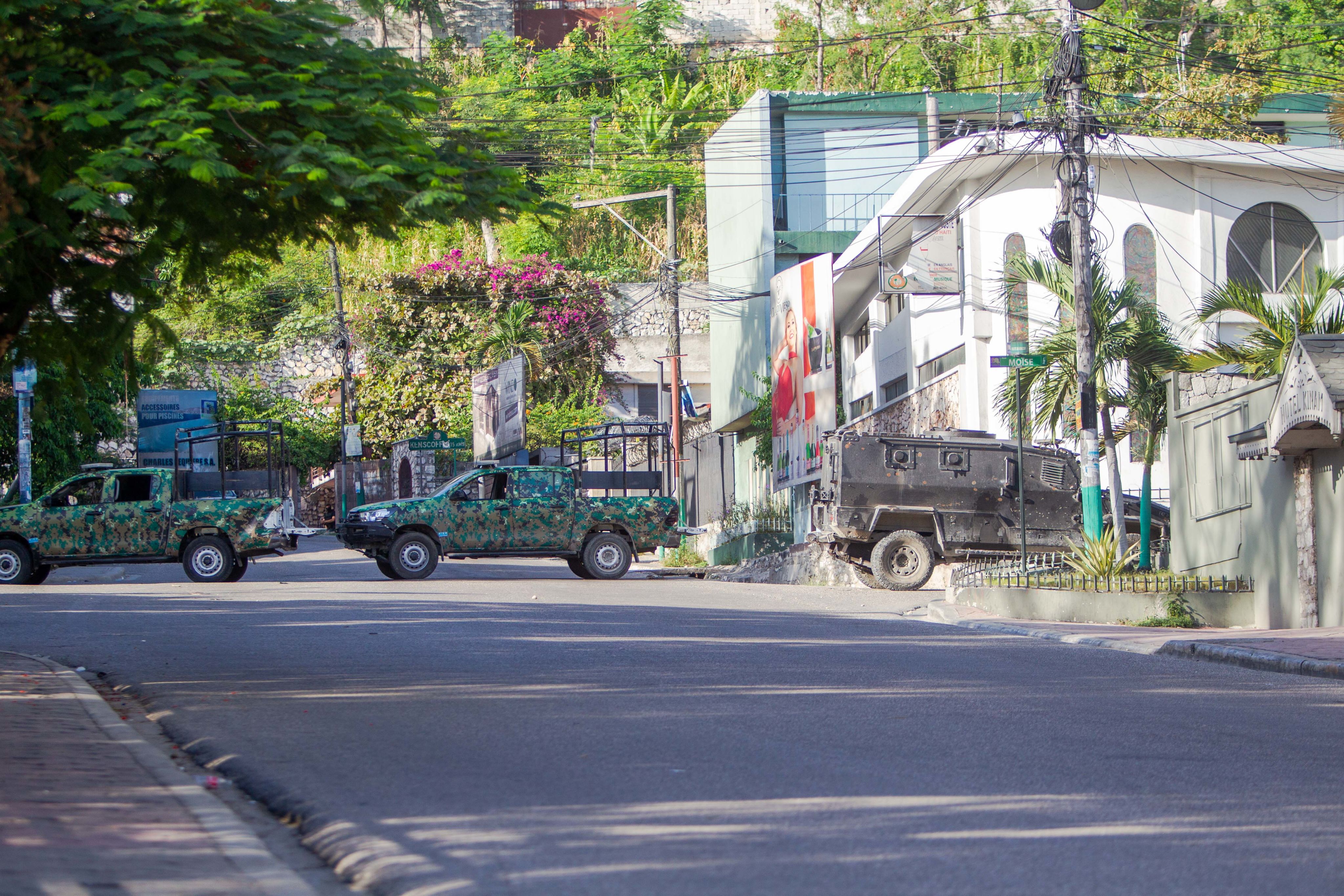
Photo of the police roadblock at Route Kenscoff and Place St. Pierre.
When interim prime minister Claude Joseph, who was set to be replaced later that day by Henry, addressed the press just a few hours later, he said the president had been assassinated by a group of foreign mercenaries, many of whom had been heard speaking Spanish. “Stay calm, the nation is secure, let’s look for harmony,” he said, though, at the time, police had yet to detain anybody related to the assassination. One witness claimed to have seen Herard at one of the roadblocks that morning “casually talking to drivers” as they passed. Nobody seemed outwardly concerned.
At 7:00 am, after Joseph delivered public confirmation of the president’s death, a Haitian journalist snapped a photo from outside the Kinam Hotel in Place St. Pierre. Just to the east of the hotel is the beginning of Kenscoff Road, which winds up into the hills that traverse the capital’s wealthier suburbs, including Pelerin 5, where the president lived. In the photo, one can see two of the presidential security unit’s pickup trucks blocking Kenscoff Road and, just a couple of feet behind them, two men wearing shirts, ties, and khaki pants. James Solage and Joseph Vincent, the two Haitian-Americans, at least one of whom had been a DEA informant, who had been at the president’s house with Colombians just hours before, look as calm as can be. They aren’t hiding. They aren’t panicking. They are in broad daylight, in a generally busy public square.
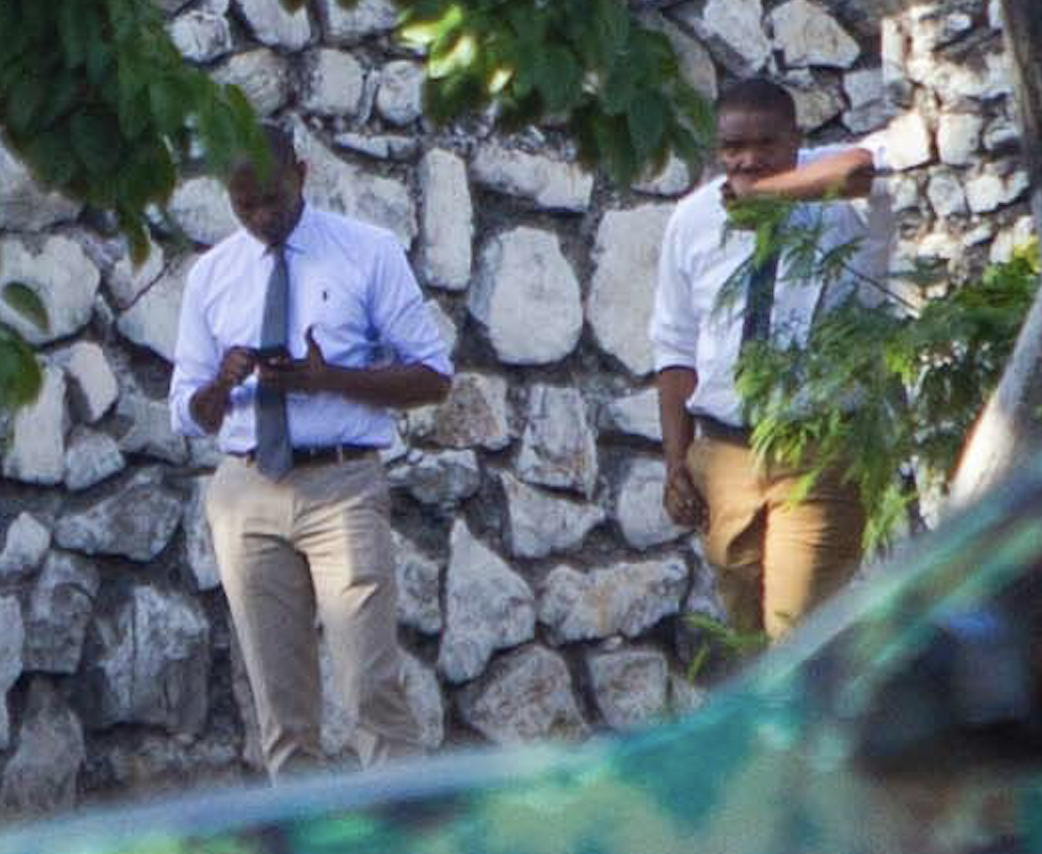
Joseph Vincent and James Solage, seen standing right behind the police roadblock the morning after the assassination.
About an hour later, another local journalist, Malhaiko Senechal, riding on a moto, cruised right through the barricade and eventually ran into the Colombians at the building where they had been camped out for nearly five hours. Vincent and Solage were there also, though they had ditched the ties.
Senechal later told CNN that the Colombians looked restless but were not openly hostile or upset. They asked him to stop filming but let him stay. While there, Senechal could hear Vincent on the telephone. He was live on air with a local radio station, Radio Mega.
“There's loss of life, but we didn't do it,” he said. “This group is from the president's own hand,” Vincent continued. “It is a group that he let into the country to provide security for him. It turns out that the same group has been given a warrant to arrest the president.” After describing the warrant, Vincent claimed that “something terrible happened, although we were not expecting that to happen.”
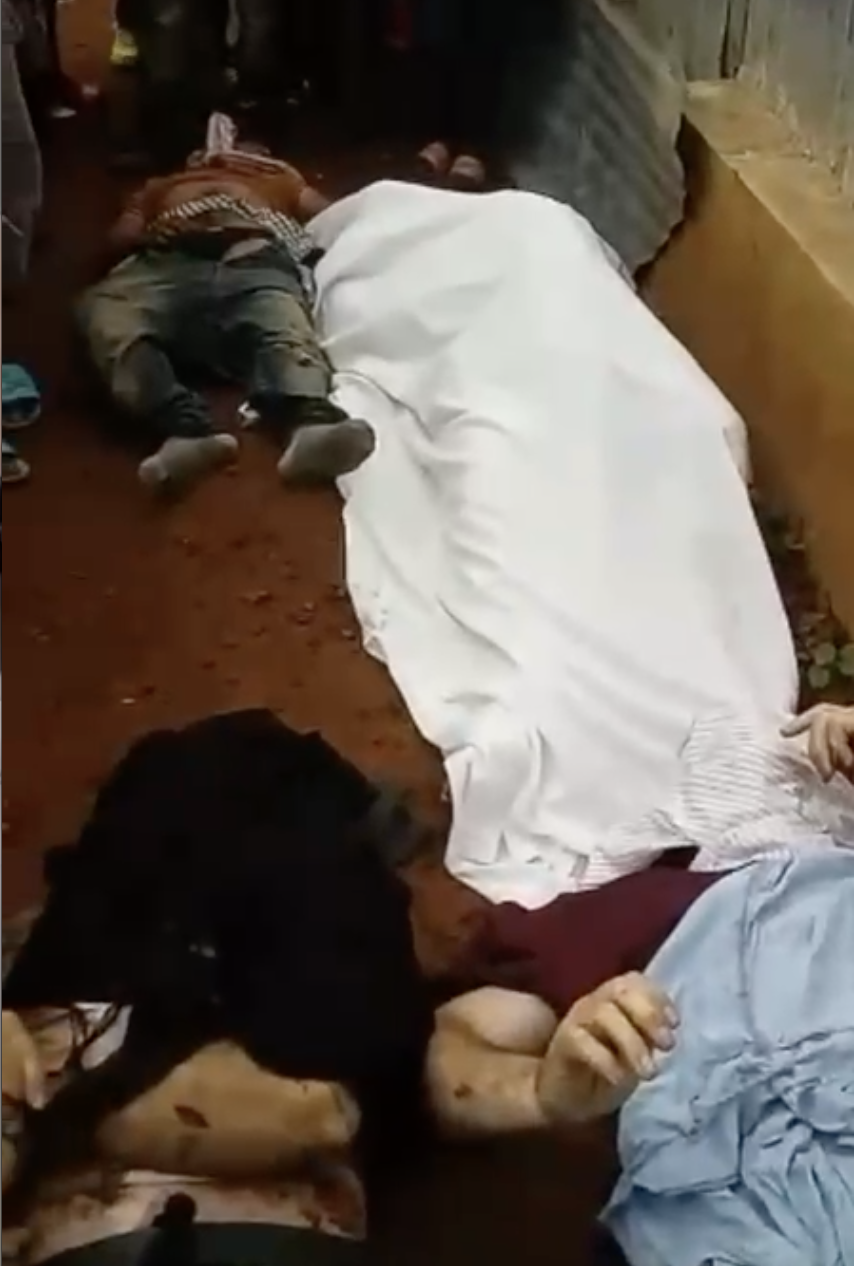
Image showing multiple dead bodies after the gun battle between the Colombian former soldiers and the Haitian National Police. Officially, only three were killed. However there are four bodies visible in this image.
Since the president’s death, Vincent had been on the phone almost nonstop, according to records obtained by Haitian police. He spoke with John Joel Joseph, the former senator, and with multiple Haitian police officers; he called the FBI’s field office in Miami, the US Embassy’s after-hours hotline, and even the publicly listed numbers of a few US congressional offices. He made 10 phone calls to Bob Balthazar, the well-connected Haitian-American who, he later told police, worked for the State Department and had connected him to Sanon seven months earlier. He also, the DEA would later acknowledge, called his handler at the agency.
“Following the assassination of President Moïse, the suspect reached out to his contacts at the DEA,” a statement from the agency said. “A DEA official assigned to Haiti urged the suspect to surrender to local authorities and, along with a US State Department official, provided information to the Haitian government that assisted in the surrender and arrest of the suspect and one other individual.” The DEA denied that any of those involved in the attack were operating on the its behalf.
Just after 4:00 p.m., Vincent established contact with a Haitian police officer, Jacque Sincere, and began negotiating his surrender. After nearly two hours, Vincent and Solage turned themselves in to the Haitian police. Only then did the police launch an attack on the building where the Colombians remained. Three Colombians died, one via a single shot to the head. On the bodies, investigators found tens of thousands of dollars in US currency. Eleven of the Colombians fled and eventually broke into the Taiwanese embassy, seeking shelter. They later told investigators that Pretel, the former FBI informant, had promised them that help from the United States was on the way. It never arrived, and Pretel has not been seen or heard from since.
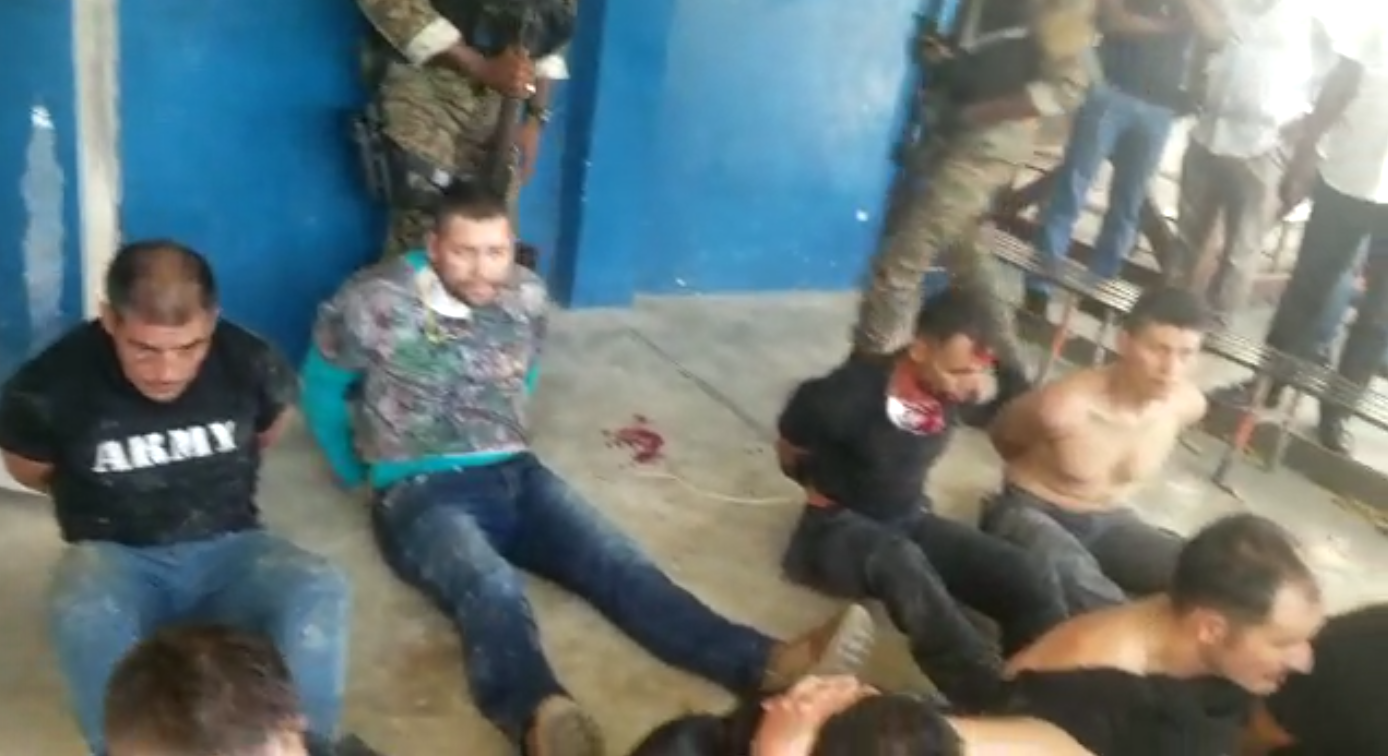
A group of Colombians under arrest in Haiti.
The next day, July 8, the men in the embassy surrendered to Haitian police, and a number of other Colombians were apprehended by residents in nearby neighborhoods and turned over to the authorities. In all, 18 Colombians were arrested. Only one of seems to have managed to avoid arrest or death. He was eventually detained in Jamaica and then extradited to the United States in January, where he is charged with conspiracy to assassinate a foreign leader and facing life in prison. He is likely cooperating with US law enforcement.
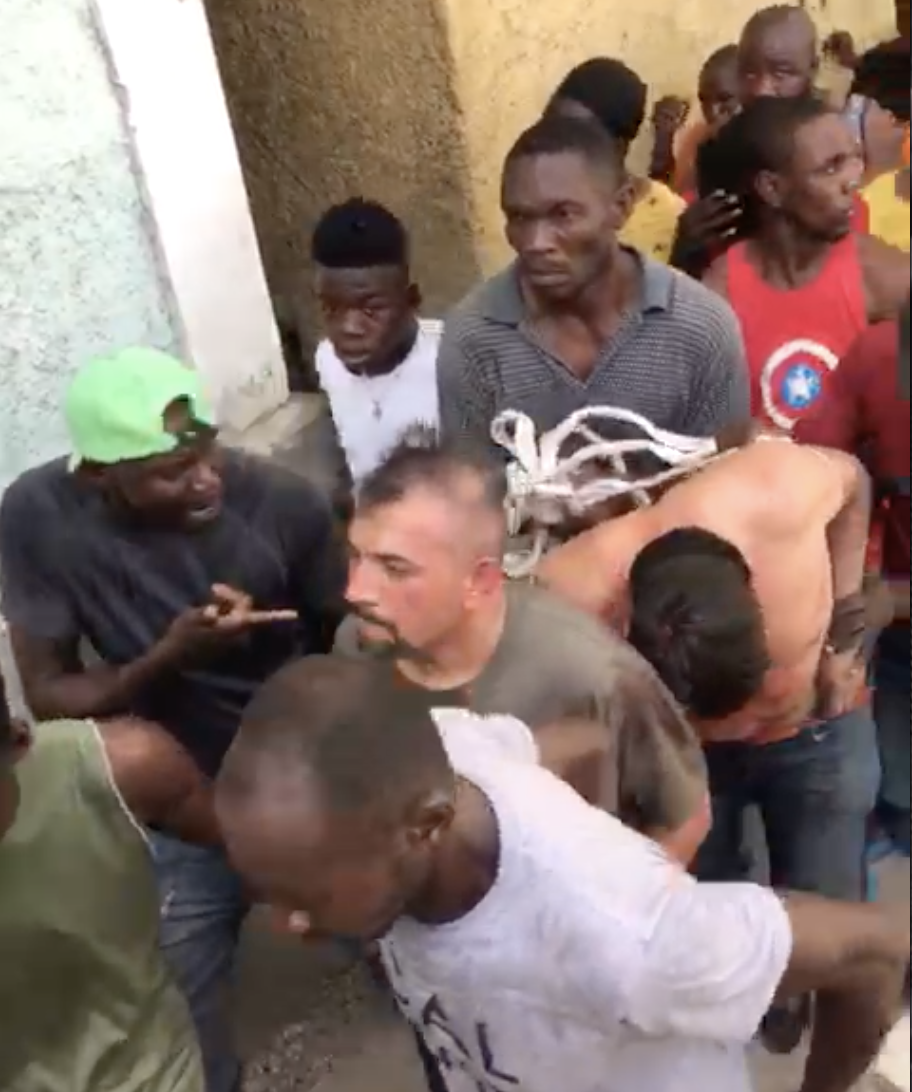
Two of the Colombians are captured and delivered to the police by residents of a nearby neighborhood.
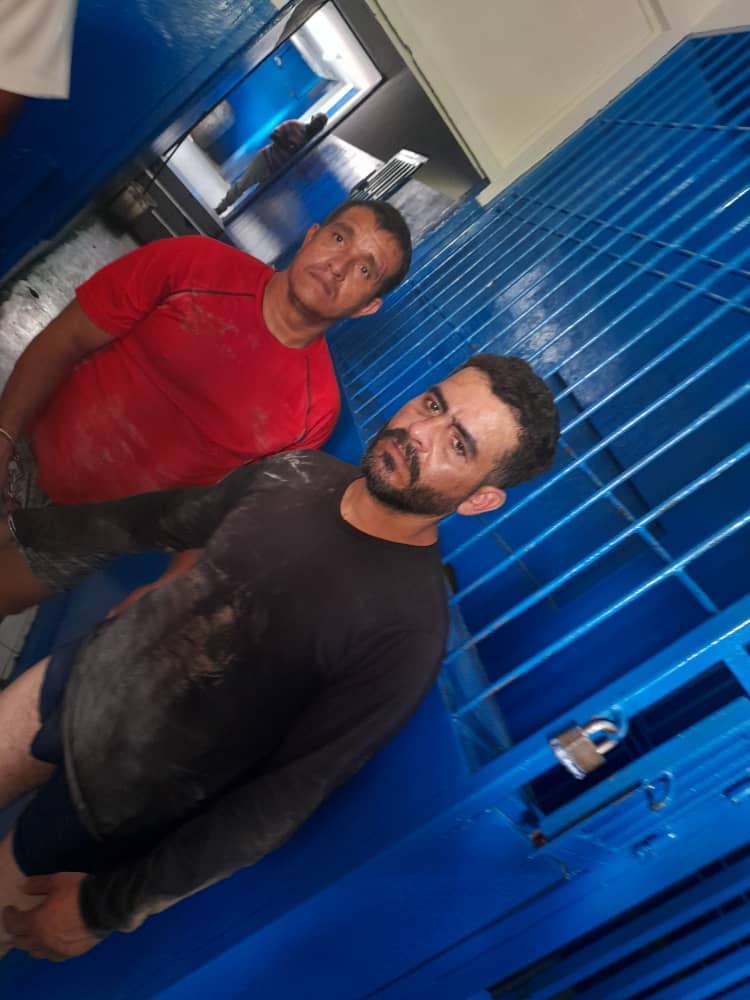
Two of the Colombians in jail.
The Colombian news outlet Caracol obtained testimony from at least four of the Colombians. In those recordings, the former soldiers admit to having assassinated the president and even single out the individual who fired the fatal shots. But, it has been difficult to take anything we’ve been told at face value. The Haitian police’s investigative report, and the reports from the Colombian press, are all based on individuals’ testimony — hearsay, in other words. The jailed Colombians have said their testimony was obtained with torture. Meanwhile some have communicated a very different story, claiming that they thought the plan was to arrest the president and that they had no idea about the assassination. CTU Security, the firm that had hired the Colombians, claimed that when their employees arrived at the president’s home, he was already dead.
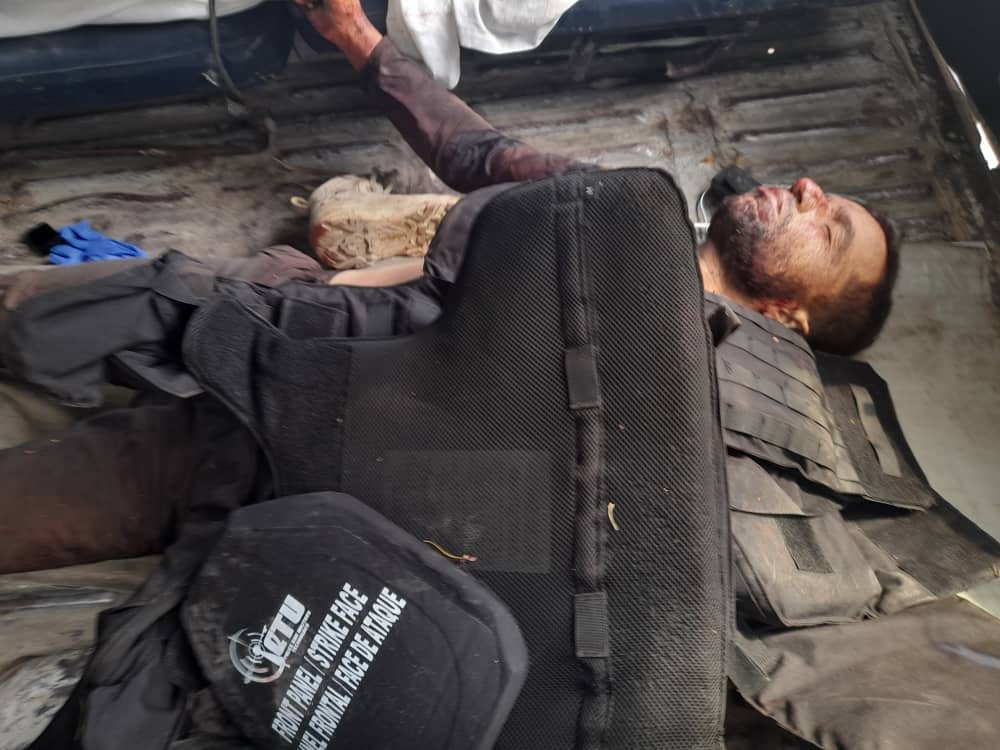
Body of one of the Colombians. Bulletproof vest emblazoned with the logo of CTU Security, the Florida-based firm that contracted the mercenaries.
“They want to pass off the death of that man as if we were the ones that had done it,” one Colombian texted their wife the day after the assassination. “They already had all of their intentions,” he said. “They fooled us.”
Badio, who allegedly gave the order and accompanied at least some of the Colombians to Moïse’s residence, was nowhere to be found after the assassination. Who had fooled whom? Had Badio fooled everyone? On behalf of whom? Did one group of Colombians fool the others? Did the president’s security detail — none of whom were even injured during the attack — fool the Colombians? Had Moïse authorized the Colombians entrance into Haiti only to be assassinated by that very group? If so, who had tricked the president?

Statement released by Dimitri Herard.
Statement released by Dimitri Herard.

Photo of the police roadblock at Route Kenscoff and Place St. Pierre.
Photo of the police roadblock at Route Kenscoff and Place St. Pierre.

Joseph Vincent and James Solage, seen standing right behind the police roadblock the morning after the assassination.
Joseph Vincent and James Solage, seen standing right behind the police roadblock the morning after the assassination.

Two of the Colombians are captured and delivered to the police by residents of a nearby neighborhood.
Two of the Colombians are captured and delivered to the police by residents of a nearby neighborhood.

Image showing multiple dead bodies after the gun battle between the Colombian former soldiers and the Haitian National Police. Officially, only three were killed. However there are four bodies visible in this image.
Image showing multiple dead bodies after the gun battle between the Colombian former soldiers and the Haitian National Police. Officially, only three were killed. However there are four bodies visible in this image.

A group of Colombians under arrest in Haiti.
A group of Colombians under arrest in Haiti.

Two of the Colombians in jail.
Two of the Colombians in jail.

Body of one of the Colombians. Bulletproof vest emblazoned with the logo of CTU Security, the Florida-based firm that contracted the mercenaries.
Body of one of the Colombians. Bulletproof vest emblazoned with the logo of CTU Security, the Florida-based firm that contracted the mercenaries.
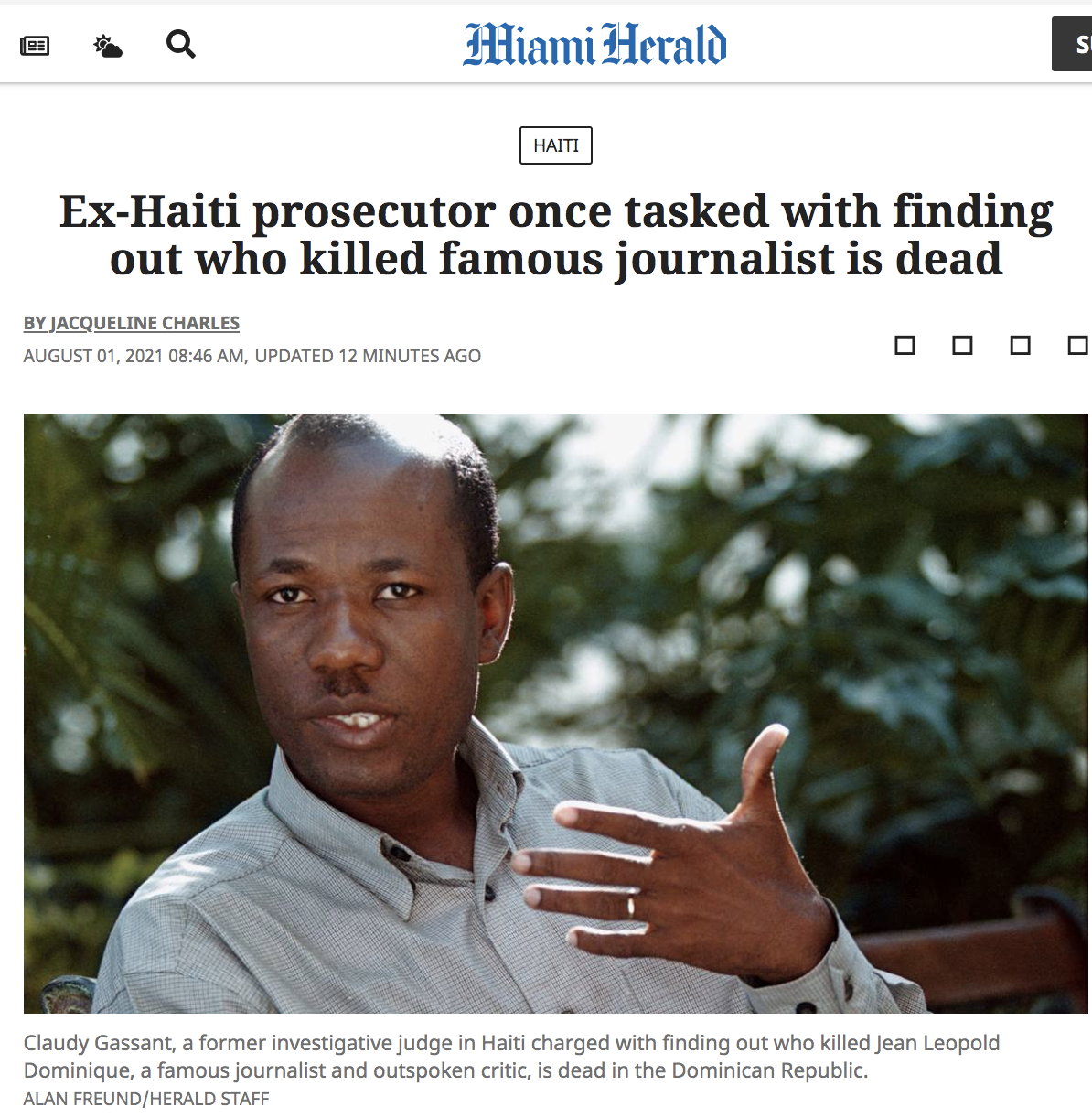
August 1, 2021 Miami Herald article about the death of Claudy Gassant, who was tasked with investigating the death of Jean Léopold Dominique.
August 1, 2021 Miami Herald article about the death of Claudy Gassant, who was tasked with investigating the death of Jean Léopold Dominique.
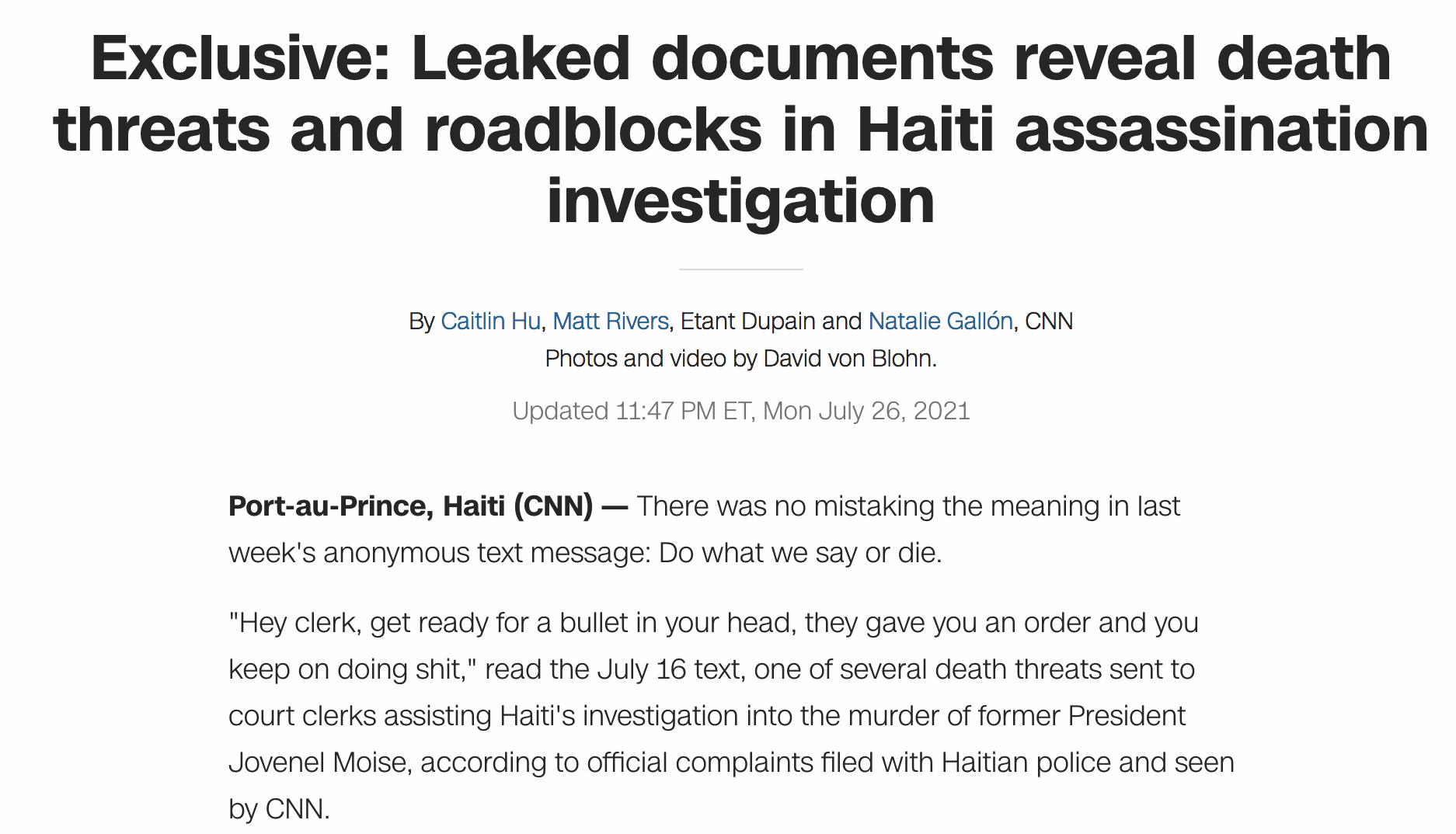
July 26, 2021 CNN article about the assassination investigation.
July 26, 2021 CNN article about the assassination investigation.
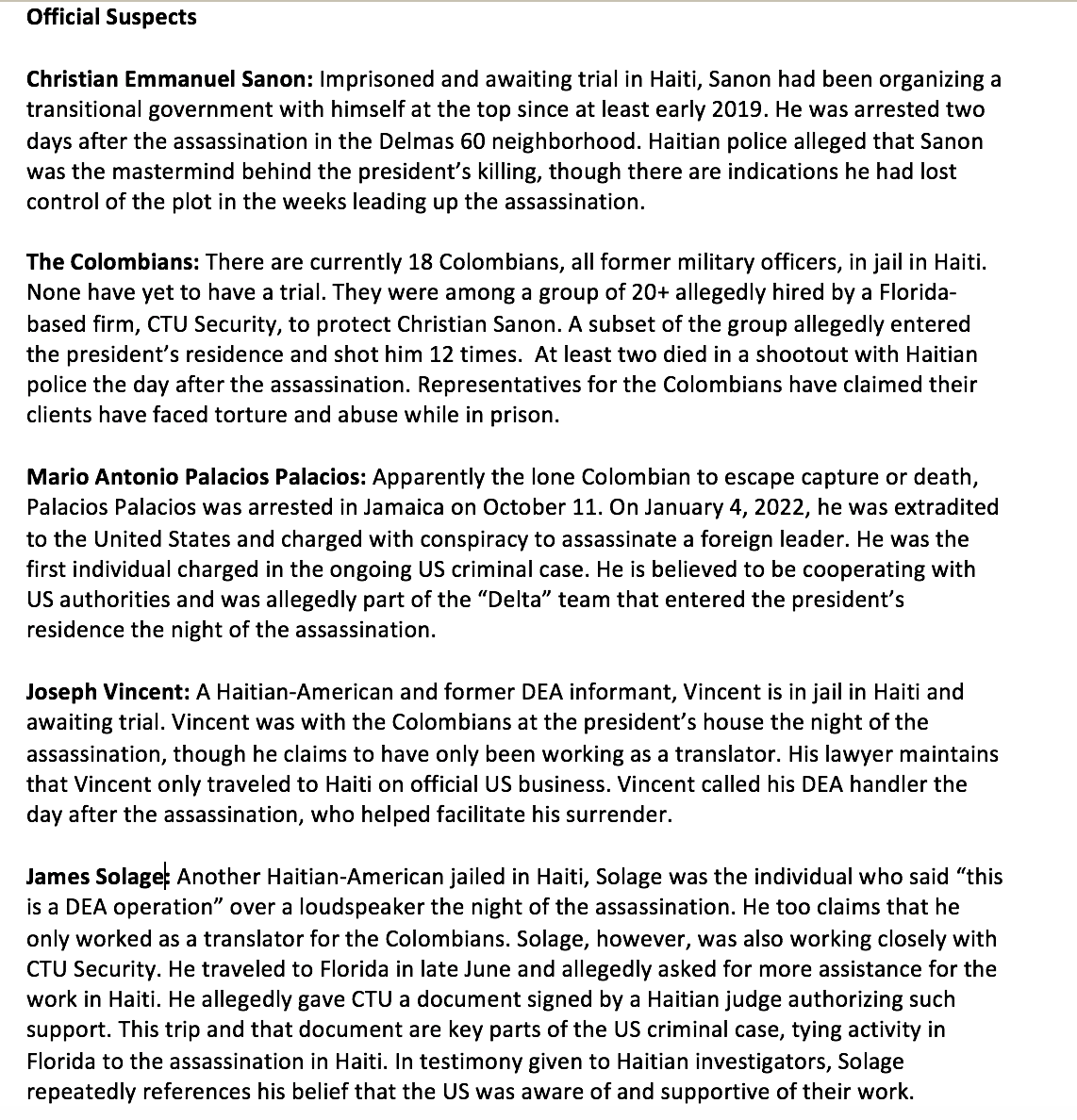
Key suspects in the events surrounding the assassination of Haitian president Jovenel Moïse.
Key suspects in the events surrounding the assassination of Haitian president Jovenel Moïse.
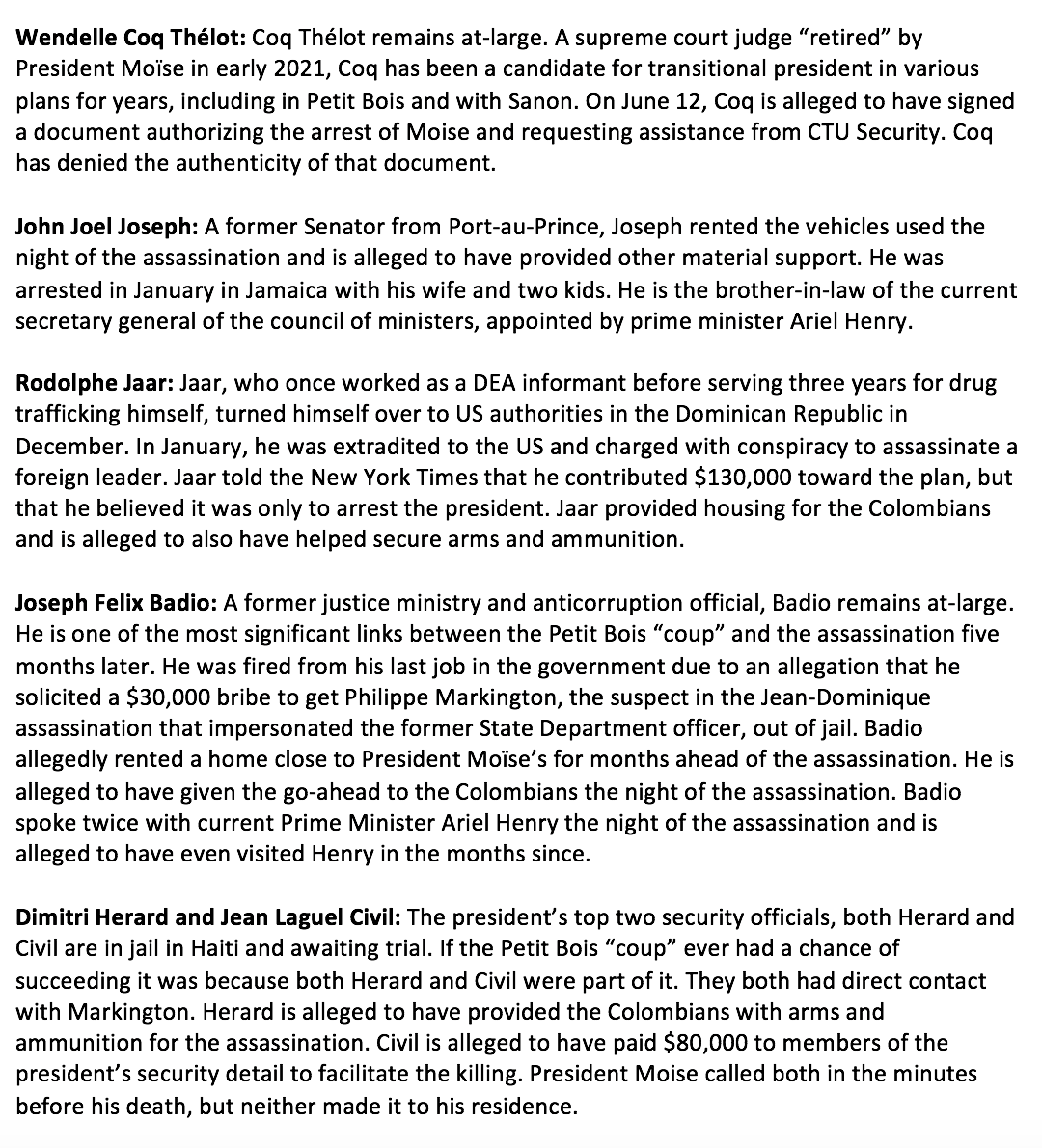
Key suspects in the events surrounding the assassination of Haitian president Jovenel Moïse. (continued)
Key suspects in the events surrounding the assassination of Haitian president Jovenel Moïse. (continued)

Noticias Caracol headline from July 14 alleging Claude Joseph was involved in the assassination. Joseph was out as prime minister within a week, though no further details of his involvement have since emerged.
Noticias Caracol headline from July 14 alleging Claude Joseph was involved in the assassination. Joseph was out as prime minister within a week, though no further details of his involvement have since emerged.

Excerpt from Haitian police investigation noting two calls, at 4:03 AM and 4:20 AM the morning of July 7, between Joseph Felix Badio and Ariel Henry. The numbers have been replaced by names.
Excerpt from Haitian police investigation noting two calls, at 4:03 AM and 4:20 AM the morning of July 7, between Joseph Felix Badio and Ariel Henry. The numbers have been replaced by names.
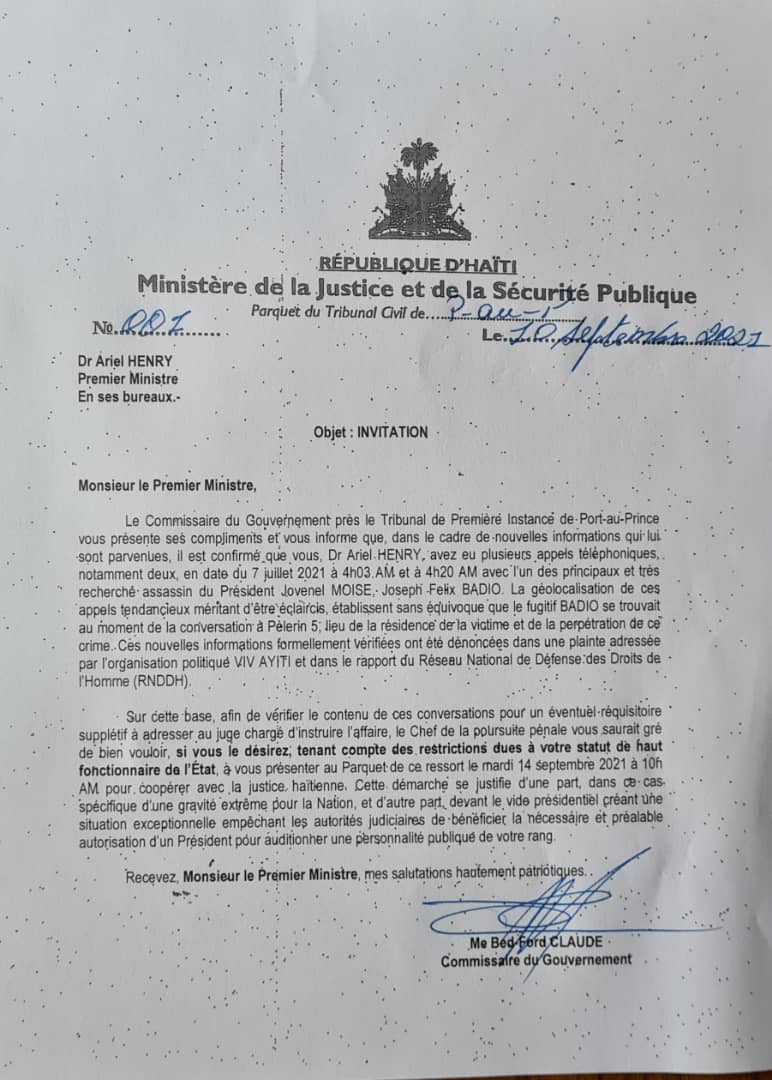
Government prosecutor Bed-Ford Claude letter to acting Prime Minister Ariel Henry requesting he present himself for questioning.
Government prosecutor Bed-Ford Claude letter to acting Prime Minister Ariel Henry requesting he present himself for questioning.
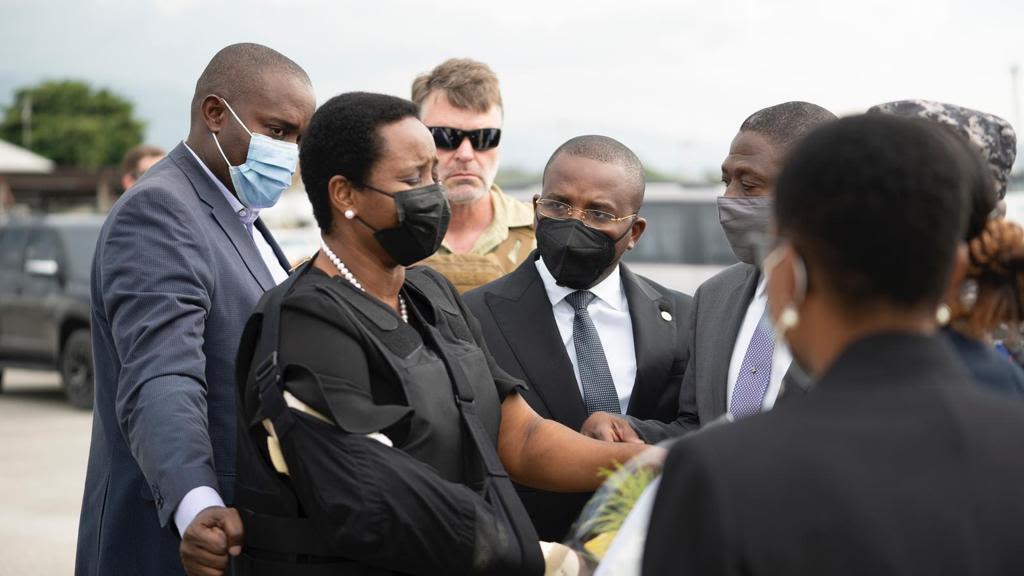
Martine Moise arrives back in Port-au-Prince ahead of her husband's funeral, accompanied by foreign security team. She is welcomed by Claude Joseph.
Martine Moise arrives back in Port-au-Prince ahead of her husband's funeral, accompanied by foreign security team. She is welcomed by Claude Joseph.
AN UNCERTAIN FUTURE
The judicial investigation in Haiti has been fraught from the start and, like in the Jean Dominique assassination 20 years earlier, few expect it to ever identify the true intellectual authors of the crime. The deeper one looks, the closer the connections between the two killings appear. There is the bigger picture: the legacy of impunity, impunity that has only engendered more of the same. But also, the more granular: the fact that one of the key suspects in the president’s assassination, Badio, had been in direct communication with a suspect in Dominique’s case, someone who seems to have impersonated a former State Department employee in order to build support for the Petit Bois plan.
Then, in late July, 2021, a well-known prosecutor on the Dominique case died in the Dominican Republic under suspicious circumstances. Claudy Gassant had once decried the government’s interference in his investigation, even fleeing the country, saying he feared for his life. More recently, he had been fired as director of the government’s anti-corruption agency, the same institution Badio was fired from early last year, after opening investigations into certain actors within the Moïse administration. The dean of the Port-au-Prince court, the man in charge of selecting a judge to hear the case, had himself been a judge on the Dominique assassination. And history appears to be repeating itself.

August 1, 2021 Miami Herald article about the death of Claudy Gassant, who was tasked with investigating the death of Jean Léopold Dominique.
The first investigative judge assigned to the presidential assassination case backed out the day after one of his clerks died in unclear circumstances. Two other judicial clerks who took part in the investigation received death threats from an anonymous number. The threats came just days after one of the clerks received a phone call from Jean Laguel Civil, one of the president’s top security officials, asking for information on the case. The clerk was later told to remove certain names from the investigative file and add in others. A CNN investigation revealed additional evidence of witness tampering, destruction of evidence, and myriad other procedural irregularities.
Meanwhile, some 40 people are currently in jail. It is unclear what, if any, access to legal representation most have been allowed. Some of the Colombians have said their testimony was obtained through torture. The police have issued arrest warrants for many more suspects, and have offered award money to anyone with information leading to their apprehension. In late August, more than six weeks after the assassination, a new investigative judge was assigned to the case. In January, 2022, after failing to move the case forward, he was also removed from the case.

Key suspects in the events surrounding the assassination of Haitian president Jovenel Moïse.
The Haitian investigation has been supported from the start by Colombian authorities, Interpol, and the FBI. Many seem to have put their hopes on the latter as the best bet for ultimately revealing the truth behind the assassination plot. Indeed, in recent weeks the US Department of Justice has brought charges against two suspects who are now in US custody. But, the fact that key players allegedly involved had worked, or maybe even still do work, as US informants raises serious questions about the bureau’s ability to shine light on the situation. And there is also the fact that Dimitri Herard, allegedly a linchpin to the entire operation, had been under US investigation since at least 2015 for ties to drug and arms trafficking. A source close to the deceased president told me, just two weeks before the assassination, that Moïse had said the United States was going to arrest Herard in the near future. If they had, would the president still be alive? Clearly, there is a chance the investigation could blow back on all of those involved in it, both in Haiti and in the United States.

Key suspects in the events surrounding the assassination of Haitian president Jovenel Moïse. (continued)
More than six months have passed since the president’s assassination. While the case in Haiti stalls, the United States has brought charges against the lone Colombian who escaped as well as Rodolphe Jaar. It is likely that many of those already implicated — Sanon, CTU Security, the Ecuadorian financier, Solage — broke US and Haitian laws, even if they are telling the truth that they had no knowledge of, or involvement in, the assassination itself. But will authorities, in either nation, push further beyond into Haiti’s political and economic elite? Personally, I doubt it. The beyond is murky and full of unknowns.
Violence and insecurity are spiraling, punctuated by the kidnapping of 16 US citizens in October. The specter of yet another foreign military intervention looms large. It is no exaggeration to say that the Haitian state’s future is hanging in the balance. And whatever exists in the beyond, it is sure to rattle Haiti’s fragile political reality to the core.
On July 14, Colombia’s largest television news program aired what it claimed was an exclusive report naming Claude Joseph as the prime suspect in Moïse’s assassination. The sourcing was unclear, and the outlet provided little in the way of concrete evidence. Authorities in Haiti denied the prime minister had any involvement in the assassination. For Joseph, however, the writing was on the wall. Within a week, donors swung their support to Dr. Ariel Henry, the man Moïse, under pressure, had appointed just two days before his assassination.
Claude Joseph initially stayed in the cabinet, moving back to his previously held position of foreign minister. But the Moïse hardliners, calling themselves “Jovenelistes,” were furious. A number of officials left the government and began openly campaigning against Henry. The conflict laid bare the long-simmering split within the broader PHTK movement, with Martelly backing Henry on one side and Lamothe helping to lead a campaign to oust Henry on the other.

Noticias Caracol headline from July 14 alleging Claude Joseph was involved in the assassination. Joseph was out as prime minister within a week, though no further details of his involvement have since emerged.
In August, I broke the news that acting prime minister Dr. Ariel Henry had received two phone calls from Joseph Felix Badio, one of the key suspects, just hours after the president’s assassination. The first call came at 4:03 a.m. and lasted three minutes. About 15 minutes later, Badio called again. This time the conversation lasted four minutes. Henry has since denied any memory of these calls, but he did tell a local radio station that he didn’t believe Badio could have been involved. While many questions remain, there is no doubt that Badio was in fact a key figure, not just in the plot that resulted in the assassination of the president but, as this investigation makes clear, in the Petit Bois case five months earlier. Henry and Badio, however, have a much deeper relationship than just those two calls.

Excerpt from Haitian police investigation noting two calls, at 4:03 AM and 4:20 AM the morning of July 7, between Joseph Felix Badio and Ariel Henry. The numbers have been replaced by names.
When Henry served as interior minister under former president Michel Martelly in 2015, he had actually tried to hire Badio as his chief of intelligence. They had been in contact in the weeks before the assassination as well. Phone records obtained as part of the Haitian police investigation revealed one call on June 24, seven on June 28, another on July 1 and yet another on July 4. “He is my good friend, I have full control of him,” Badio allegedly told Jaar when Henry was named Prime Minister. Jaar and Badio were hiding in Port-au-Prince at the time. The New York Times later reported that, months after the assassination, Badio — at large, but still in Haiti — had even visited Henry’s office.
After the phone calls were first reported, the “Jovenelistes” seized on the connection to try and oust Henry. The government’s chief prosecutor requested Henry present himself for questioning. There is no doubt that, given his history with Badio, Henry has much to answer for. But, with the case already proceeding to an investigating judge, the request from the prosecutor was of dubious legality. Henry responded by firing the prosecutor and naming a new one. He also replaced the secretary general of the council of ministers, the government’s highest decision-making authority, with Josué Pierre Louis, one of the individuals who negotiated Henry’s nomination with the president. Pierre Louis is also the brother-in-law of former senator Joseph, who is allegedly implicated in the assassination. Joseph, his wife (Pierre Louis' sister), and two children were arrested in Jamaica in mid-January.

Government prosecutor Bed-Ford Claude letter to acting Prime Minister Ariel Henry requesting he present himself for questioning.

Martine Moise arrives back in Port-au-Prince ahead of her husband's funeral, accompanied by foreign security team. She is welcomed by Claude Joseph.
Martine Moïse, who announced her desire to run for the presidency herself weeks after her husband’s death, has since filed a claim against Henry for his alleged role in the assassination. Henry has promised to respect the independence of the judge working the case, but, in November, Pierre Esperance, a leading human rights advocate, claimed that the prime minister had met personally with the judge and had reached an agreement to avoid having to testify. What’s more, he alleged that Martine Moïse and Henry had also met to discuss the case. Neither party had any interest in getting to the bottom of what had happened, he said. “We are facing a real deception instead of an investigation,” Esperance concluded.
Video released by Michel Martelly in late July.
Video released by Michel Martelly in late July.
As another February 7 approaches, the nation remains in political purgatory. More plans for transitional governments abound, and Henry, like Moïse a year ago, is facing calls to step down. Late last year, Henry named a new cabinet in another attempt to cobble together a coalition capable of governing and ending the deadlock. He has pledged to remain in office and to hold elections by late 2022. Both Martelly and Martine Moïse are expected to be candidates. Few, however, are optimistic that Henry will be able to succeed, not least because the investigation into Moïse’s assassination continues to hang over Haiti’s political class like the sword of Damocles. The one thing that could resolve it is the truth, an investigation in Haiti that goes beyond the surface and probes the political and economic elite, as well as the role of foreign governments. It is likely to be messy, but only by addressing the long legacy of impunity and international interference will Haiti finally be able to move forward.
If you appreciated this work, please consider a donation to support the Center for Economic and Policy Research.
Jake Johnston is a Senior Research Associate at the Center for Economic and Policy Research in Washington, DC. He holds a B.A. in Economics from Boston University and an M.A. in Writing from Johns Hopkins University. He is the lead author for CEPR’s Haiti: Relief and Reconstruction Watch blog and has authored papers on Haiti concerning the UN-introduced cholera epidemic, aid accountability and transparency and the US foreign aid system. His articles and op-eds have been published in outlets such as The New York Times, The Intercept, NACLA, Boston Review, VICE News, Al Jazeera America, and Le Monde Diplomatique. His book, Aid State: The Fight for Haiti and What it Reveals About the World, is forthcoming from St. Martin's press.


